MATTERS MANUFACTURING





We don’t have a hotline to the Chancellor, but if we did, this is our ask for business
We’re in a bit of an awkward position for this issue.
We go to print the week before the muchanticipated Autumn budget, and I don’t have a hot-line to the Chancellor’s o ce – or a crystal ball to predict what she’s going to announce, more’s the pity.
There has been considerable speculation in the national and financial press about what the government plans to do, and it’s not looking good for businesses.
But companies across the region have been clear for months about what they need: continuity, clarity of mission and a strategy to get there.
The CBI sent its budget recommendations to the Treasury in September. Its members want to see a positive vision and framework for longterm growth.
Reform of business rates, the planning system and increasing access to capital through pensions reform should be at the top of the Chancellor’s priority list, say CBI members.
Reforming the apprenticeship levy, accelerating the adoption of new technologies, helping companies transition to net zero and supporting that transition more widely are also key priorities.
Members of the CBI tend to be the country’s biggest businesses. Do smaller companies want the same thing?

Nicky Godding Editor
By and large yes, but most SMEs are also calling for better tax incentives to help them invest in their businesses. Until they have clarity (that word again), few will commit to investment – and who could blame them?
The government has already acknowledged that the apprenticeship levy needs to change, announcing a new growth and skills levy to replace the current version.
This will allow funding for shorter apprenticeships, giving learners and employers greater flexibility over their training than the existing system – where apprenticeships run for at least 12 months.
And with regard to investment in small businesses, it has also extended the Enterprise Investment Scheme and the Venture Capital Trust by 10 years to April 2035. It was due to run out next year.
In this issue we shine a light on manufacturing. Despite dropping down the list of global manufacturing countries, the sector remains fundamental to our economy. Our second feature is private wealth where we look at market trends and investor strategies.
Our big interviews are with Simone Hindmarch of Commercial, for whom building a £100 million business is just the start, and George Herbert of family business Hobbs House Bakery which, despite being a £7 million turnover business, rightly considers itself still an artisan bakery. We find out why.


















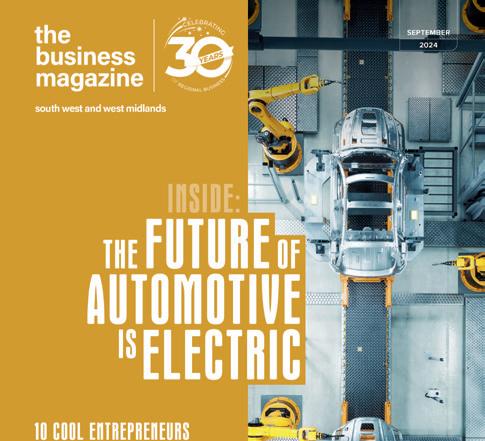





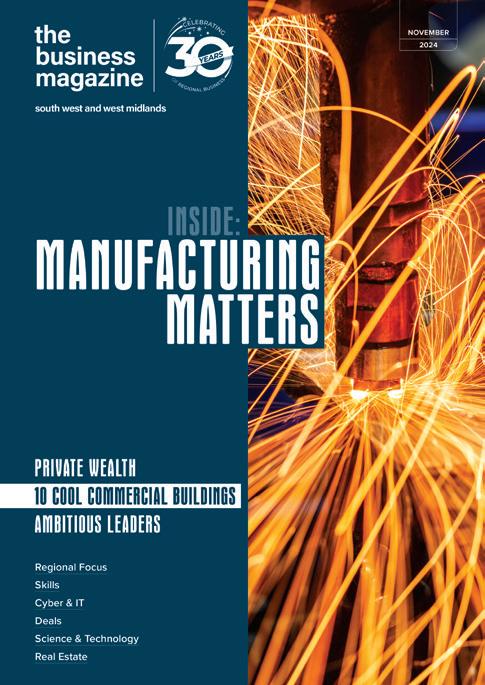

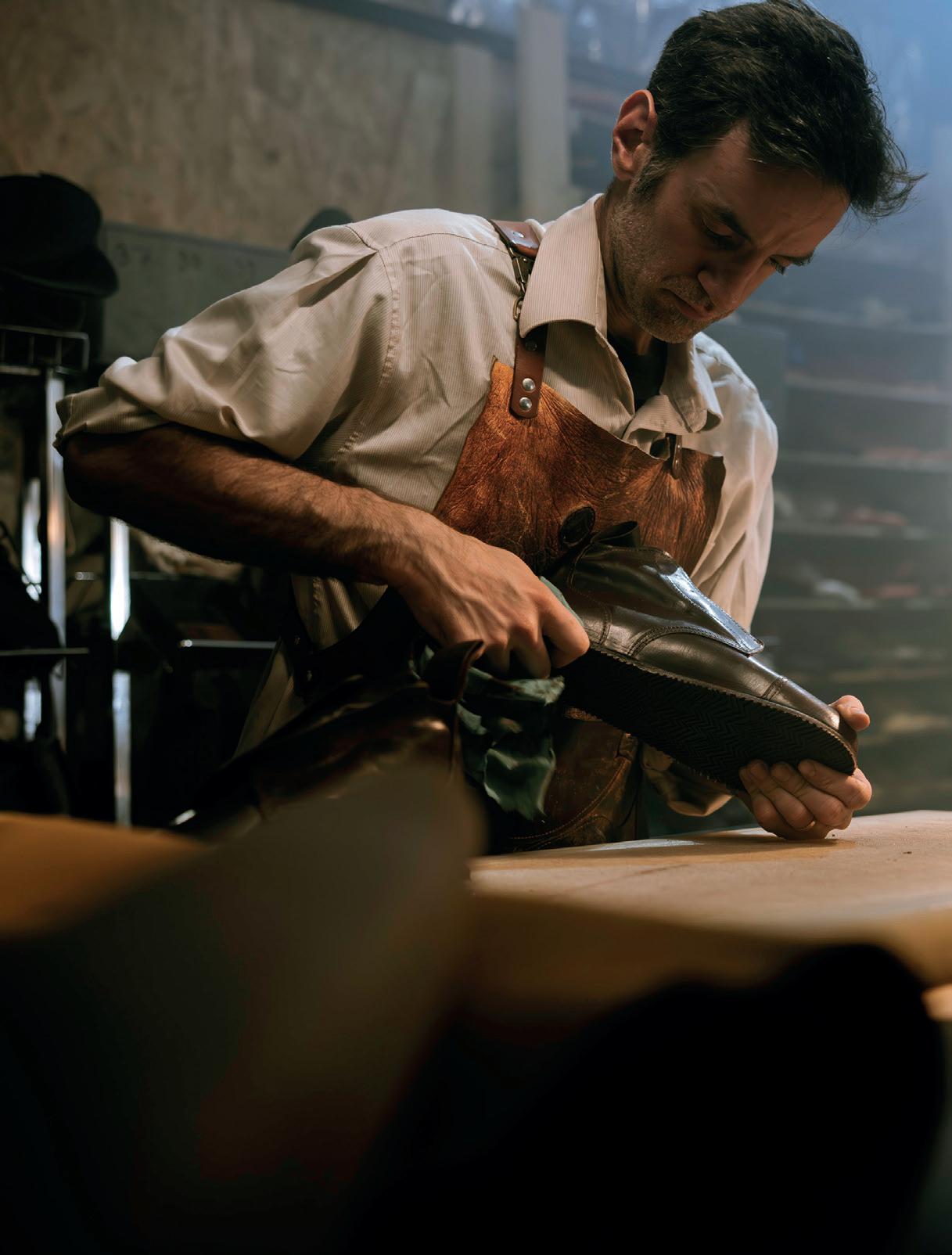













































UK manufacturing accounts for more than a third of all the country’s goods and services exports. We examine the
Commercial
just taken over the top job at Commercial, and the pandemic hit, but Simone came out
for the business

A specialist shoemaker in Herefordshire has secured a grant of more than £5,000 to boost production and sta .
This figure may not be in the same league as the millions of pounds in investments regularly reported in this magazine, but goods made by British artisans have seen a surge in popularity in recent years.
One estimate says that the craft industry contribues £3.4 billion to the UK economy, and more people are trying to build businesses in the sector after reevaulating their lives after Covid.
The most profitable craft business is handmade jewellery, but that’s not stopped Gaucho Ninja Leather building a business near Hereford which makes specialist barefoot shoes, using traditional techniques.
It says its footwear can improve posture and alleviate foot and lower limb problems.

Spanish exile Lisandro Serra Delmar has used his family tradition in leatherwork and a knowledge of martial arts to launch the business making traditional Japanese tabi boots for friends.
A Rural Enterprise Grant of £5,087 secured through Herefordshire Growth
Hub allowed Lisandro and his fellow director, wife Harriet Duke, to expand their their factory near Hereford.
There are also plans to recruit parttime sales and marketing support. The company already employs a commercial director and craft shoemaker.
Lisandro said: “We were at a stage where we needed to make the business more sustainable, and to make things more a ordable for customers.
“We opened the business to an investor, which allowed us to source some artisan factories in Spain. But to do this we needed to build a mezzanine to store extra stock and process sales more e ciently.
“The wood burner now keeps us warm and keeps the products dry. We couldn’t have done this without the help from the Growth Hub.”
The company launched in Spain and moved with Lisandro to Herefordshire when he relocated to join Harriet in 2019.
“The shoes last a long time and I like the idea that you buy a pair of shoes once and if you look after them, you can repair them...”
Lisandro said: “Ten years ago I opened an online shop on Etsy, selling these leather tabi, then people started asking “can you make a tall boot, can you make a rubber sole?” and so on. I discovered that these shoes already had a name, barefoot shoes. They are not only healthy in terms of posture and in the treatment and prevention of many issues with feet like plantar fasciitis, but they also help connecting with the ground and having an awareness of your senses.
“I am passionate about tradition. The shoes last a long time and I like the idea that you buy a pair of shoes once and if you look after them, you can repair them, resole them and start to create a story that grows with your footwear.”
The company is now working with the Herefordshire Growth Hub to apply for further funding, which would go towards specialist equipment to expand the customisation side of the business.

Oh we do like to work along the prom, prom, prom …
Cheltenham Borough Council has put its municipal o ces on the town’s iconic Promenade up for sale.
The 68,290 sq ft, Grade II* listed building is a town centre landmark. The council has occupied the building for 100 years.
Cheltenham’s famous Promenade is going through some seismic changes. Earlier this year its famous Cavendish House department store closed for good. The building is currently home to a number of pop-up stores while plans for its future are being discussed.
The historic municipal o ces, on the opposite site of the street, could be
converted into valuable commercial, o ce or residential space.
Daniel Rich, Director at Avison Young which is marketing the property, said:
“This historic building represents an unrivalled opportunity in the heart of Cheltenham.”
Cllr Rowena Hay, leader at Cheltenham Borough Council, described the sale as a magical opportunity to put the historic building back on the map.
She said: ‘’The benefits that will come with appropriate redevelopment of this much-loved, iconic building will allow our town to evolve and prosper.”
M&G Real Estate has completed its acquisition of a joint venture partner’s interest in Cribbs Mall in Bristol – one of the most successful shopping hubs in the UK.
It means the mall, now home to more than 150 shops and restaurants and employing more than 6,000 people from within a 20mile radius, is back under the ownership of its original cornerstone investors M&G Real Estate and Baylis Estates Ltd who funded its construction in 1998.
Scott Linard, portfolio director at M&G Real Estate, said: "As long-term investors in Cribbs Mall we are delighted to increase our stake in the shopping centre.
"With the increased investment taking
place across this area of Bristol, including the opening of the new Wild Place Bristol Zoo nearby and the redevelopment of Filton Airport, it is an exciting time for Cribbs Causeway, and we are looking forward to working with other key stakeholders to ensure we continue to attract visitors from across Bristol, the South West, Wales and West Midlands.
In September the mall secured lettings with three growing retailers for a combined 340 sq ft of space at the shopping centre.
Sportswear manufacturer Castore, jewellers Austen & Blake and makeup specialists KIKO Milano will occupy 573 sq ft, 967 sq ft, and 800 sq ft units respectively.


More than 11 million people chose to visit Coventry last year, marking a new record.
Coventry's visitor economy grew by more than £100 million on the previous year and increased by £261 million on prepandemic figures.
The new statistics were revealed in an economic impact report on tourism in the city, commissioned by destination management organisation, Destination Coventry, in partnership with West Midlands Growth Company.
Visitor direct expenditure with the city’s hospitality, leisure, retail and tourism businesses was up almost 14 per cent.
A total of 7,911 jobs are now supported by the expanding visitor economy in the city.
Tourism is an important part of the UK economy, contributing more than £250 billion a year.
Coventry continues to grow at a faster rate than the West Midlands Combined Authority area in the percentage of growth for visitor numbers, economic impact and total employment – with visitor numbers growing five per cent faster than the rest of the area.
Paul McMahon, Managing Director of Destination Coventry, said: “These latest figures reflect the second full year of Destination Coventry’s operations and highlight what can be achieved when businesses across the tourism sector work together to achieve positive outcomes.
Destination Coventry is a collaboration between Coventry City Council and Coventry & Warwickshire Chamber of Commerce.
Cllr Jim O’Boyle, Cabinet Member for Jobs, Regeneration and Climate Change at the city council, added: “We have seen a massive amount of change in
the city in the past few years in the city centre, refurbished heritage venues and a redeveloped railway station.”
Corin Crane, Chief Executive of Coventry & Warwickshire Chamber of Commerce, said: “Coventry is outperforming the rest of the West Midlands.”
Why is Coventry so popular? Legend has it that the city was the birthplace of St George, the dragon-slayer and patron saint of England.
The British car industry is said to have been founded in a disused Coventry cotton mill in 1896 and of course there is the incomparable, historic Coventry Cathedral. First founded as a convent in the year 700, the site has withstood King Canute, a couple of King Henrys, the English Civil War and most recently the German Luftwa e which destroyed the first cathedral in 1940. The new one was built adjacent and consecrated in 1962.
Do you feel stressed, burned out, frazzled? Is your work environment (or home o ce) uninspiring?
Fear not, Wiltshire Wildlife Trust wants to help your workplace become a haven for wildlife and a source of sta wellbeing.
Thanks to government funding until March next year, Wiltshire Wildlife has launched a project to help companies transform workplaces across the county into thriving spaces
for nature, boosting employee wellbeing and encouraging a deeper connection with the natural world.
Its Wild Workplaces project o ers practical ideas to bring nature into your work life.
They include workshops and activities, exploring the benefits of nature for mental and physical health and tips for creating wildlife-friendly gardens to implementing nature-inspired wellbeing programmes. Sign us up.


The UK manufacturing sector has been a major contributor to the success and wealth generation of the UK economy, global development and influence, for centuries, writes Richard Baker, Partner at national audit, tax, advisory and consulting firm Crowe.
As an island nation, the country’s forefathers, realised that with limited natural resources, to be a successful trading nation, and to provide sustainable income for the exchequer, the UK needed to add value by virtue of innovation, creativity, entrepreneurship and skilful hard work.
The vision and inspiration of the preVictorian enlightenment, driven by the likes of the Lunar Society, provided the building blocks for what became the ‘Industrial Revolution’ and created a string of manufacturing, agricultural and engineering successes of which examples continue and remain, throughout the globe.
British engineering and ingenuity and innovation has also played a key role in keeping the UK and the people of the world, safe, free, fed and watered and it continues to do so. In their 2024 report ‘The True Impact of UK Manufacturing’, Lloyds Bank, (working with Oxford Economics and the Manufacturing Technologies Association), identify that the sector is worth £518 billion to the UK economy (23.1% of GDP).
Despite its significance to the economy, 87% of the respondents to Crowe’s last manufacturing survey said the government support for the sector is inadequate.
Crowe teamed up with various industry figures earlier this year to answer this question and published a “Manifesto for Manufacturing” (www.crowe. com/uk/industries/manufacturing).
The manifesto is based on five pillars:
Skills and education
• Strategic review, refocus of education engagement and provision with manufacturing.
• Overhaul the apprenticeship system and its funding processes, including introduction of a tax credit-based system and introduce training incentives for UK graduates.
• Supported graduate level study fees for (STEM) subjects.
• Reintroduction of enhanced Research and Development relief at 130% uplift for SMEs.
• Training and education measures to build UK cyber resilience and secure technology supply chains.
• Better communication of support and funding streams.
The route to net-zero
• Strategic financial support for manufacturing businesses to decarbonise as part of a single national strategy and assistance scheme.
• A reshoring initiative to provide funding and support for reshoring to the UK of products and components currently produced abroad.
• Carbon Border Adjustment Mechanism (CBAM) to protect ‘homegrown’ production.
• National standardisation of net zero and carbon neutral expectations and requirements.
• Root and branch risk assessment covering supply chains and national infrastructure plans of UK steel production and technology dependent production processes.
• Public industry procurement process that favours UK suppliers as a point of preference.
• Utilisation and support of the SME supply chain.
Finance and investment
• Capital grants scheme to digitise manufacturing processes and support decarbonisation.
The Government has recently published its Industrial Strategy, “Invest 2035” which references advanced manufacturing as a key area of future growth. Fostering a pro-business environment and working in partnership are key principles. Whilst the messages are positive, time will tell what practical, real-life actions will arise from Invest 2035.
More discussion and commentary can be found in Crowe’s manifesto document which can be viewed here: www.crowe.com/uk/ industries/manufacturing.

If you would like to know more, please do get in touch with Richard Baker: richard.baker@crowe.co.uk www.crowe.co.uk

The UK could be losing its standing among the world’s top manufacturing nations. How can we get back on track?
By Daniel Face, senior reporter

UK manufacturing has been hit with a wake-up call.
The latest analysis from Make UK, the membership organisation which represents manufacturers across the UK, shows the country has fallen from eighth to 12th place among the world’s leading manufacturers, with an industry output of £217 billion.
Now ahead of the UK are Taiwan, which continues to enjoy high demand for its top-of-the-range semiconductors; Russia, with an ever-growing defence sector to maintain its war in Ukraine, and Mexico, a big climber this year thanks to a thriving automotive, aviation and aerospace ecosystem.
Could it be that manufacturing simply isn’t as crucial to the national economy as it always has been? Not according to the data.
This April, big industry names from across the country gathered in Birmingham for MACH 2024, the UK’s national exhibition

for engineering and manufacturing.
It was there that event host MTA – the Manufacturing Technologies Association – unveiled its new report, The True Impact of UK Manufacturing, in collaboration with analysts at Oxford Economics.
The paper broadens the scope o ered by Make UK, placing the real value of manufacturing to the UK economy closer to £518 billion. That works out to be around 23 per cent of GDP.
It goes on to identify that “making things” accounts for more than a third of all UK goods and services exports, directly supporting 7.3 million domestic jobs.
If manufacturing does in fact prop up almost a quarter of the national economy, this latest stumble in the world rankings should be all the more alarming.
What’s to blame? We can roll out the usual suspects of the past few years

– inflationary headwinds, supply chain issues stemming from global conflicts, the lingering impact of the pandemic on any manufacturer that wasn’t churning out vaccines.
And even many of those are now having to make a stark pivot. Just look at AstraZeneca collaborator OXB – formerly Oxford Biomedica – which, having been one of the UK’s biggest manufacturers of the Covid-19 vaccine, is settling into a new identity as a cell and gene therapy contractor.
Evidently, though, other nations have weathered those storms better than our own. It might help that the government has just launched a green paper on its proposed Industrial Strategy, which puts advanced manufacturing at the top of its eight focus areas.
The other focus areas include clean energy, the creative industries, defence, digital technologies, financial services, life sciences, and professional and business services.


“... industry is a far greater contributor to GDP and jobs than listed in national accounts”
What unique challenges has the UK faced? The big one is of course Brexit, which has burdened businesses with higher import and export tari s, delayed key investment decisions and squeezed the skilled labour market.
But most in the industry would agree that all these issues combined could have been better navigated given a confident, consistent plan from Westminster.
“Every other major economy, from Germany to China to the US, has a long-term national industrial plan,” says Stephen Phipson, head of Make UK.
“Even Barbados has one. As such, the UK is an outlier.”
Johnathan Dudley, head of manufacturing at national accountants Crowe, says: “In our latest annual manufacturing survey, which we use to gauge the temperature of the sector, our key findings reveal that 68 per cent of businesses in the sector are expecting a growth in sales this year despite global turbulence and di cult economic conditions, but 87 per cent of manufacturers are unhappy with the government support.
Much has been made of Labour’s “first mission in government” to achieve the highest sustained economic growth of all the G7 nations. And while the O ce for National Statistics suggests this has
been the case at least for the first half of 2024, it remains doubtful whether that momentum can be maintained over the coming years.
Meanwhile, here is a key industry crying out for support and investment. If that’s what the new government is able to provide, it could help turn a wishful manifesto pledge into a realistic vision.
Johnathan adds: “Manufacturing in the UK still contributes one fifth of the country’s GDP and continues to grow.
“At Crowe we recognise the importance of manufacturing to the UK in keeping our country competitive. Our manifesto, published ahead of the Summer election, provides a blueprint for the government which drives innovation, job creation and decarbonisation of the economy, securing the industry and the country’s long-term prosperity.
“UK manufacturing has a global reputation for innovation, creativity and excellence,” he continued. “We invest in supporting this and urge the new government to work with us, and the manufacturing sector as a whole, to produce their promised strategy.”
Heading into the July election, Labour put forward a four-pronged industrial strategy.
They committed to deliver clean power by 2030, ‘care for the future’ (opportunities here for health and care manufacturers), harness data for public good (think artificial


intelligence and data-driven supply chain management) and build a resilient economy.
Four months on, while it has introduced its industrial strategy green paper, there have been no big spending promises directed squarely at manufacturing (unless the chancellor pulls something out of the bag in the budget, which happens after this magazine goes to print).
We’ve seen nothing so far to match, for example, the scale of the Inflation Reduction Act in the US – a move which has seen billions of dollars invested in clean energy manufacturers.
Across the manufacturing industry, from large companies to small and mediumsized enterprises, there are calls for the government to make its vision clear.
Only then will they begin to commit to making the investments they need to grow.
Now comes a make-or-break moment. The worst the new government can do at this moment is nothing, leaving the industry underfunded, under-skilled and without direction.


A government with a potential new strategy – whose is it to execute?
As things stand, the job falls to the minister for industry, a role encompassing the departments for both business and trade and for energy security and net zero.
Manufacturing is therefore just one of many concerns for the new incumbent Sarah Jones, whose responsibilities also span retail, hospitality and professional services, to name a few.
The industry has already made clear it feels neglected under the current arrangement. The latest Manufacturing Outlook Report from Crowe found that nine in 10 manufacturers were unhappy with the current level of government support.
For them, a strategy alone won’t su ce. They need someone fighting their corner to see it through to fruition.
Johnathan Dudley says: “It’s high time that a dedicated minister for manufacturing was established to unlock the sector’s potential.
“We want them to understand what we are hearing from our regular engagement with the manufacturing sector through our surveys and roundtable events which give us the insight to lobby government on the sector’s behalf. They can light the fuse of a new industrial revolution in

the UK by aligning innovation, economic development and education, and support nearly a million green jobs to help get this country making, building and adding value again.”
Growth ambitions will be driven over the coming years by major carbon capture projects and new battery gigafactories, spearheaded no doubt by some of the biggest global players in the industry –think Tata and Japan’s AESC Group.
But a dedicated minister wouldn’t just push flashy initiatives. They’d also be a key voice for the UK’s 260,000-plus small and medium-sized domestic manufacturers.
“We need a hero within the corridors of power,” adds Andrea Wilson, an SME director and longtime advocate for a ‘manufacturing champion’.
“Government policy is most often informed by original equipment manufacturers (OEMs), large businesses or career civil servants.
“As a result, we see decisions made, policies implemented, and support o ered – the majority of which are not fit for purpose for the SME community.
“Listening to SME business prior to deciding what will help them will save this and future governments billions in wasted, over-administered and underutilised support.”
After a disappointing performance last year, the latest data suggests the industry could finally be turning a corner.
The S&P Global UK Manufacturing PMI (purchasing managers’ index) hit a 26-month high this August at 52.5.
This comes even as export orders fall for the 31st consecutive month, which has been put down to weaker demand from Europe and a slowdown in mainland China.
Rather, the domestic market has been leading the charge, as output, new orders and employment all picked up.
Large-scale producers have been particularly busy hiring, while small firms saw a mild increase in jobs and medium-sized companies made cuts.
“The upturn is broad-based across manufacturing,” said Rob Dobson of S&P Global Market Intelligence, “with the investment goods sector the standout performer.”

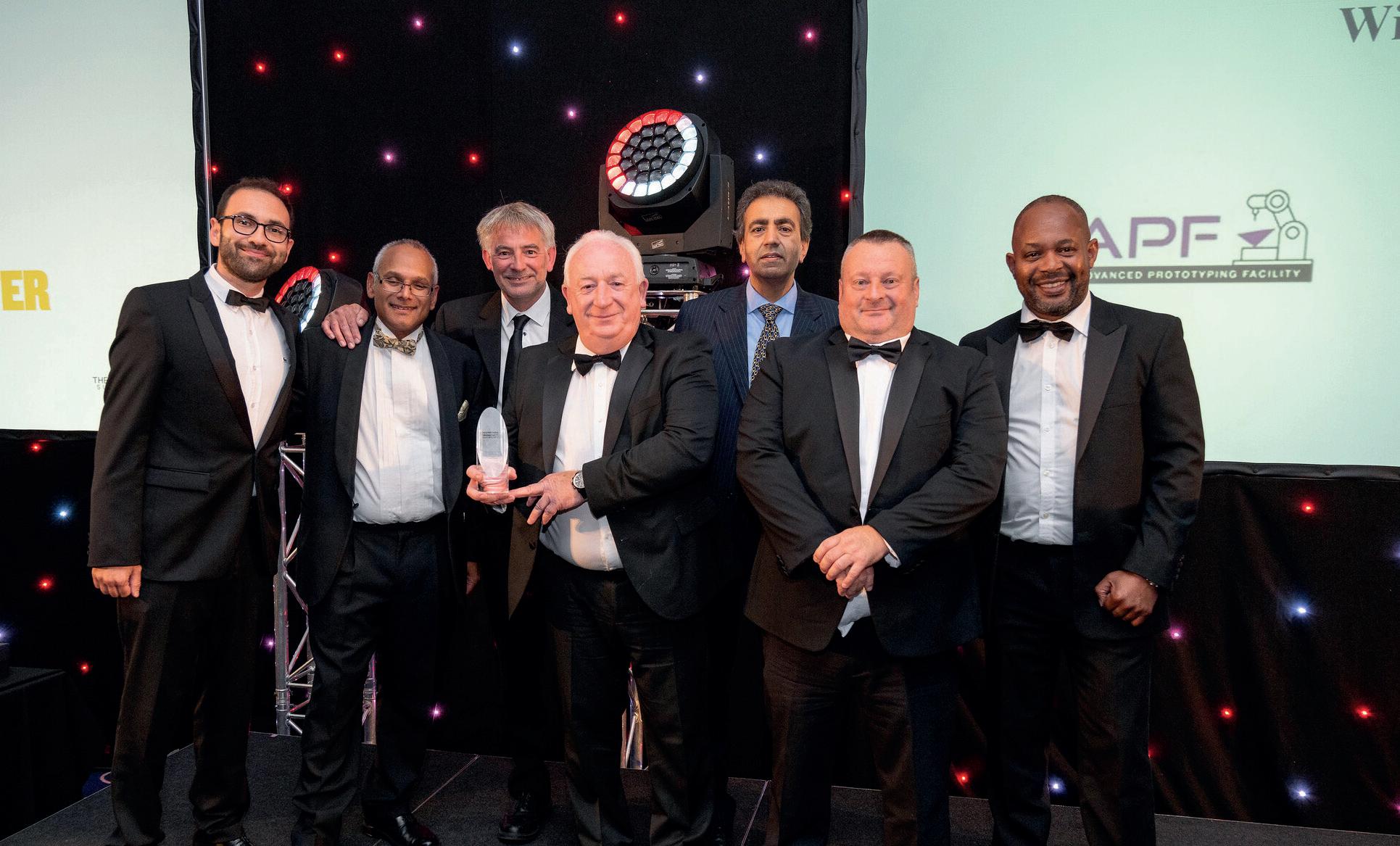
More than £2.2 million in grants has been awarded by Made Smarter West Midlands over the past three years to help the region’s manufacturing and engineering businesses adopt digital technologies.
Born out of an industry-led review in 2017, Made Smarter has grown into a national programme aiming to ensure that domestic manufacturers keep up with the latest innovations in the industry and build a workforce fit for the future.
It champions decentralisation, real-time analytics and virtualisation, whereby businesses produce virtual replicas of physical processes and models to better understand potential production blockages and reduce machine downtime.
The Conservatives had committed to expanding the Made Smarter adoption programme to all nine regions of England in 2025-26, before expanding to the other home nations the following year.
firms
Now the new government is being urged to carry forward that pledge – and what better template to replicate across the country than that of the West Midlands, led by local growth hubs in Coventry and Warwickshire, Birmingham and Worcestershire.
From its inception in June 2021 up to April 2024, a total of 635 businesses in the region had registered with the programme, generating an estimated £158 million gross value added (GVA).
Participants are given access to advice, leadership and skills training, as well as grant funding for digital internships and technology projects.
Craig Humphrey of Coventry and Warwickshire Growth Hub has hailed the programme a “runaway success”, while Onur Eren at WMG (the University of Warwick’s manufacturing group) says it sets “a new benchmark for digital excellence to continue in our region”.
Small and medium-sized manufacturers are being called upon to deliver support and spares for non-combat equipment aboard UK warships and submarines.
Coming as part of the Ministry of Defence’s Marine Systems Transformation (MAST) programme, the new seven-year framework will be worth up to £850 million.
It was announced by the minister for defence procurement, Maria Eagle, on a recent visit to Somers Forge – a West Midlands manufacturer of bespoke naval parts and one of several in the region able to bid for work under the framework.
“We’ve been a defence supplier since 1912 and are incredibly proud of our heritage supporting the Royal Navy,” said Samson Folkes, managing director.
“For Somers Forge, winning contracts through MAST can help us sustain vital jobs and apprenticeships in the Midlands, as well as underpin our growth ambitions.”
Warwickshire firms have been invited to share in a £500,000 business support initiative to help them boost sales, create jobs and improve productivity.
The Warwickshire Manufacturing Growth Programme, delivered by Oxford Innovation Advice, has already helped more than 80 local companies with coaching, consultancy, free workshops and signposting to other schemes.
Those on the programme start out by discussing their growth ambitions and challenges before gaining access to GROWTHmapper, a suite of diagnostic tools to identify opportunities for expansion.
It’s available until March 2025 for manufacturers across North Warwickshire, Nuneaton, Bedworth, Rugby, Stratford-upon-Avon and Warwick.

A major source of support for manufacturing over the years has been the Catapult Network, comprising nine centres across the UK – including three in the South West and West Midlands.
The Catapult Network was set up by Innovate UK in 2011, to provide a unique combination of cutting-edge research and development facilities and world-class
Founded in 2010 by the universities of Birmingham, Nottingham and Loughborough, The Manufacturing Technology Centre (MTC) operates three sites around the UK, with a base in Coventry. It employs almost 1,000 sta –mainly engineers and scientists – helping manufacturers develop new products and implement novel tools and technologies into existing processes.
This summer, MTC launched its new sustainable materials hub, complete with polymer and ceramic additive manufacturing (AM) machines to manufacture net zero products.
The hub also has material reprocessing equipment to recycle waste materials and parts into feedstock.
Older than the South West’s other centres, WMG (Warwick Manufacturing Group) was founded in 1980 as an academic department of the University of Warwick, o ering a part-time master’s degree for industry sta .
It now supports undergraduate engineers, teaching automotive, manufacturing and mechanical engineering.
technical expertise to support UK business innovation.
The Manufacturing Technology Centre in Coventry, National Composites Centre in Bristol and WMG (Warwick Manufacturing Group, part of the University of Warwick) are all part of the network.
Established by the government-funded agency Innovate UK, each operates as


More recently, the centre was granted £1.85 million by the Department for Science, Innovation and Technology to build a hazardous operations cell with capability to build and dismantle prototype battery modules and packs.
As part of the Catapult Network, WMG also lends its expertise in battery development, electrification, material sustainability and digital twinning to the region’s manufacturers.
In the past, the centre has helped Coventry’s Expert Technologies Group automate development of mechanical fixture plans and worked with Alpha Anodising to cut energy costs and implement sustainable solutions into its processes.
a private, not-for-profit business aiming to bridge the gap between research and commercialisation.
Catapult centres work with manufacturers of all sizes – from start-ups and entrepreneurs to multinational corporations – providing business growth, technology and supply chain development services.
They also o er apprenticeships and continuous professional development courses to help keep the local workforce up to date with the industry’s latest innovations.
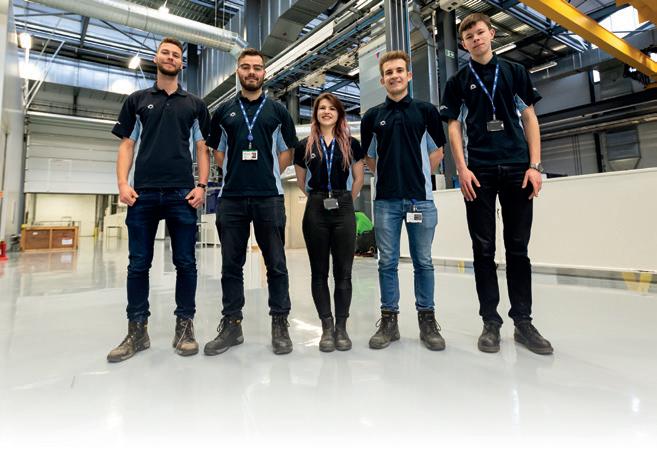


The National Composites Centre (NCC) opened in 2011, backed by the research excellence of the University of Bristol and close to many of its five founding members – Airbus, AgustaWestland, GKN Aerospace, Rolls-Royce and Vestas.
It sprung up o the back of a government strategy to grow the nation’s share of the growing global market for composites – materials like reinforced concrete and plywood which comprise two or more constituent materials.
Nowadays, the centre works closely with the South West’s aerospace, defence, space, energy, transport and construction sectors, helping industry partners develop higher performing, longer lasting products with less waste.
It has recently picked up funding from the Department for Science, Innovation and Technology to set up the UK’s first research lines for carbon fibre production.

One firm helping to forge the next generation of manufacturing talent is Renishaw, the Gloucestershire-based global manufacturer and supplier to the aerospace, automotive, energy and healthcare sectors.
Among the courses o ered by Renishaw is the Level 3 Engineering Technician Apprenticeship, on which learners take part in a series of six-month placements –rotating between production, maintenance and the machine shop.
Ruqayyah Girach and Ed Baker are both currently in their third year on the course, having hopped between the firm’s various departments.
“Because Renishaw is so big, we’ve had a taste of a small part of it,” said Ruqayyah. “We get the opportunity to see what we like and enjoy.
“One of the first things my manager said is that he doesn’t micromanage, and I like having that independence to be able to go o and do jobs in my own time.”
Ed agreed: “We’re treated as proper fulltime employees.
“We’ve been able to learn from one placement and carry it forward to the next, which has been really valuable.”
Ed isn’t the first in his family to have trained under Renishaw. His older brother also apprenticed with the firm, and both of his brothers now hold engineering degrees –an option he’s weighing up in the long term.
“I took engineering at secondary school. Then I went to Hartpury College and did sport and exercise science.
“I got into multiple universities to do physio, and I was umming and ahing about it.”


On the other hand, an apprenticeship would help fund his other passion, sailing. This past year has taken Ed to Mallorca for the Under 21 European Championships –something he’s been able to successfully juggle with his course.
For Ruqayyah, apprenticing was always the way forward.
“After my A levels, I didn’t really want to sit in a classroom for hours on end. I like it here because you’re always on your feet.
“I hobby hop a lot, so I can go from embroidering to painting to all sorts of things. I like to always be learning about di erent things.”
That’s what she enjoys about Renishaw – the diversity o ered by its various placements. “I knew I’d have the opportunity to change if I wanted to.”
For everything they’ve both got out of the course, they’ve also given a lot back, and their lecturers have taken note.
The duo swept last year’s Gloucestershire Engineering Training Awards, between them picking up seven of the eight available accolades in a cohort of around 120.
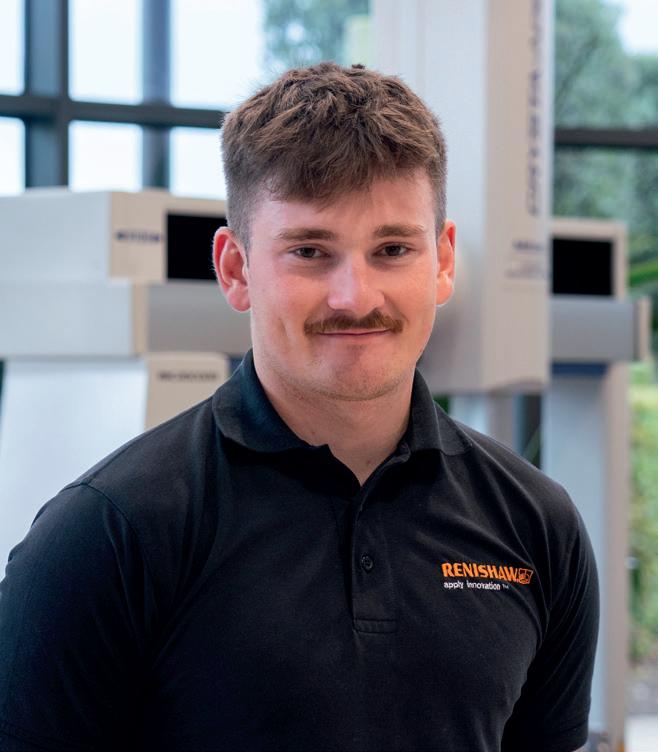

Ruqayyah was named apprentices’ apprentice of the year, best dual skilled apprentice and best overall fitter, and was commended for her overall contribution to the centre.
“I put in a lot of e ort in the first year,” she said, “to prove not just to my college but to the company as well that I’m a hard worker.
“It was nice to be recognised because I wasn’t that great in school. My parents were really happy, I was really happy and Renishaw was really happy.”
Ed took home awards for best electrical apprentice and best overall turner.
“I didn’t notice how much e ort I was putting in. It just felt natural.
“After eight rotations of apprentices, I thought the lecturers would have forgotten about me. But I think out of enjoyment, I actually produced some pretty good work.”
Looking ahead to the future, Ed’s keen at some point to follow in his brothers’ footsteps and pick up a degree.
Ruqayyah knows she wants to further her education, but she’s taking the time to enjoy her current placement – which she’s looking to extend for another six months.

Expert Technologies Group in Coventry has won a multi-million-pound contract in Europe following a €1.4 million financing deal.
A supplier to major UK-based original equpment manufacturers, the group designs and delivers robotic assembly systems, tools and special machinery which support automation in industry.
It’s now begun a new project with the Spanish arm of Sumitomo Electric Bordnetze (SEBN), a global parts supplier for the automotive industry.
This latest deal will see Expert Technologies deliver two new automated auxiliary harness assembly lines for electric vehicles.
The business has also secured €1.4 million in working capital from NatWest thanks to help from the government’s UK Export Finance, which it will use to create up to 10 new jobs.
Angelo Luciano, CEO of Expert Technologies, said: “The support we received from UK Export Finance has allowed us to successfully be awarded the project with SEBN, who are a new customer to us.
“We look forward to developing the relationship further.
“This is the first project we’ve been awarded in Spain since both Brexit and Covid, and we hope that it’s a catalyst for further projects in mainland Europe.”
Warwick’s Astheimer Design showcased its latest innovation – an electric quadricycle for last-mile urban deliveries, at Cenex Expo this September.
Built as part of a joint venture with Prodrive in Oxfordshire, EVOLV is just 3.2 metres long and 1.4 metres wide,
but o ers a load capacity of 4m3 to rival mid-size vans.
“Everything about the design is fit for purpose,” said Carsten Astheimer, founder and creative director of Astheimer Design.
“It’s lightweight, robust and simple, which fits harmoniously with our philosophy of removing everything superfluous.
“The result is iconic in its simplicity, with the platform adaptable to the individual needs of each customer.”
For more about these so-called ‘tuktuks of the Western world’, see our front-cover feature on The Future of Automotive in the September issue of The Business Magazine.

Growth has remained anaemic for manufacturers in the South West so far this year – but business leaders are generally optimistic for the future.
These are the findings of the latest Manufacturing Outlook from Make UK and BDO.
Almost six in 10 companies surveyed believe the recent change in government will produce better economic growth overall for the coming year. In contrast, just six per cent expect GDP to decline.
The good news is that balance on output in the South West is forecast to jump from +7 to +14 per cent in the next quarter, which compares favourably to the more muted national picture.
Total orders are also expected to rise from +0 per cent to +29 per cent. The overall story, though, is a mixed bag.
“This quarter presents a tale of two halves for the South West,” said Keri Anne Mruk, region director at Make UK, “with recruitment intentions and investment taking a dip.
“Business confidence continues to climb, however.
“Now is the time for government to pick up the pace and deliver on pre-election promises, most notably the publication of a long-term robust industrial strategy.”
Matthew Sewell, BDO’s head of manufacturing for the South West, echoed this sentiment.
“Manufacturers are hopeful that a period of greater political stability will provide a better economic outlook ahead,” he added, “and that in turn is boosting business confidence.
“Time will tell if that confidence can translate to output and orders, or indeed recruitment intentions, where the South West relies heavily on skilled workers taking up manufacturing positions.”

Plant-Ex Ingredients, a family-owned manufacturer of natural food colours, flavours and extracts, has secured a £9 million minority investment from BGF.
Founded in 2010 by Giles Drewett, the Bristol business supplies food manufacturers around the world via a network of distribution partners.
It recently moved to a new factory in Bristol, doubling its footprint, and now

hopes to make further inroads in the US market after launching an LLC in Chicago earlier this year.
BGF investor James Skade said: “The rate at which Giles and the team have been able to grow Plant-Ex in a relatively short space of time is testament to their passion and hard work.
“We look forward helping them fulfil their objectives.”
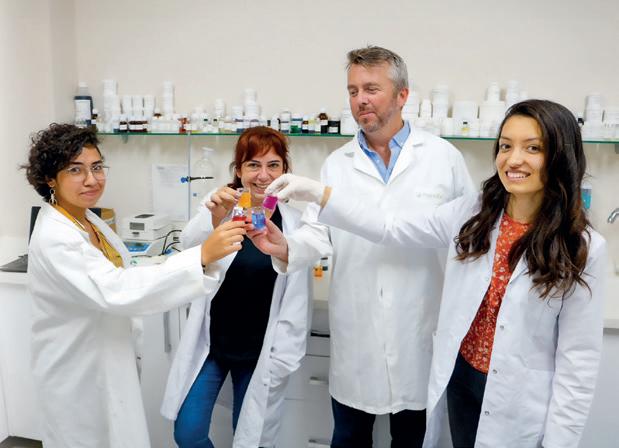

Plant-Ex has also brought aboard non-executive chair Susan Barratt, whose career has included roles at the Institute of Grocery Distribution and Department of Health and Social Care.

As work continues on two nuclear reactors at Hinkley Point C power station in Somerset, one local firm has been busy building stainless steel components for the facility.
Established in May 2021, Framatome’s centre of excellence in Avonmouth near Bristol produces parts for nuclear steam supply systems, which use the heat released by nuclear fission to generate steam and ultimately drive the turbine generators.
It’s home to a four-metre, 400-ton
hydraulic synchronised press brake – one of the largest in the UK – which is used to fold critical components.


The centre also has the capability to implement multiple methods of manufacturing and assembly, including full modular solutions and pipe manufacture.
With specialised equipment comes a skilled workforce competent in tungsten inert gas), metal active gas and stud welding.
The highly specialised components built by the team include pools, tanks and liners for use in evolutionary power reactors, a relatively newer model first deployed in China in 2018.
The latest set has now been delivered on site at Hinkley Point.
Framatome also signed a series of multibillion-pound contracts earlier this year to deliver a replica of the Hinkley Point C reactors at Sizewell C in Su olk.
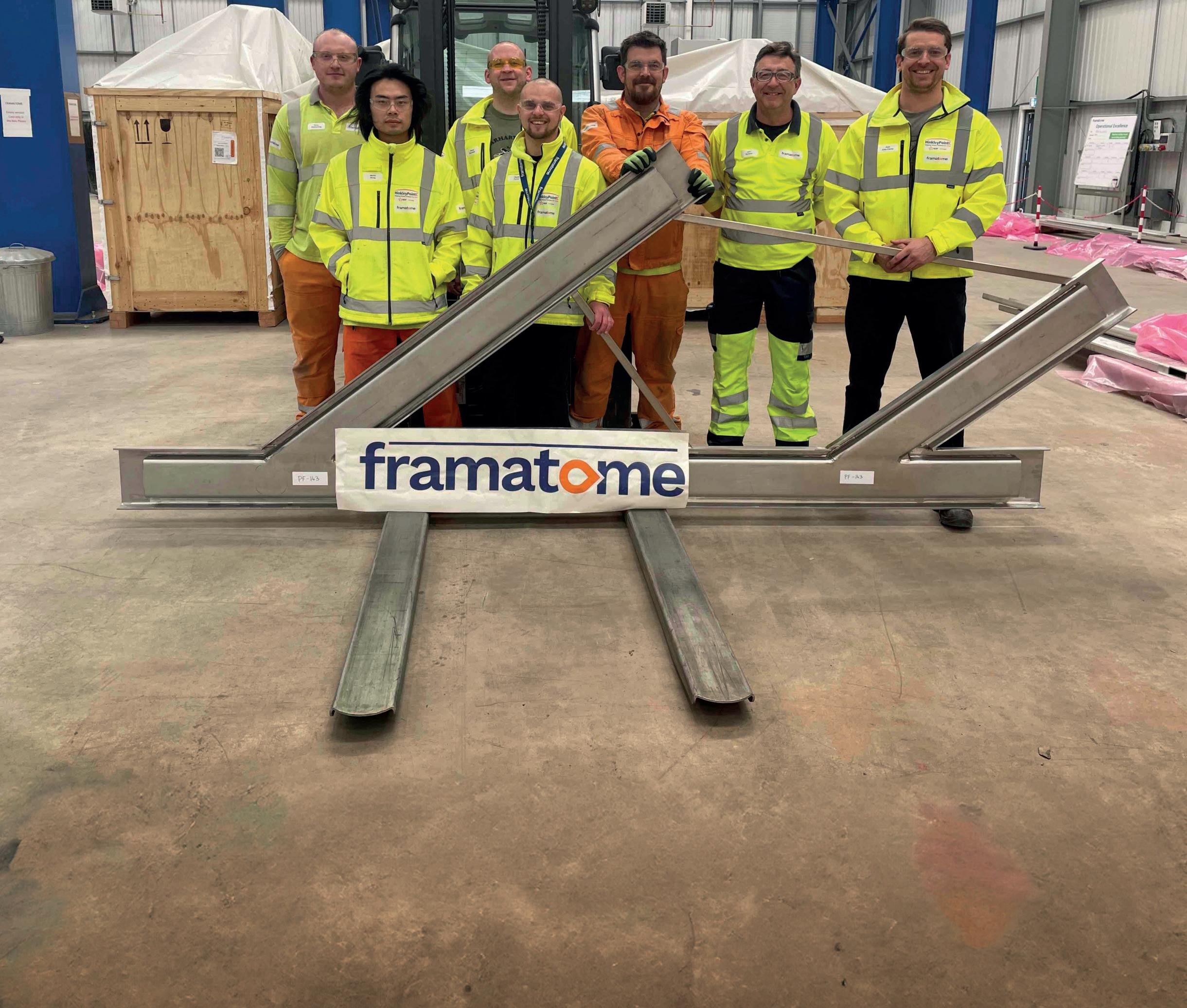





Sustainability is front and centre for most manufacturing businesses today – and none more so than one of Gloucestershire’s largest exporters.
Prima Dental Group, designer and engineer of precision dental instruments and products for the growing healthcare and cosmetic markets around the world, is committed to securing a brighter future for people and the planet.
And it’s this forward-looking focus that is supporting the company’s success. Not only has it grown to become the world’s largest dental bur (drill) manufacturer, this year also saw the business crowned with an esteemed King’s Award for Enterprise for International Trade.
Sustainability isn’t new to Prima, with significant impacts on improving its performance already under its belt.
By adopting a circular economy principle the business has reduced its landfill disposal from 70% to zero. This, along with other measures to reduce waste and improve resource e ciency, has been evidenced through the company’s ISO 14001 accreditation – the global standard for environmental management.
This sits in tandem with the company’s energy e ciency policy, which focusses on optimising production processes and using renewable energy resources where possible. This work has been certified with the organisation’s ISO 50001, with a robust framework in place to ensure continual improvement in this area.

The pursuit of better – Prima’s mission –drives all that it does and encapsulates how innovation drives its progress and that covers sustainability too.
The company integrates sustainability into every aspect of its operations, from energy-e cient production facilities to meticulous recycling initiatives. A team of dedicated Energy Champions continuously monitor and evaluate the organisation’s performance, driving ongoing improvements and setting new benchmarks for sustainable excellence.
The business only uses green energy, causing no harm to the natural environment. At the company’s main production facilities and head o ces
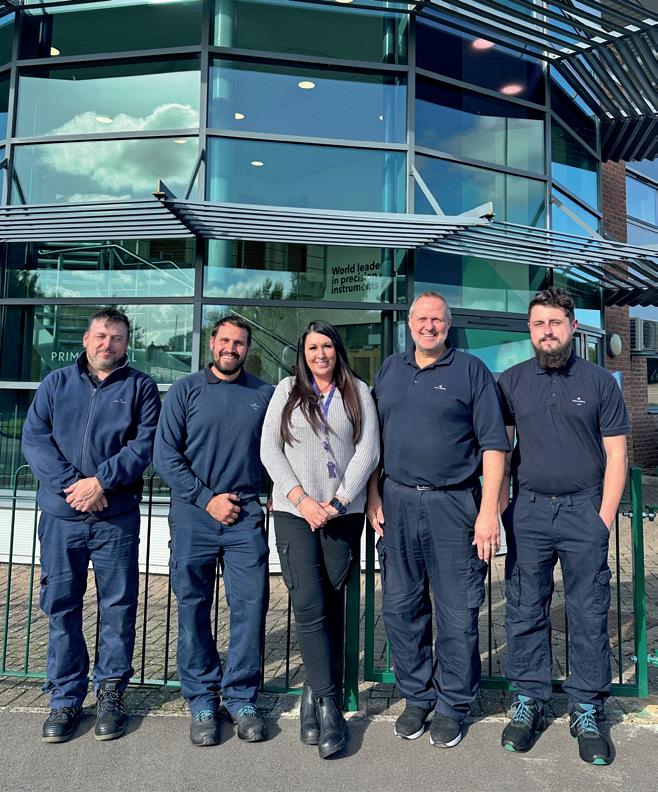

on the Waterwells Business Park in Quedgeley solar panels have been installed. Just one example of the company’s dedication to renewable energy solutions, this saves 90 tonnes of carbon dioxide emissions (CO2e) per year, while some 2,270 tonnes of emissions will be saved over the lifespan of the panels. That’s the equivalent to 5.7 million miles in an average petrol car.
Intelligent lighting, along with maximum insulation, air source heat pumps and e ciency improvements in the compressed air system o er sustainable energy solutions for the three sites. These initiatives have resulted in substantial annual carbon dioxide savings in excess of 100 tonnes, which equates to 4,760 trees planted per year.
The company’s environmental policy sets out a series of practices which include detailed recycling and waste management initiatives. These cover the recycling of byproducts from its manufacturing process, the exclusive use of recycled paper for packaging and marketing collateral, and, where possible, using recyclable end-user packaging.
In terms of supply chain emissions, a continual review of waste management services and suppliers is in place – and it’s this assessment that has helped ensure Prima’s landfill disposal is zero.


When it comes to its consumption of natural resources, the business is championing its employees to be more responsible in this area, evidenced through its employeedriven programme ‘Health, Safety, Environment and Sustainability Champions’ across all departments.
As a firm, the elimination of disposable plastics cups (330,000 cups per year) and addition of waterless urinals (saving 1.5 million litres of water) have contributed to a total saving of 11.5 tonnes of CO2e each year.
Prima exports to more than 90 countries, with two joint ventures (in Brazil and Hong Kong) and two subsidiaries (in China and India). By prioritising local suppliers and reducing global travel, the company further mitigates its environmental impact while fostering strong community relationships. And, when it comes to sourcing suppliers, the business retains local services, where possible.
Meanwhile, the introduction of localised sales teams, adjusting UK working hours to accommodate di erent time-zones, alongside an increased use of technology for virtual meetings, has significantly reduced global travel.
With new initiatives and increased productivity through its innovative strategies comes increase in demand. Over the past ten years Prima has grown by 236%, enabling the company to further invest in its people, increasing headcount by 62 in 2023.
As one of the largest private-sector employers in Gloucester, supporting and nurturing talent is key. Strong links with



THESE INITIATIVES HAVE RESULTED IN SUBSTANTIAL ANNUAL CARBON DIOXIDE SAVINGS IN EXCESS OF 100 TONNES, WHICH EQUATES TO 4,760 TREES PLANTED PER YEAR.
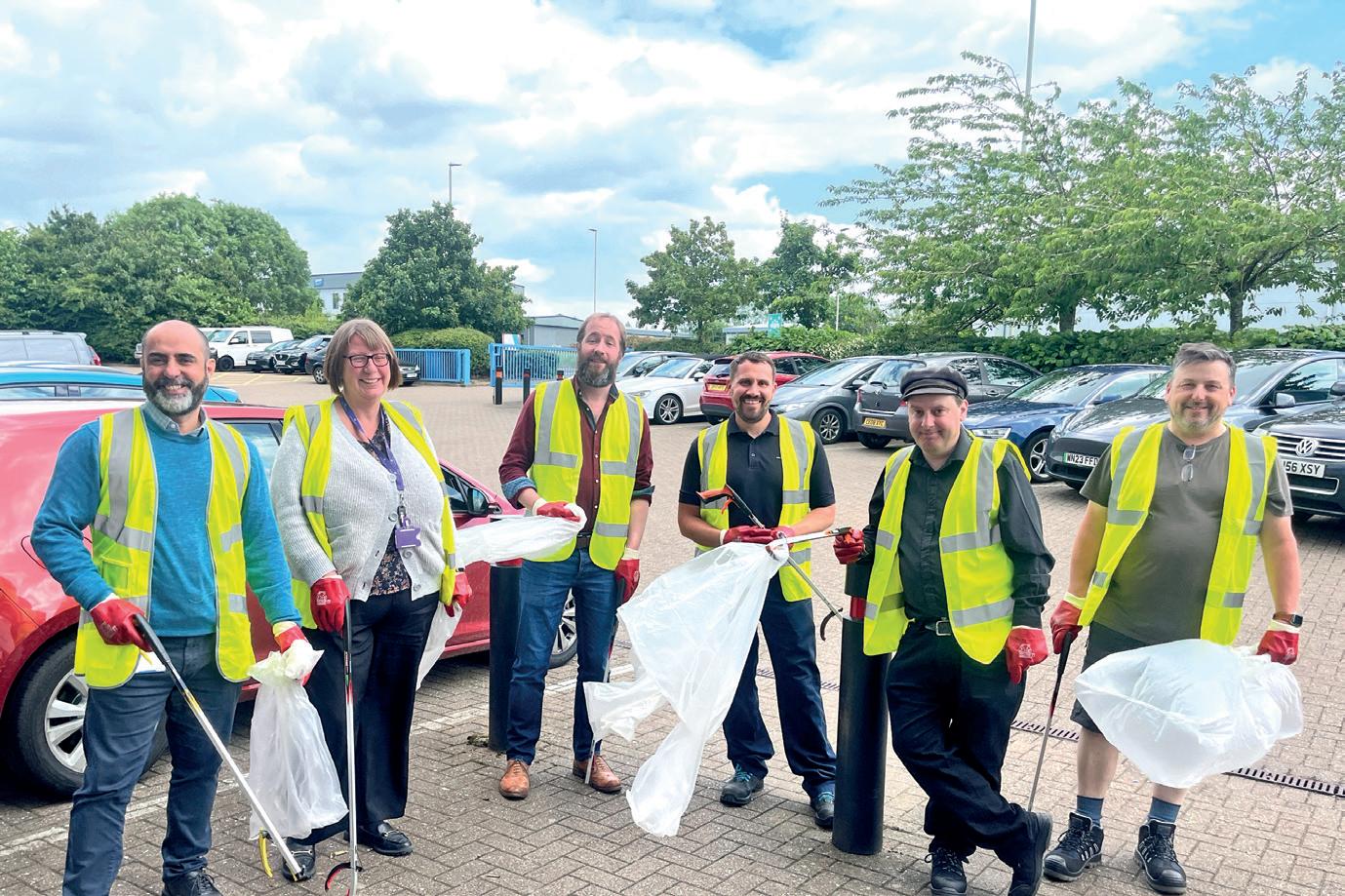
universities sees the business o ering sponsorship for PhD students, summer internships, work experience, shadowing and research project opportunities.
The company’s charity committee oversees a programme of fundraising –which the company matches - for local causes. Volunteering forms part of this, with colleagues given time o from work to support local initiatives, such as litter picking. Local sponsorships also o er a way for the business to give back, including working with primary schools.
In terms of Prima’s impact on wider global society, its work supports accessibility and a ordability in developing markets –ultimately ensuring better dental care for patients.
As the company looks ahead, it remains committed to environmental responsibility and industry leadership, aligning with its vision to become the most admired and respected dental and medical rotary business in the world.
Plans include continued strategic business expansion, following £7m investment in new equipment in 2023 which delivered increased e ciency and supported growth.
The focus for export is to drive local manufacturing. Tailored for their respective markets, Prima is set to deliver 75% local production in India and 93% local production in Brazil. These significant changes will minimise its carbon footprint by reducing shipping and travel – an initiative which not only underscores the company’s dedication to the planet, but also sets a precedent for responsible manufacturing practices.
The company’s ESG (Environmental, Social and Governance) initiatives will remain central, with investments in environmental awareness, training and measures to decrease waste. The company estimates significant savings, projecting a reduction in excess of 100 tonnes of CO2 emissions per year, showcasing its contributions to the environment as it strives towards becoming an industry leader in sustainability.

Can selling office supplies and services change the world? Simone Hindmarsh says so, and her actions prove her point
By Nicky Godding, Editor
The year 2020 wasn’t exactly the one Simone Hindmarch was expecting. She’d not long taken over as Managing Director at Commercial in Cheltenham and was planning to take the business to a £100 million turnover.
Then the Covid pandemic closed o ces across the UK. The result? The £60 million turnover company saw its annual income drop to a fraction of that overnight.
Because although it does a lot else, a large proportion of Commercial’s income since it was set up in 1991 has been from selling o ce goods and services, from IT systems to o ce and print supplies, and when everyone is ordered to work from home –well, you can see the problem.
She and her brother Arthur Hindmarch, Commercial’s Chairman, could easily have thrown in the towel. Many others did, and few blamed such a response to a once-in-ageneration crisis.
While Simone might look tall and willowy on the outside, inside there’s a fierce moral compass and steel backbone, buoyed by a personal angle to the story too, as she explains.
“When Covid hit, I was 52 and Arthur was 54. I’d just got divorced and sold my house.”
She also didn’t want a repeat of what had happened to her father. “Our dad had lost everything when he was 53 and I didn’t want that to happen in our generation. We’d poured everything into building the company over the last 30 years and before the pandemic we were hitting all our targets.”
Fast forward almost five years, and Commercial is on track to turn over more than £100 million this year.
How has the company done it?
“To me, Commercial has always been a living, breathing entity. It sustains a lot of people and their families, and we were all in it together,” says Simone.
But back when Covid closed Britain’s o ces, the company’s income wasn’t going to bounce back quickly. The furlough scheme hadn’t yet been announced and the company’s salary bill was more than a million a month, so the first call was to the bank.
Simone’s next priority was a plan. “O ces might have been closed, but we’d just won the Iceland supermarket account, so we began to get a feel for what was needed, and that was PPE and sanitisers – all those sorts of things. I shu ed sta around and put people in the roles where they would be most e ective.”
Simone moved senior sales executives into buying roles because at that time the hardest job was finding the products, not selling them. Then Commercial began helping its customers set employees up at home.
“We’d been a technology-led business for years, but before Covid we didn’t prioritise supporting hybrid working. Now we do, and that’s not likely to change.”
“Then our customers asked us to help them encourage people back into the o ce and make them feel safe there.”
While Commercial was pivoting to meet a whole new raft of customer requirements, we all saw something else happening: the planet was enjoying a respite.
For months the number of international flights were down to single figures, and for many of us nature became a priority, as pretty much every other social and leisure activity was closed.
And that went to the core of Simone’s ethos. Since 2006, Commercial Group has been loudly advocating a reduction in greenhouse gases and promoting sustainability.
Simone’s epiphany came after Sky invited her to an event at the Tate London where the global media company was launching its sustainability strategy. Al Gore, the man behind the now famous documentary An Inconvenient Truth was speaking in person.
After listening to him talk with such passion, she wanted to act.
“It changed my thinking, and as a result, has completely changed the way our has company operated over the last 18 or so years.”
While it was survival more than sustainability which drove Commercial and its customers between 2020–2022, Simone knew that combatting climate change would soon be high up on the global agenda again
I am driven by being successful, but I’ve never made decisions based on the money I might earn. It’s just not in my nature

Simone Hindmarch, Managing Director
and the company continued to operate as sustainably as possible.
Commercial began o ering a raft of new products. These include installing solar panels and voltage optimisation to reduce energy usage. Commercial also installs digital screens into retail outlets. These are more e cient than traditional posters and signage, and increase turnover too says Simone – a double benefit.
“Bringing an online experience into the store can achieve a much smaller energy footprint, but a better experience for customers,” Simone explains.
“We're also supporting organisations through our ESG (environmental, social and governance) consulting, helping them do anything from setting their plan and measuring their footprint to achieving a route to carbon net zero.”
Commercial now operates hybrid working but Simone makes sure that all sta come together every week, whether they’re in the o ce or working from home.
“Life for me is about growth and knowledge.,” she says. “During Covid we launched a learning day where everyone comes on a call to discuss new products and services, and we’ve kept that going. We can talk about anything – what one small team is doing, or Commercial’s work around Scope 3 on climate change.”




The classifications known as Scope 1, 2 and 3 were developed in 2011 by the World Resources Institute and the World Business Council for Sustainable Development. Scope 3 involves managing indirect emissions by a company’s supply chain.
When did Simone realise that Commercial would probably survive Covid? “I knew in a year. By that time, we had enough in the bank and while it was mentally and physically tough on us all, we had learned enough to keep going.
“Our culture is our superpower. I feel hugely privileged and honoured to lead such an amazing organisation. I don’t feel like it’s mine, rather that it’s run by all of us.”
Commercial has a sta of around 320 people, including a 60-strong sales force.
Now the business has smashed its £100 million annual turnover target, what’s next? “£200 million”, she says promptly. “My job is to build a springboard for that to happen.”
“We want to help businesses operate more e ciently and we have the knowledge and capabilities to do that,” she adds.
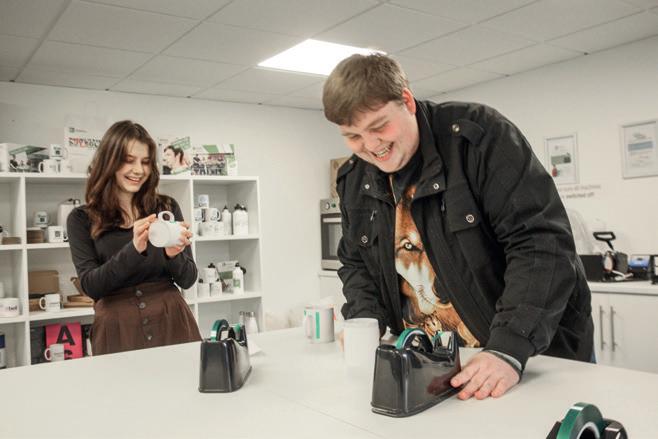


“I am driven by being successful, but I’ve never made decisions based on the money I might earn. It’s just not in my nature. I could probably have made a lot more years ago by following the profit route, but I haven’t.
“I was challenged by our client Sky at the right time to do what many corporates were starting to do. I felt we had an obligation because we are a good company with a strong moral compass.
“One of our big clients is Tesco and like all big clients they want to know what their suppliers are doing in terms of carbon reduction. And meeting that challenge keeps us motivated and innovating.
“Because we adopted the carbon reduction challenge early, we got a seat at the table alongside other forward-thinking companies, although we were far smaller at the time than anyone else.
“And we didn’t give the job of sustainability to just anyone in the company, we put it front and centre of everything we did – and still do.
“The bit that I didn't anticipate was how much it would enrich the culture of the company.”
Simone’s commitment to social improvement in the local community is also seeing success, though it’s taken around 10 years.
In 2015 she set up the Commercial Foundation, an independent social enterprise to support young adults who have previously experienced barriers to work. It helps them get their lives back on track.
Its digital studio, We. Do. Print, provides printing services and is now operating at a profit.
Simone is hugely proud of its success.
“Over the last 10 years we have changed the lives of close to 200 people who were experiencing big life challenges. For years it cost us a lot to run, but now it’s making money.”
And it’s helped the business too, although that wasn’t why she set it up in the first place.
“The foundation can be the di erence between a major corporate becoming a customer or not,” she explains.
“When they visit, they see something di erent. When they ask us what we’re doing around social mobility, we introduce them to some of our young people working at the foundation.”
She’s now getting excited about a new project – buying a farm for the company.
“With more people working fewer hours as technology takes over in some areas, what are they going to do with their free time? I watched a series called The Biggest Little Farm where a young couple develop 200 acres outside Los Angeles and I thought – we could do that.
“We could o er everyone at Commercial short working stays on the farm with their families. I’m already looking for land.”
For Simone the ideas just keep coming, but it’s also about making the right decisions.
“Some will be longer term, but ultimately, they need to benefit society and the business. We want to be purposeful, and everything we do is with that objective.”

A Cirencester artisan Italian gelato ice cream company has branched out into dog-friendly ice cream.
The lactose free, low fat, low sugar ice cream, Gru es, has been developed over four years by Dolcetti founder, Rob Gibson.
Rob said: “The market for dog ice cream has soared in the last few years, and while such ice cream should only be an occasional treat as part of a balanced diet, I wanted to see if I could apply my expertise in ice-cream making to the canine world.”
The new product, currently available in three flavours: beef, vanilla and chicken, is just part of the evolution of Dolcetti since the business launched in Cirencester around 12 years ago.
Rob first learned to make (human) Italian gelato ice cream in his native South Africa and helped establish the largest chain of ice cream parlours in the country.
When he moved to the UK, he set up Dolcetti and now supplies local hospitality venues alongside running an ice cream parlour at his factory on Wilkinson Road, Love Lane, Cirencester.
The Gelato for Rob’s ice-cream for humans is made from milk, cream, sugar, natural

stabilisers and contains little or no air and has no artificial flavourings, palm oil or whey powder. Most ingredients, including the milk and fruit, are sourced locally.
As the business has grown, it expanded out of its original site and over the last few years Rob has not only been developing his unique Gru es dog ice cream, but also moving into and fitting out a larger facility on the same Love Lane trading estate.
Rob said: “All our investments are aimed at growth, and I’m really excited about 2025. We have new equipment going into our Cirencester site and have appointed a wholesale distributor in Bromsgrove which has extended our market reach.
“For our Gru es dog ice cream we have distributors in Bristol and South Wales. It can also be bought through our website using a frozen next day mail order service.”
One of Cheltenham’s most well-known businesses has been sold to a Tyne & Wear wholesale business for £70 million.
Creed Catering Supplies, which reported revenues of more than £130 million over the last 12 months, has been bought by Kitwave Group plc.
The companies say there will be no changes to the Creed depot, operational, sales, head o ce teams, management team and Board.
Chris Creed remains CEO of Creed Foodservice, with Philip de Ternant continuing as Chairman.
Miles Roberts will continue to be Managing Director, running the dayto-day with his current Directors. Philip Creed, the other family member involved in the business, will continue to support the company’s sustainability initiatives.
Chris said: “We have been evaluating our plans to take our business to the next stage for some time now and are delighted to be able to share our growth plans.
“Our objectives have always been to keep the Creed name, remain a member of the Country Range Group, secure the right investment and strengthen our infrastructure and capacity to secure our long-term growth; and I’m pleased to say that all these goals have been achieved.
“Creed has thrived on family values for more than 50 years and our people, culture and values remain woven into the fabric of our extended business.”
Ben Maxted, Chief Executive O cer of Kitwave, said: “Creed has an exceptional heritage and is one of the UK’s leading foodservice wholesalers.
“In line with our buy and build strategy, Creed is also expected to significantly enhance the Group’s earnings along with providing material buying, operational and financial synergies.”
In March, the government unexpectedly announced its purchase of land at Oldbury (the site of a former nuclear power station). Now a private company has acquired nearby Berkeley. Everything is in place for a major investment in nuclear, but the government needs to get a move-on

By Nicky Godding, Editor and Ian Mean, Business West Gloucestershire director and member of Gloucestershire’s
Before it got booted out of o ce this summer, the previous government made a surprise announcement.
Great British Nuclear, the arms-length body responsible for driving delivery of new nuclear projects, would buy land at Oldbury, home to a nuclear power station from 1967 to 2011.
It paid £160 million for Oldbury and Wylfa, another former nuclear power station site in North Wales.
The site at Oldbury (and its close neighbour at Berkeley) has been long championed by the region’s pan-regional partnership, the Western Gateway, for the development of net zero technology, green skills and jobs.
Berkeley and Oldbury are among several nationally prioritised sites which have the potential to host multiple small modular reactors (SMRs) and are part of the
government’s SMR siting process led by Great British Nuclear.
The reactors themselves are being pioneered by Rolls-Royce SMR which says a single such reactor could power one million homes for 60 years.
The news of the acquisition was followed by South Gloucestershire and Stroud (SGS) College’s announcement that it had successfully sold its 40-acre Gloucestershire Science and Technology Park at Berkeley to Chiltern Vital Berkeley for £6.5 million.
The new owner intends to create a lowcarbon technology super-cluster at the site and develop it into a centre of excellence for nuclear power research and development.
Chiltern Vital Group (chaired by Lord Grade, former chairman of the BBC) which owns Chiltern Vital Berkeley, is also supporting Rolls-Royce in the selection of UK sites for the roll out of its SMRs.
The Berkeley and Oldbury sites were home to the world’s first civil nuclear power stations, opened in the 1960s.
But the government needs to get a moveon over the establishment of a cluster of new small modular reactors.
The sale by South Gloucestershire and Stroud College of its Gloucestershire Science and Technology Park to the Chiltern Group is the start of a potential economic game changer for our region.
However, the new government has been talking consistently about weather reliant solar and wind power. But the weakness of these sources long term seems obvious.

“The new owner intends to create a low-carbon technology supercluster at the site and develop it into a centre of excellence for nuclear power research and development”

a leading player in this new, multi-billionpound global market.
Reaching a successful outcome in the GBN selection process, at pace, will enable immediate investment in the UK supply chain, create jobs and deliver the longterm energy security and low-carbon future that the country needs.
What we need is an urgent government decision on the company being awarded permission to develop and build these SMRs – each the size of a few football pitches.
In late September Rolls-Royce revealed that it will be invited by Great British Nuclear to negotiate on the deployment of UK units, alongside three international SMR developers.
The case for Rolls-Royce’s nuclear power ambitions got a further boost when the Czech government selected Rolls-Royce SMR to build mini nuclear power plants in the country. It is also in the final two in Sweden’s SMR selection process.
It is a big vote of confidence for the company, and it is highly likely it will be
The mini nuclear reactors will bring benefits to the whole country in reducing reliance on gas and oil as well as the benefits of local jobs and in international trade.
Gloucestershire – as in the 1960s – will be the “ground zero” for this innovation with the guarantee of SMRs being built at Oldbury and Berkeley playing a vital supportive role.
A bright future for young people to work in this sector is tangible.
Those entering secondary education today will be in high demand for the SMR operators as well as the blue-chip AI data centres, hydrogen production plants, agritech companies, research institutions and business start-ups attracted to an SMR site.
The government needs to make some firm decisions on these new mini nuclear reactors. The benefits to Gloucestershire, which already has nuclear in its DNA, will be major.


The Rolls-Royce SMR is the UK’s first domestic nuclear technology in more than 20 years – providing a British solution to a global energy dilemma.
Each small modular reactor will produce enough stable, a ordable, emission-free energy to power a million homes for at least 60 years.
Rolls-Royce SMR has received government funding of £210 million as part of Phase 2 of the Low-Cost Nuclear Challenge Project, administered by UKRI, which has been supplemented by £280 million of private capital.

A new study commissioned by Hydrogen South West, which is driving the development of hydrogen infrastructure in the region, has revealed that up to 10 per cent of South West vehicle fleets could be running on hydrogen by 2030.
This may not come as news to more than 100 people at a business breakfast meeting organised by SevernNet and hosted by Avonmouth-based Molson Group. The company sits at No 9 in our South West 250 ranking celebrating the region’s top privately-owned businesses by annual sales turnover.
SevernNet, which supports businesses, the local community and other stakeholders across Royal Portbury Dock, Avonmouth, Severnside and Western Approach, invited guests to learn what the industry is doing to decarbonise mobile heavy equipment.
They heard from Henry Moore, Commercial Director at Molson Group and Sam Mercer, CEO at Plantforce. A question and answer panel included Chris Matthew,
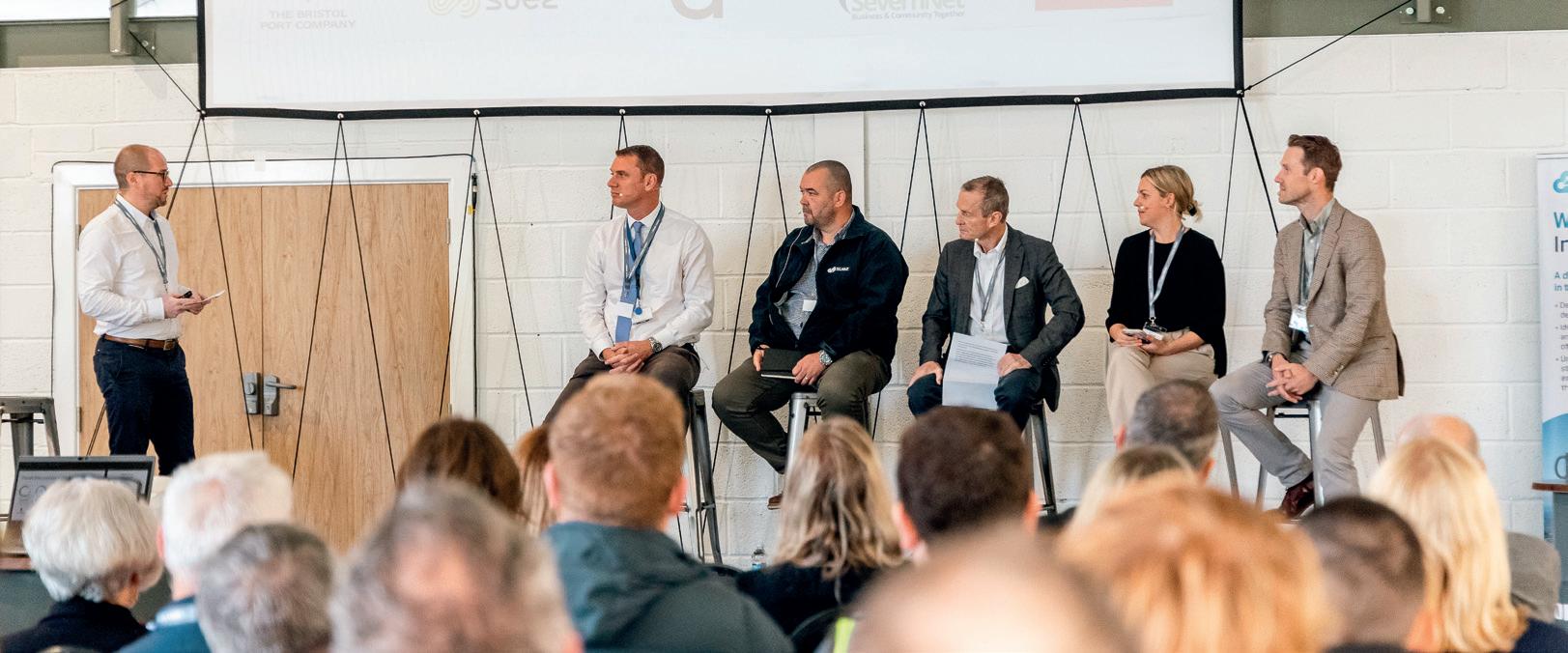
Commercial Director of Plantforce, Paul Lownes, Programme Director at Gravity, a major new business campus being developed near Bridgwater, Derek Healey, Technical Manager at waste management company Suez, Rhianydd Gri th of the West of England Industrial Cluster and Chris Adam, Engineering Director at The Bristol Port Company.
Guests were welcomed by Molson Group CEO, Robin Powell. He said: “Part of our role here at Molson Group is understanding the requirement of the







users, our customers, and working with manufacturers to ensure that they’re building the products the industry is looking for, which is increasingly the decarbonisation of equipment.”
Emissions from non-road-based equipment contributes 2.7 per cent of the UK’s emissions.
The industry has been investing significantly in reducing this through improving e ciency, changing the way existing machines are driven and operated,


buying more fuel-e cient machines and using new technologies which can operate using alternative fuels.
In the UK as a whole the transport sector made up 34 per cent of the country’s CO2 emissions in 2022. Hydrogen is expected to be the dominant choice for heavy vehicles that have high utilisation, heavy loads and require long ranges, but the development of hydrogen-powered equipment is not as advanced as that of battery-powered equipment which is already in use in less heavy-duty areas of the industry.
Molson Group is working with equipment manufacturers and customers to drive innovation of hydrogen-powered equipment. Henry Moore at Molson Group, said: “We want progress on the development of both hydrogen-power vehicles and electric battery-powered equipment for the lighter-use vehicles and equipment as fast as possible because our customers are crying out for it.”
Molson Group already has a range of low emission technology vehicles and equipment at its Avonmouth site and is partnering with other manufacturers on identifying more ways of replacing diesel engines with lower emission equipment.
But the panel admitted that all new equipment and alternative fuels come with their own challenges, from run time and rechange to the cost of purchase and support, and the adoption and training of drivers and operators.
One of the biggest issues the industry is facing is around infrastructure challenges, including grid connections and enough power supply to be able to recharge battery-powered equipment in the right area at the right time.
Ultimately, it is the industry which is currently driving a lot of the innovation around hydrogen and battery-powered plant and equipment, and industry leaders are calling for the government to give clarity on what the future regulations will be so that investment can be made in areas it is needed.
Gloucestershire-headquartered IT group Kubus has received a £9 million investment from BGF to accelerate its global growth plans.
Founded 21 years ago, Kubus, based in Cirencester and a value-added reseller, o ers IT infrastructure solutions, including in networking, storage and cyber security to blue chip firms and public sector organisations.
As well as the £9 million injection, the Kubus leadership will be bolstered with the appointment of non-executive chair Paul Brennan who comes aboard via equity investor BGF's talent network.
"We are thrilled to partner with BGF and leverage their expertise and resources to take Kubus to the next level," said Andrew Humphrey, CEO of Kubus, which sits at No 125 our our South West 250 ranking.
"As a business based in the heart of the Cotswolds, we’re proud to be working
with businesses and organisations across the world.”
Kubus already works with several IT vendors in the sector, including Juniper Networks, Cisco, Dell, Fortinet and Pentera.
In the year to the end of March 2024, the firm reported £35 million turnover and £2.6 million in earnings before interest, tax, depreciation and amortisation.
The BGF investment will help it make targeted acquisitions, enhance its marketing and sales capabilities, strengthen its operational infrastructure and explore new market opportunities.
The Kubus investment continues a strong year for BGF’s South West team following a £9 million investment in natural food ingredient manufacturer Plant-Ex and the successful exit from construction engineering company Hydrock. Both companies are based in Bristol.
Swindon Motor Group
Dick Lovett is expanding its successful bodyshop function into Melksham to support its dealerships. It bodyshops specialise in automotive accident repair, wheel refurbishments and SMART repairs.
The company’s established Bodyshops in Bristol and Swindon specialise in automotive accident repair. It also has a dedicated wheel







centre facility in Swindon which sits next to its Ferrari dealership.
The new facility will mean customers benefit from additional services when visiting its BMW, MINI and Jaguar Land Rover Melksham dealerships.
Dick Lovett, a family business since 1966, sits at No 2 of our South West 250 ranking.



A funding award of £127,000 from Arts Council England will help Bristol-based Spectroscope expand its collective of artists and producers and take a programme of immersive artworks around the world.
The South West’s creative industries are significant drivers of the region’s economy. In fact Bristol and Bath collectively is the UK’s third largest media hub, with a reported £650 million gross added value from more than 6,000 businesses.
Nationally, the economic contribution of the UK creative industries grew by 6.8 per cent in 2022 to reach £124.6 billion, according to government estimates.
Spectroscope, founded by acclaimed deaf curator Cathy Mager in 2022, has now appointed Cat Roberts as head of programme and production.
Cat has previously managed Bristol’s largest event spaces and venues, and has taken on management and production roles for Glastonbury Festival, Boomtoom
Fair, Forwards Festival and Love Saves the Day.
The investment from Arts Council England, and further awards from other organisations, will enable Spectroscope to deliver a programme of new artworks between now and 2026 across the UK, Australia, US and China. It will also support Spectroscope’s longer-term ambition to better support creative development and artworks by disabled artists.
Cathy said: “This major funding award is a pivotal moment for Spectroscope and real recognition of our organisation’s mission and contribution to the sector.”
Phil Gibby, South West Area Director for Arts Council England, said: “We are incredibly proud to award a National Lottery Project Grant to Spectroscope.
“Cathy’s national and international ambitions for a foundry of talent led by disabled artists will prove to be one of the most significant cultural developments to emerge from the South West in recent times.”
£300m investment for region’s SETsquared partnership
The SETsquared Partnership universities – Bristol, Bath, Cardi , Exeter, Southampton and Surrey, has revealed a new £300 million spin-out focused investment vehicle with regional investment firm QantX.
The aim is to support the growth of science and technology companies addressing global challenges.
The initiative was announced by Sir Richard Olver, Chair of QantX, at the Regional Investment and Health and Life Sciences Summit held in Bristol, which Science Minister Lord Patrick Vallance also attended.
The SETsquared Partnership has a research portfolio of more than £600 million and has produced more than 230 spin-out companies.
Despite this success, the potential impact of R&D to power regional growth and productivity is being held back due to significant imbalances in equity funding across the UK.


A consultation on how Bristol Harbour could be transformed over the next 20 years has been launched.
The Harbour Place Shaping Strategy (HPSS) sets out a long-term vision for the future of Bristol’s floating harbour to make it more accessible and welcoming, better able to adapt to climate change, thrive economically and improve as a leisure and heritage destination.
As well as seeking views on the HPSS’s draft vision, the consultation aims to gather feedback on how improvements to the harbour's waterspace and the six distinct areas that surround it could help achieve the vision.
Cllr Andrew Brown, Chair of the Economy and Skills Committee, as well as the Harbour Committee said: “We want to create a strategy that will encourage residents, businesses and our communities to work together to rejuvenate our historic harbourside.
“We want to make sure Bristol can be enjoyed by our city’s growing population
We want to create a strategy that will encourage residents, businesses and our communities to work together to rejuvenate our historic harbourside

Bristol-headquartered aerospace and technology company Vertical Aerospace which is pioneering zero-emissions aviation, achieved a significant milestone in September.
Its latest prototype completed the first phase of a piloted flight test programme at the Vertical Flight Test Centre.
The VX4 prototype conducted multiple piloted tethered flights and ground runs, across 20 piloted test sorties, completing a total of 70 individual test points.
Vertical will now progress to piloted untethered thrustborne testing, as soon as it receives permission from the Civil Aviation Authority.
The company said its flight tests have already shown the aircraft’s incredible stability – particularly in ground e ect, typically one of the most challenging flight conditions.
Stuart Simpson, CEO at Vertical, said:
and an increasing number of visitors.”
The area includes the harbour’s water space, and the land immediately surrounding it from Junction Lock Bridge near Underfall Yard to Totterdown Basin behind Temple Meads Station.
It connects the city’s three major regeneration projects being progressed by the council in partnership with stakeholders across the city, Western Harbour, City Centre and Temple Quarter.
“During the past few months we have delivered our most advanced full-scale VX4 prototype, have gone from first powered ground test to ‘wheels up’ in just one week and completed the first phase of our piloted test flight programme.
“Every day I continue to be deeply impressed by the phenomenal engineers we have and the progress we are making here in Bristol as we build a new generation of aviation.”

The Leader of Swindon Borough Council, Cllr Jim Robbins, has issued a rallying cry to landowners, developers, educational institutions and other organisations with a stake in the future of Swindon town centre to help drive its regeneration over the next decade.
Addressing a meeting of representatives from more than 30 organisations, Cllr Robbins said that “moving the dial” on progressing work to rejuvenate the town centre will depend on the private sector bringing forward innovative proposals and investment to unlock its future.
The partners were convened by the council to help develop its ambitions for the town centre that will be set out in a document called the ‘Vision for the Heart of Swindon’, to be tabled at a council Cabinet meeting.
Representations from organisations including FI Real Estate Management (owners of the town’s Brunel shopping centre), GCL (representing The Parade), William Arthur Property (owner of commercial property in the town centre), Network Rail and the University of Bath will
review the latest draft of the document.
Cllr Robbins urged partners to be bold and help lead the reinvention of the town centre. He highlighted the snowball e ect of how investment in new housing, employment and educational space can act as a catalyst to help generate a vibrant future.
As part of its contribution, the council has committed to bring forward proposals this year for a new performance and cultural venue in the town centre, with capacity for national touring shows, as well as other large scale events.
Cllr Robbins said: “It’s clear that creating a vibrant, attractive town centre over the next decade will only be possible with the buy-in and contributions from a wide range of partners.
“Achieving the ambitions will require the imagination and investment of partners to help reinvent the town centre.
“The council will do everything it can to facilitate this, using town centre assets it owns to help bring forward new places for people to live, work, learn and socialise.”
Swindon’s iconic Magic Roundabout has been named Roundabout of the Year by the UK’s Roundabout Appreciation Society. This means it will feature in the society’s 2025 calendar on the December page.
For those not in the know, Swindon’s unique tra c management system consists of five mini roundabouts arranged in a circle. It was constructed in 1972 according to the design of Frank Blackmore who worked for the British Transport and Road Research Laboratory. Tra c flow around the inner circle is anticlockwise, and tra c flows in the usual clockwise manner around the five mini-roundabouts on the outer loop.



Acorn Property Group has shared its plans to transform Chippenham’s Emery Gate shopping centre, breathing new life into the heart of the town.
The company, which bought Emery Gate in 2022, said: “We’re continuing to see a decline in footfall at traditional shopping centres and Emery Gate is unfortunately no di erent. We can’t hope that the retail sector turns the clock back 25 years.
“We have to do something di erent and embark upon a radical programme of change to secure Emery Gate’s future and support the rejuvenation of Chippenham town centre.”
Chippenham’s population is growing and this trend is expected to continue. Acorn’s proposals include around 225 new homes (including one-three bedroom apartments) on underused brownfield land, integrating Emery Gate with the town’s Island Park and river.
The company also wants to repurpose the centre’s existing commercial floorspace, creating around 3,500 sq m of replacement retail, food, and leisure uses with a range of unit to accommodate a broad mix of businesses and attract people from morning through to the evening.
Consultations are ongoing and it expects to submit proposals for planning before the end of the year.


The Peppermill Town House Hotel in Devizes has been put on the market at a guide price of £1.8 million.
The 16-bedroom hotel is being marketed by Christies. It o ers a 68-seat restaurant, function rooms and wine bar with a five-star AA rating.
The property was bought by Philip and Amanda O’Shea in 2012 and has been upgraded in recent years. It generates an annual turnover of more than £1 million.
Philip said: “Since we purchased the property we have thrown our heart and
soul into building it into the business it now is. We’re really proud that we’ve been able to expand by adding more letting accommodation as well as establishing our own wine bar, award-winning restaurant and creating a function room space.
“Having worked hard to achieve all this we now know that this is the right time for us to retire.
“We’re hoping we can pass on our local, successful business to someone who has the same passion and dedication for hospitality and will become part of the community of Devizes.”
Orchard Press, the family-owned Swindon printing business, says it is on track to achieve a record-breaking £1.1 million in revenues, while also reaching a significant milestone in becoming entirely debt-free.
The business o ers digital and traditional o set (lithographic) printing, wide format, postal and installation services.
Over the past decade, since acquiring the business from the Rowley family who originally set up the business in their garage nearly four decades ago, Jason and Samantha Grubb have navigated a competitive and evolving market.
Jason said: “Being on track to reach
£1.1 million in sales is a significant milestone for us all. It highlights the return on our investments, in our people and services. We’re particularly pleased to achieve this while also nearing the goal of being debt-free, which is a true testament to the hard work of our entire team.”
The business has made a number of significant investments this year, including a new website and in its facility at Greenbridge in the town.
Jason added: “The changes we’ve made during 2024, have all been about improving the working environment for our team and the services we o er to our clients.”


Leamington Spa mobility innovator OX Delivers plans to almost double its UK workforce with the launch of a recruitment campaign for a range of skilled roles at its headquarters in the West Midlands.
As OX Delivers prepares to enter the latest stage of development of its next-generation electric truck development, these roles will be vital to support the ramp up to continuous truck build.
Natalie Dowsett, Chief Commercial O cer and Co-Founder of OX Delivers, said: “We're supercharging African trade by improving access to clean, reliable, a ordable transport in underserved markets.
“We have spent the past four years developing and validating our technology, building our infrastructure and proving the ‘as-a-service’ model. Now, we are expanding our UK team for the next development phase of our all-electric truck and getting prepared for continuous truck build next year.”
For less than $1, an OX Delivers customer can transport a sack of goods to market across poor quality roads, which are typical in the Global South. E ciently completing the task in a matter of hours instead of days by foot or bicycle, the OX Delivers


transport-as-a-service model enables farmers and traders to access larger markets further from home, where prices are higher and new opportunities available.
This generates profit for OX Delivers and creates a cycle of economic and social growth within local communities across the Global South.
With OX Delivers’ unique transport-as-aservice business model, customers pay only for the space they need on a kilogramper-kilometre basis. The service is easily accessible via an app or toll-free number.
Since the launch in 2021 of its pilot operation in Rwanda, OX Delivers has seen strong demand and is now supporting more
than 5,000 customers including smallholder farmers and traders, with 80 per cent of orders coming from repeat customers.
This year it saw its strongest first quarter performance, since starting its pilot operation in Rwanda, generating $262,000 revenue between January and March 2024.
The original OX Truck, designed by Professor Gordon Murray in 2016, was the world’s first flat-pack truck and the first vehicle designed specifically for Africa in 40 years. The OX team has advanced the truck design, evolving it into the first purposedesigned electric truck for the Global South. It is 10 times cheaper to run than existing alternatives and could transform transport services across the continent.
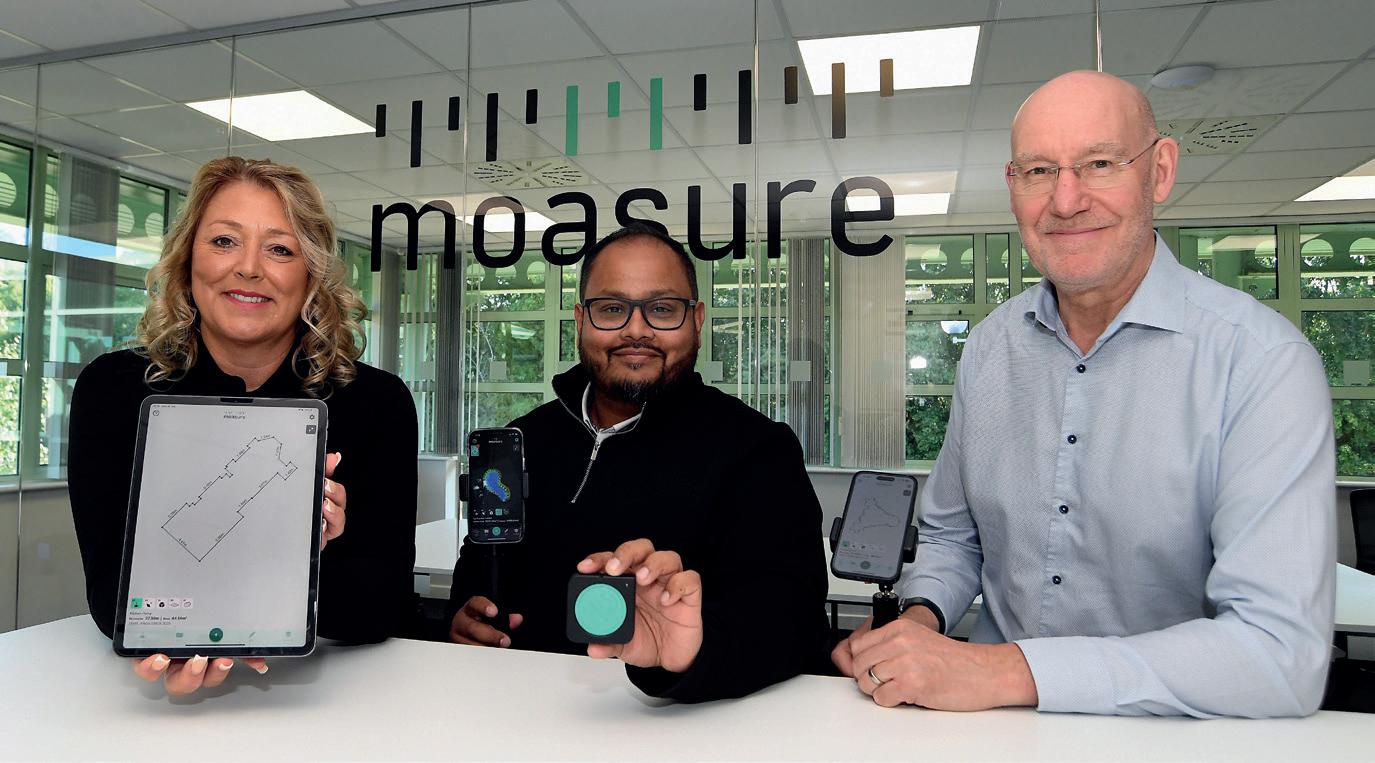
Rapidly growing Warwick measuring technology firm Moasure has unveiled its second generation of products in a bid to increase accuracy and break into new markets.
The company, which is based at the Warwick Innovation Centre, is behind the handheld Moasure ONE tool, which enables users to 'draw' an area in two or three dimensions before a diagram appears on a linked smartphone app
showing such things as the perimeter, area and volume.
Moasure has been ranked the 40th fastestgrowing private company by the Sunday Times after boosting turnover by almost 120 per cent in three years.
Now the firm has launched the Moasure 2 Series o ering even higher degrees of precision measuring. Its co-CEOs are Alan Rock and Mo Hussain.
We’ve also broken into Canada and Australia ...
Mo said: "We’ve had enormous success in the last three years, not only boosting our sales in the USA, but breaking into the European market by opening a depot in the Netherlands which has allowed us to access markets in Germany, France, and Italy.
"We’ve also broken into Canada and Australia and are hopeful of establishing a market in Sweden in the near future.”
Mo said that the company could continue to double turnover in the next year and create more jobs in Warwick.
Jane Talbot, centre manager at the Warwick Innovation Centre, added: "The growth of Moasure during the team’s time with us has been nothing short of remarkable, and this is only set to continue with the launch of their new products.”
The Manufacturing Technology Centre (MTC) in Coventry has signed a Memorandum of Understanding with Holtec Britain, part of global energy company Holtec International, to support the manufacturing and testing of its Small Modular Reactor.
The American nuclear giant is investing heavily into the UK industrial ecosystem for its Small Modular Reactor (SMR). Holtec has been active in the UK for more than 15 years, working across EDF reactors.
The MTC and Holtec will work on developing manufacturing processes for Holtec's PWR SMR-300.
The MTC explore innovative manufacturing processes for a future testing phase and
work with Holtec from proof of concept to final installation, training and support after project completion.
Holtec's impressive project team already includes UK construction giants Balfour Beatty, Mitsubishi Electric, UK engineering consultants Mott McDonald and Hyundai E&C – a major South Korean construction company which has already delivered 18 nuclear plants in its native country.
Gareth Thomas, Director at Holtec Britain, said: “Next-generation civil nuclear power provides a golden opportunity for the UK to secure a strategic advantage in a global marketplace. But developing new manufacturing capabilities is vital so that nascent technologies, such as SMRs, can be commercialised and deliver the e ciencies promised. Through our
partnership with Holtec, not only will we deliver the innovations needed by one company, but also support end-to-end supply chain development to help anchor this growth sector in the UK.
Andrew Bowfield, Senior Business Development Manager at the MTC, added:
“Last December Holtec was awarded £30 million from the UK's Future Nuclear Enabling Fund to progress its Pressurised Water Reactor SMR design through the UK Generic Design Assessment process. Last month Step 1 of that process was completed in record time.
“Holtec's investment is set at £1.8 billion, including building a £1.5 billion UK SMR factory which could generate 3,000 engineering jobs over 20 years and generate £1.5 billion for the economy.”






It’s the seasoning that few of us want to do without – though all of us are warned against consuming in quantity.
But what would a bag of chips taste like without a pinch of salt? Or a packet of crisps (those of a certain age may remember the tiny sachet of salt in every packet to season our own). Unsalted butter? OK for cooking, but very bland if you’re spreading it on your morning toast.
But few of us think where the contents come from while we’re grinding the salt cellar, so it may come as a bit of a surprise to learn that some of the UK’s biggest salt deposits are in Droitwich.
The Worcestershire town produces all-natural brine salt, harvested from the county’s pure brine springs.
One producer is Droitwich Salt, owned by local farmers Will and Gillian Kerton, who are also food heroes for Taste Worcestershire, an annual campaign celebrating – thecounty’s thriving food and drink sector.
Since 1825 salt from Droitwich has been celebrated worldwide for its purity, but in 1922 production ceased. Fast forward




almost 100 years and when the local council approached Will and his wife Gillian about reviving production, they jumped at the opportunity.
Will explains: “As fifth generation Droitwich farmers, we have a strong sense of custodianship for our land and heritage.
“My wife, Gillian, her dad and I are all
Droitwich born and bred and were fascinated by the history of Droitwich Salt, especially as our own farm landscape was a big part of the story.
“When the council suggested reviving Droitwich Salt, we were keen to get involved, and after learning more about its heritage, the brine’s purity and unique taste of salt, we were fully on board.”
Droitwich (interestingly the ‘wich’ in the town’s name apparently means salt) was synonymous with salt from the Bronze Age through to the mid-19th century, attracting the Romans, and receiving international and even royal recognition.
The historic pumphouse where Will and Gillian collect the brine is less than three miles from their farm.
“We had space on our farm to add salt tunnels and the facilities needed, including a biomass boiler to gently crystallise the salt using renewable energy. This meant that we could keep the whole process including transportation, production and packaging all in house, further supporting our sustainable/low food miles ethos,” Will said.
Droitwich Salt is now winning awards and has garnered national TV coverage. It has also attracted the interest of Michelinstarred chef Brad Carter.
“Brad helped us to develop a number of di erent seasonings, including Charcoal and Coastline salts. He also nominated us for the prestigious Slow Food’s movement “Ark of Taste” which showcases and protects heritage and small-scale food products. We’re very proud to be a member today.”
Droitwich Salt is proving so successful that Will and Gill are considering expanding their production facilities to include a dry ageing unit so they can salt their own meat.
Will added: “We’re proud to be based in Worcestershire and to be involved in the Taste of Worcestershire campaign. Keeping things local and supporting local businesses is something we are passionate about.”
Droitwich salt can be found in farm shops and delicatessens across the country, and it’s used by local food heroes including The Beefy Boys, Two Farmers, Peter Cooks Bread and Tubby Toms, to name a few.
A Worcester producer and distributor of artisan foods has been acquired by The Compleat Food Group.
Harvey & Brockless works with artisan food producers from across the world to deliver speciality cheeses, charcuterie, olives and deli products to its nationwide network of customers. These include some of the UK’s leading luxury hotels and restaurants, farm shops, delicatessens and food manufacturers, including Harrods, The Savoy, The Ritz and The Dorchester.
This latest acquisition follows The Compleat Food Group's purchase of SK Foods and Zorba Foods, category leaders in private label chilled party foods and dips and deli fillings, earlier this year.
Employing around 500 people, Harvey & Brockless will continue to operate under its own brand and with the current management team.
The family-owned firm was founded in 1970 in Hailsham, Sussex, growing to become one of the leading suppliers of fine foods to foodservice. In 2018, it
opened a new site in the UAE, servicing Emirates and Etihad airlines as well as a number of five-star hotels.
Its range includes the largest collection of British farmhouse cheeses in the UK, Mediterranean deli products from Dell’ami, British cured meats, and its own range of bespoke sauces and dips.
These are all produced at its purposebuilt site in Evesham, Worcestershire as well as bespoke assembled cheese solutions from its site in Battersea, London.
Nick Field, CEO at the Nottingham-based Compleat Food Group, said: “Harvey & Brockless has a long heritage and passion for sourcing the best speciality food from across the UK and the globe for its customers, which aligns perfectly with our mission of creating great quality food that people love to eat.”
Nick Martin, Managing Director at Harvey & Brockless, added: “In The Compleat Food Group we have found a partner who shares our passion for great food and will help us to grow and fulfil our future ambitions.”
D-RisQ, the Malvern company specialising in software and systems verification technologies, has been selected for the first cohort of the Airbus Defence and Space UK Space Accelerator being delivered by workspace and tech support company Plexal.
This is the first of its kind and part of the wider Community for Space Prosperity initiative to develop the UK’s space ecosystem.
D-RisQ has joined the programme alongside a diverse cohort of tech companies.aThe announcement was
made at Farnborough International Airshow at a special launch event hosted by Airbus where the programme and the cohort were presented.
Nick Tudor, Co-Founder and CEO of D-RisQ said: “This is a great opportunity for D-RisQ to be guided by Airbus and Plexal on evolving our business to meet the needs of the space sector. We are looking forward to having the opportunity of bringing value from our automatic verification tools to the sector and accelerating access to space for the UK space supply chain.”
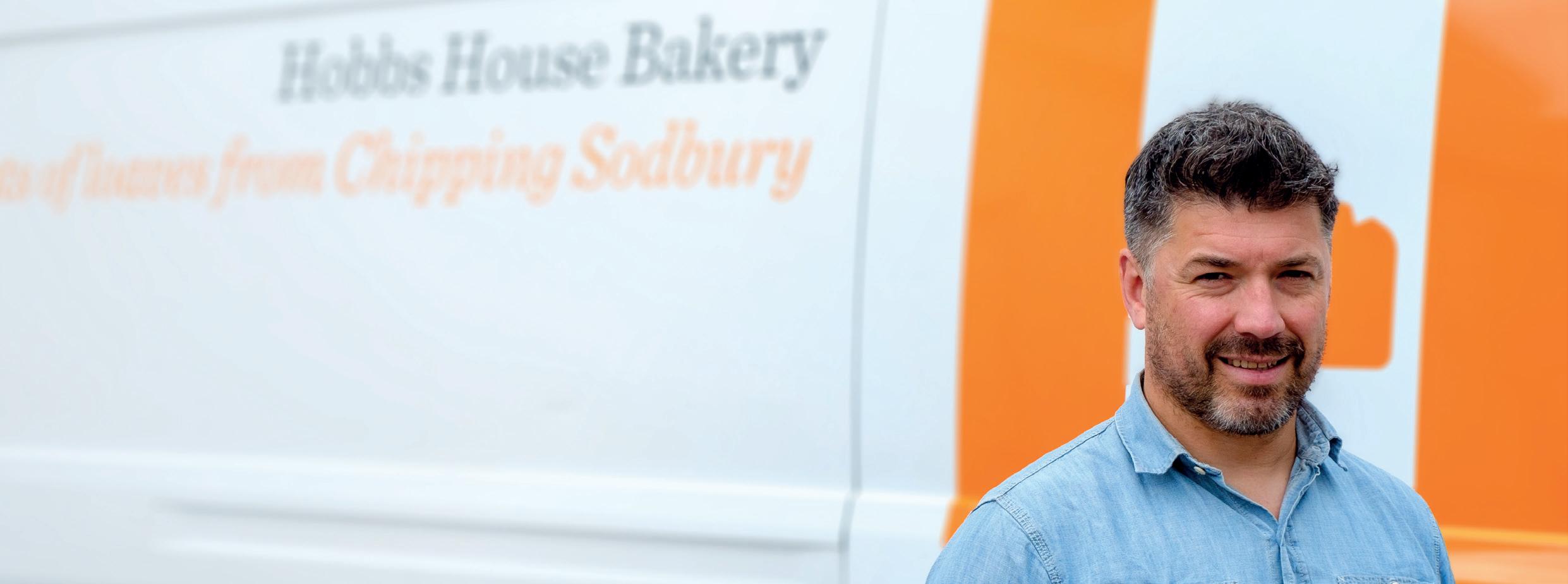





The
fifth generation behind Hobbs House Bakery are using their loaf to grow sustainably
By Nicky Godding, Editor

When I was growing up there were two sorts of bread.
The first was processed sliced white (or if you were really adventurous, sliced brown). This came from supermarkets and each limp slice generally tasted of little or nothing.
Then there was bread from small bakeries where a marvellous smell would spiral through the door on to the street outside and the loaves had comforting names such as split tin or cottage.
Over the years the big supermarkets embraced cheap processed bread, mercilessly undercutting local bakeries and thousands closed. But then we began to come to our senses. Why were we eating tasteless bread? By the 1980s and 90s, artisan bakers had started opening up again across the country.
One of the region’s biggest artisan bakers, owned by the Herbert and Wells families, survived throughout. It’s now based in Chipping Sodbury, South

Gloucestershire with fifth generation George Herbert as Managing Director. Can Hobbs House Bakery be called artisan? After all, it employs around 160 people and annually turns over more than £7 million.
Yes, because an artisan bakery uses high quality ingredients and makes its bread using traditional methods. Hobbs House does all that and more, including training the next generation of bakers.
The Herberts were originally blacksmiths. But 1920s life was tough and they began using the back of the blacksmith’s furnace to bake bread. This was so successful that they started selling to others. The business grew and over the years, various family members peeled o to set up their own bakeries.
George’s grandfather David moved to Bristol to set up a bakery.

George Herbert, Managing Director
Almost 100 years later it remains a family a air. Hobbs House Bakery’s current chairman is George’s father Trevor, 73. George’s brother Henry is Sales Director. Sam Wells, their uncle, is Commercial Director while Anna Herbert, George and Henry’s sister-in-law, is Head of Marketing.
George’s father Trevor had run the business since the 1990s, successfully growing it from the high street in Chipping Sodbury to its current location on the town’s Hatters Lane.
You might have heard of George’s brother, Tom who grew the bakery’s Nailsworth shop into an amazing bakery and café and for a while became the business’s front man. He went on to present various bakery shows.
In 2012 he was joined by Henry in the Channel Four series The Fabulous Baker Brothers. Over three series, Tom brought his passion for baking and Henry (who trained as a chef before returning home from London to take on the butcher’s shop next to the bakery in Chipping Sodbury)
































We do quality at scale, and we are a little more pricey because we use quality ingredients. But we won’t bend on that

















focus on its core business – baking bread. All to meet the demands of a growing customer base, much of it in the hospitality sector.
Cato (one half of the 1990s electronic music duo Groove Armada, now a farmer in Oxfordshire), appeared on Amazon Prime’s Clarkson’s Farm educating Jeremy on the benefits of regenerative farming.
complemented this with his butchery skills. It was great TV.
George arrived at the bakery more than a decade ago, originally as Sales Director. He had previously worked as a project manager for the telecoms company Orange, although like his brothers and sister (there are six of them in total), he’d done his fair share of working in the family business, sweeping floors and driving delivery vans during his school and university holidays.
Since George took over from his father as managing director, the business has tackled Covid and undertaken a major expansion in Chipping Sodbury, expanding the bakery from 20,000 to 30,000 sq ft. The company has not long completed the £2 million project (mostly self-funded), which also included improving and re-roofing the building, installing solar panels and investing in new equipment, including electric vans.
It has also reduced the number of shops it runs to four, now based in Tetbury, Nailsworth, Bristol and Chipping Sodbury, to
For the Herbert family, and everyone who works at the bakery, their fundamental objective is to produce good quality bread.
Hobbs House gets through between 22 and 26 tonnes of flour a week. The majority comes from Shipton Mill in Tetbury. Other suppliers include Matthews Flour and Wildfarmed, both based in Oxfordshire, which produce regenerative flour.
“We believe strongly in healthy soil,” said George. “Regenerative farming is essentially conventional farming. It still uses chemicals, but fewer of them and with less input from the farmer.
“While the yield might be lower from less intensively farmed crops, the quality of the flour is often better and over a period of, say, 10 years this method of farming allows the soil to improve. It has more worms and bird life increases.”
Wildfarmed found a global audience recently when one of its co-founders, Andy
“We want flour made from wheat grown in healthy soil,” said George. “Only about 10 per cent of our bread is organic (most of our sourdoughs and other artisan products).
“While organic is better for the soil and the planet, it is expensive and we balance that knowledge against the costs of running a business. Flour produced through regenerative farming is a good stepping stone.”
A lot of Hobbs House Bakery’s growth in recent years has been in the hospitality sector.
“We sell a lot of bread to regional burger chains and pub groups. We are competing with better quality against cheaper products,” George expains.
“All our burger baps are now made using regenerative flour because we believe, as do our customers, that consumers care enough to pay a bit more, but they aren’t as costly as those made with organic flour.”
To meet demand, Hobbs House runs three shifts over 24 hours, six days a week.
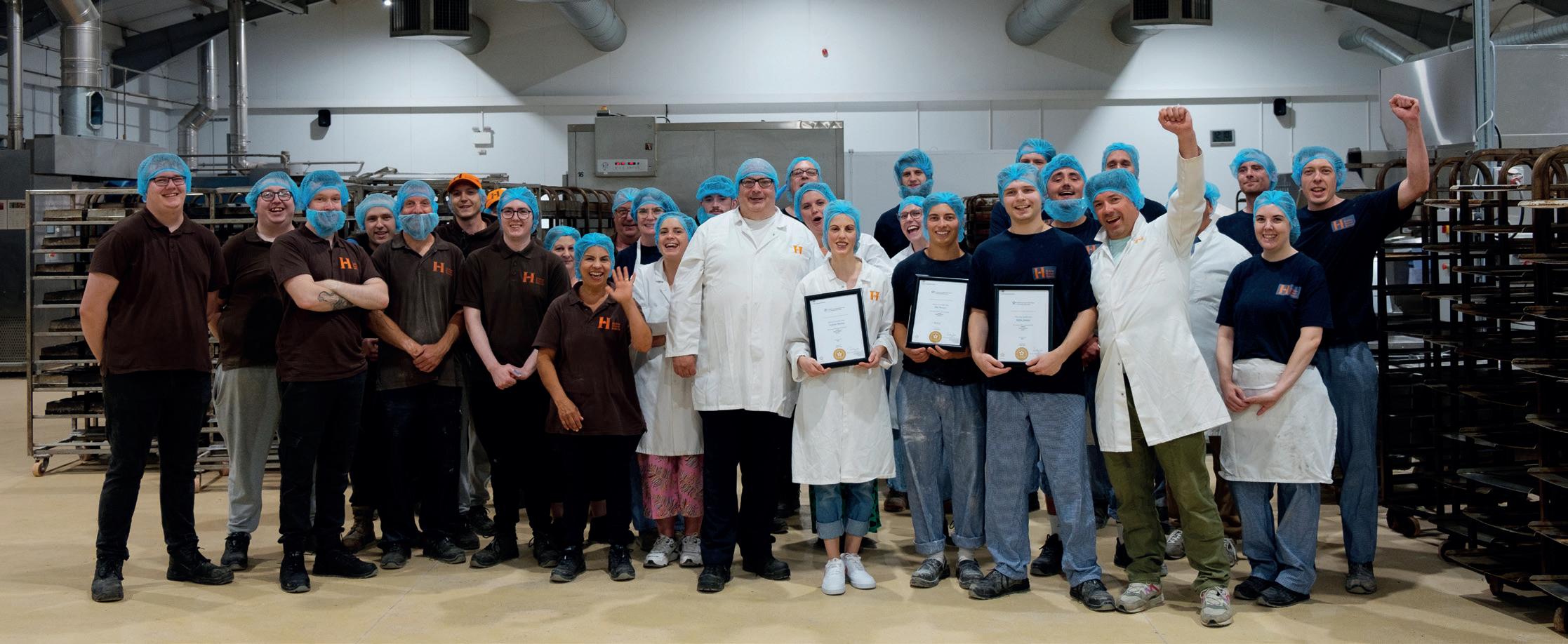
A new generation of skilled bakers is needed.
“There are not many experienced bakers,” said George. “At 16 my brother Tom went to Filton College in Bristol on day release to learn to be a baker. These courses no longer exist because people thought such jobs would be automated in the future.
“But there has been a massive increase in small bakeries, so these skills are needed. We want to look after our sta and give them good careers if they want it, so we invest in training.
“There is automation across the bakery, but everything is overseen by humans.”
Hobbs House Bakery’s latest intake of two 16-year-old apprentices joined this September are enthusiastic.
“This is the first time we’ve recruited apprentices straight from school,” said George. “They’re learning from our fully trained apprentices.”
Many Hobbs House sta live locally and around 60 per cent can walk or cycle to work. All of this creates its own sense of community in the bakery, and many have worked there alongside the Herbert family for generations.
The racks around the bakery are loaded with what seems like 100 or more di erent breads of all shapes and sizes made with di erent
flours, many from wheat grown within 10 miles of the bakery.
Some loaves destined for Hobbs’ larger hospitality clients are very long. Why? “Because chefs don’t want wastage from too many loaf crusts,” says George. The longer the loaves, the fewer crusts to waste.”
Three di erent sorts of ovens (deck ovens, rack ovens and setter ovens), produce di erent textures of loaves to appeal to every taste.
While most of what Hobbs House Bakery makes is bread, it also produces confectionery and cakes for a number of co ee shop chains. These are all made by hand by a group of (mainly) ladies who have been there for years – although a young male apprentice working alongside them seems to be holding his own when I visit.
The bakery also directly supplies a small number of local independent retailers alongside its own four shops, which are the only ones to sell sausage rolls and pastries, naturally made at the bakery.
“A lot of people think we are our shops,” said George. “But our investment in the bakery means we can produce a lot of products consistently using quality products with an artisan mindset, which the wider food service sector likes.”
While Hobbs House Bakery is a family business, George recognises that every company needs fresh perspectives.
Over the last few years, it’s welcomed a non-executive director who spent years
working for another large bakery, and also an operations director, who isn’t a member of the family.
Like the bread it bakes, Hobbs House Bakery wants to rise – sustainably and profitably. As fifth generation George sees himself as purely a custodian. “I didn’t come into the business on the bakery side, so I trust others. Our head baker has been with us 34 years, and now Anna and Tom’s son Milo has finished his bakery apprenticeship, so we need to plan for the next generation.
“And we want to improve further. How can we be more sustainable and continue to reduce our carbon footprint?
“We want to know our farmers better. By 2032 we aim to source all our flour from farmers investing in healthier soils.”
For George, the business might be 100 years old, but he’s only just begun.
“I love working with the team and seeing everyone develop to do an even better job. There is so much still to do and it’s a lot of fun. We rethought our purpose recently and decided it’s all about nourishing our people and communities for generations to come.
“We don’t throw any bread away. Anything spare goes to charities such as Fairshare, food boxes and breakfast clubs.
“Covid gave us a tough few years, then we began investing in the bakery and expanding further into the hospitality sector, and we’ve not finished yet. We want to grow, but to do that we need to attract the right sta and train them properly, because we won’t ever be mass producers of bread. We do quality at scale, and we are a little more pricey because we use quality ingredients. But we won’t bend on that.”






Almost half of all businesses lack advanced and even basic cyber security skills according to a survey published in September by the Department for Science, Innovation and Technology.
But demand for cyber security professionals has slowed, although the sector is more resilient than the wider digital sector.
The annual survey, now in its sixth year, reveals that across the economy, around half (44 per cent) of businesses have skills gaps in basic technical areas. The survey estimates that approximately 637,000 businesses have a basic skills gap, where employees responsible for cyber security lack the confidence to carry out the tasks laid out in the government-endorsed Cyber Essentials scheme and are not outsourcing the work to external cyber security providers.
Approximately 390,000 businesses (27 per cent) of those which responded to the survey have gaps in advanced skills, such as penetration testing. These are skills which are not outsourced but considered important for businesses with complex cyber security needs.
Thanks in part to a 34 per cent increase in cyber security university graduates, but also due to a tighter labour market, demand for cyber security professionals has fallen.
The number of core cyber job postings dropped by more than 32 per cent in 2023. However, while the number of vacancies has reduced, the survey estimates that employment in the cyber workforce has still increased by five per cent within the last year as new individuals enter the workforce and fill the demand for roles.
Immersive Labs, the Bristolheadquartered global leader in peoplecentric cyber resilience has launched its new Immersive Labs community, called the “Human Connection”.
This new online hub o ers resources and cybersecurity insights from the company’s extensive knowledge base to give cyber professionals an advantage over cyber threats.
The launch supports Immersive Labs’ ambition to give organisations the knowledge, skills and judgement necessary to confront rising cyber attacks, and foster a valuable exchange of insights among industry peers.
“With escalating cybersecurity threats and more pressure than ever on organisations to defend against them, the need for a collaborative cybersecurity community has never been greater,” said Julie Chapman, Chief Customer O cer at Immersive Labs.
As an authority on people-centric cybersecurity, Immersive Labs has pioneered a hands-on approach to skills development.
The Immersive Labs community will also have articles and forums dedicated to the company’s Cyber Million programme aimed at solving the cybersecurity talent deficit by increasing access to one million entrylevel cybersecurity operations jobs over the next decade.
AI has the potential to transform the cyber skills landscape
Wider deployment of artificial intelligence (AI) is likely to have a major impact on the cyber skills landscape, although there was a great deal of uncertainty about what the future will look like, said the survey. It’s likely that increasing the automation of cyber tasks could lead to job losses, but there will be a great need for skills to understand and act upon AI tools. New roles within the sector are likely to be described as ‘AI cyber’ rather
than just ‘cyber’ and there will be the emergence of deep specialisms such as ‘cyber security machine learning.’
And most of this work is all being done by small companies, according to the survey. A quarter of firms within the cyber sector in the UK this year are small, and more than half are micro.



The office is more than just the place you work, but a home away from home. That’s why, when it comes to a shiny new space, it’s important to remember who your office needs to be designed for. After all, any company’s biggest asset is their people, therefore it’s imperative to choose a design that supports them in every way possible.
Designing your office according to psychology
First things first, the diverse needs of your team must be considered. Maslow’s Hierarchy of Needs serves as a psychological hierarchy for personal development and fulfilment. In simpler terms, it’s a model for understanding the reasons why people do what they do. If we apply it to the workplace, many high performing organisations focus on the top sections of the pyramid, concentrating on success and the office culture. Whilst these are important, we shouldn’t forget about our base needs: psychological, physiological and security. These include basic elements like shelter and safety, which must be fulfilled for us to achieve our goals.
We can adapt this theory, applying it to the modern-day workforce, with what we call ‘The Hierarchy of Office Needs’. This can be split into three key areas: technological, physiological and psychological, that when met, allow us to perform at our best.
Selfactualisation
Achievement
Psychological Belonging and culture
Physiological Furniture, biophilia
Technology WiFi, VC, smart buildings
The higher needs on our pyramid become completely redundant without efficient technology that is indisputably essential for staff to complete their work. Technology underpins everything we do and is vital to productive working and collaboration. Needs vary depending on a company’s dayto-day operations, but regardless of specifics, whatever technology is implemented should be reliable, compatible for the task at hand, and accessible for everyone that uses it.
For example, some members of your team might require a larger computer monitor, or multiple monitors, to manage several tabs at the same or for intricate tasks like coding, video editing or 3D visualisation. Highquality video conferencing tools are also becoming essential technology in the modern office, especially for those using hybrid working models or that communicate with other teams and clients around the globe. It’s also as simple as having a strong WiFi connection in your office space, alleviating tenuous loading screens and dreaded frozen Teams calls.
Once essential tools are in place to ensure staff can facilitate their day-to-day tasks, we can move onto fulfilling the next tier of office needs.
Physiological needs
The next tier up is our physiological needs, which relates to the physical office space. This is where the value of your fit out can really make a difference in providing a space that enhances your team and the success of your company, with the right furniture, facilities, and wellbeing considerations.
From standing desks that promote movement throughout the day, to solo pods for individual working, furniture is vital to help meet our physiological needs. For example, furniture can play a huge role in alleviating health concerns that come with sitting at a desk for a prolonged period of time. Ergonomic seating can provide lumbar support and encourage better posture, footstools can help create the right angle for your legs, and adjustable desks or computer stands ensure the head and neck aren’t tilted down when working.
Employee wellbeing has also been a major focus in recent years, which is why the best workplaces ensure their employees feel supported and safe when working. This can take form in a number of ways, from dedicated wellness rooms to maximising the office’s natural light to boost Vitamin D and serotonin levels. Biophilia has also become a major


design consideration, with natural benefits such as improved air quality, wellbeing, and productivity.
In sum, providing employees with everything they could need throughout the day will improve your team's performance as it allows them to focus on higher tiers on Maslow’s pyramid: self-actualisation - the need to achieve success.
Psychological needs
So, your office meets your basic needs and sure, you can get on and do your job, but office fulfilment doesn’t stop there. Humans are social creatures by nature, therefore creating an office with ample space for collaboration and social interactions is a great way to increase productivity and encourage deeper connections within the team.
Office furniture plays a huge role in creating a human-focussed workplace. Rows and rows of desks just doesn’t cut it anymore – it’s crucial that a fit out incorporates collaboration tables, impromptu meeting spaces, and break out areas that empower teams to work together, creatively brainstorm and better communicate. The importance
of social spaces, like a café or tea point area, should also not be underestimated – they provide staff with a place to catch up with colleagues and harness their working relationships, building the trust and connection that is integral to a cohesive team dynamic.
Another way to build on this sense of belonging is by weaving branding throughout the workplace. This doesn’t necessarily mean plastering your logo on every conceivable surface – there are a multitude of ways that brand identity can be seamlessly incorporated into a space to make it ‘yours’. An example of this could be using a company’s brand colours throughout the space in acoustic panels, soft furnishings or even accent lighting. Alternatively, companies can work with a designer to create bespoke feature walls with branded artwork, or subtle logo manifestations on meeting room glazing. However you choose to integrate your brand and culture into your space, it will help to create a sense of identity and belonging, bringing people together in pursuit of a shared purpose.
Self-actualisation is only achieved when our base needs are met. From an organisation’s perspective, this manifests as an increase in employee engagement, a decrease in employee turnover and a boost in social capital. Your team will collaborate seamlessly, push boundaries and thrive both individually and as a team, all because your office fit out provides a space that caters for each and every one of their needs, strengthening your workplace culture for years to come.

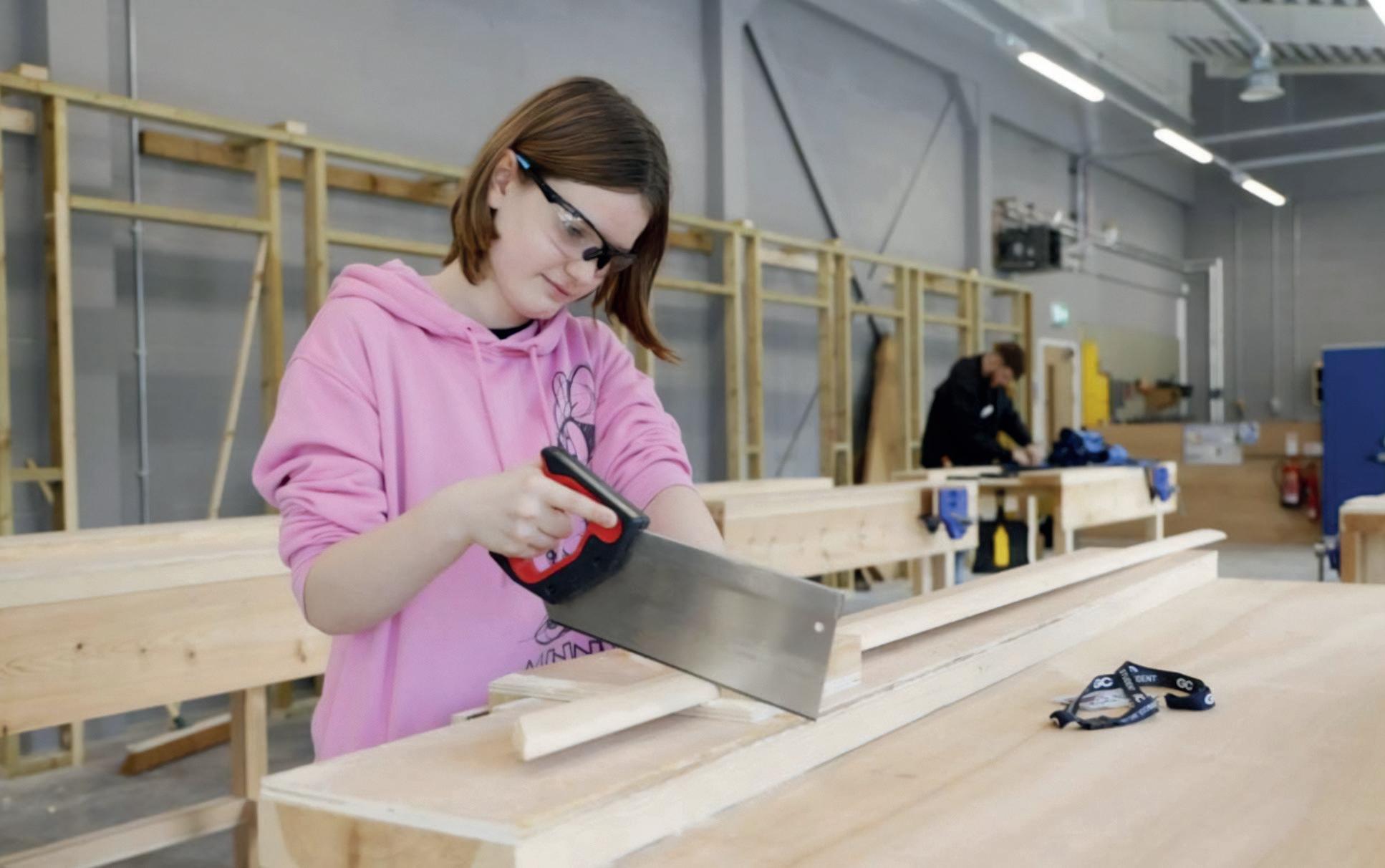
With the government prioritising the building of tens of thousands of new homes, the opening of a new construction training centre at Gloucestershire College’s Cheltenham Campus hasn’t come a moment too soon.
The opening of the new £5 million centre also means the college can teach all its construction subjects at its Cheltenham Campus.
The new construction training centre will play a pivotal role in addressing the increasing demand for skilled construction workers in the region, projected to reach 6,400 annually by 2025.
Training in electrical, plumbing and carpentry are o ered alongside courses in property maintenance, groundworks, design, surveying and planning, construction and the built environment.
Students will also be taught smart technologies, renewable energy systems, eco-friendly construction techniques, waste reduction and water conservation alongside sustainable design.
“Even before the centre opened, we were the largest provider of construction training in the county by a country mile”
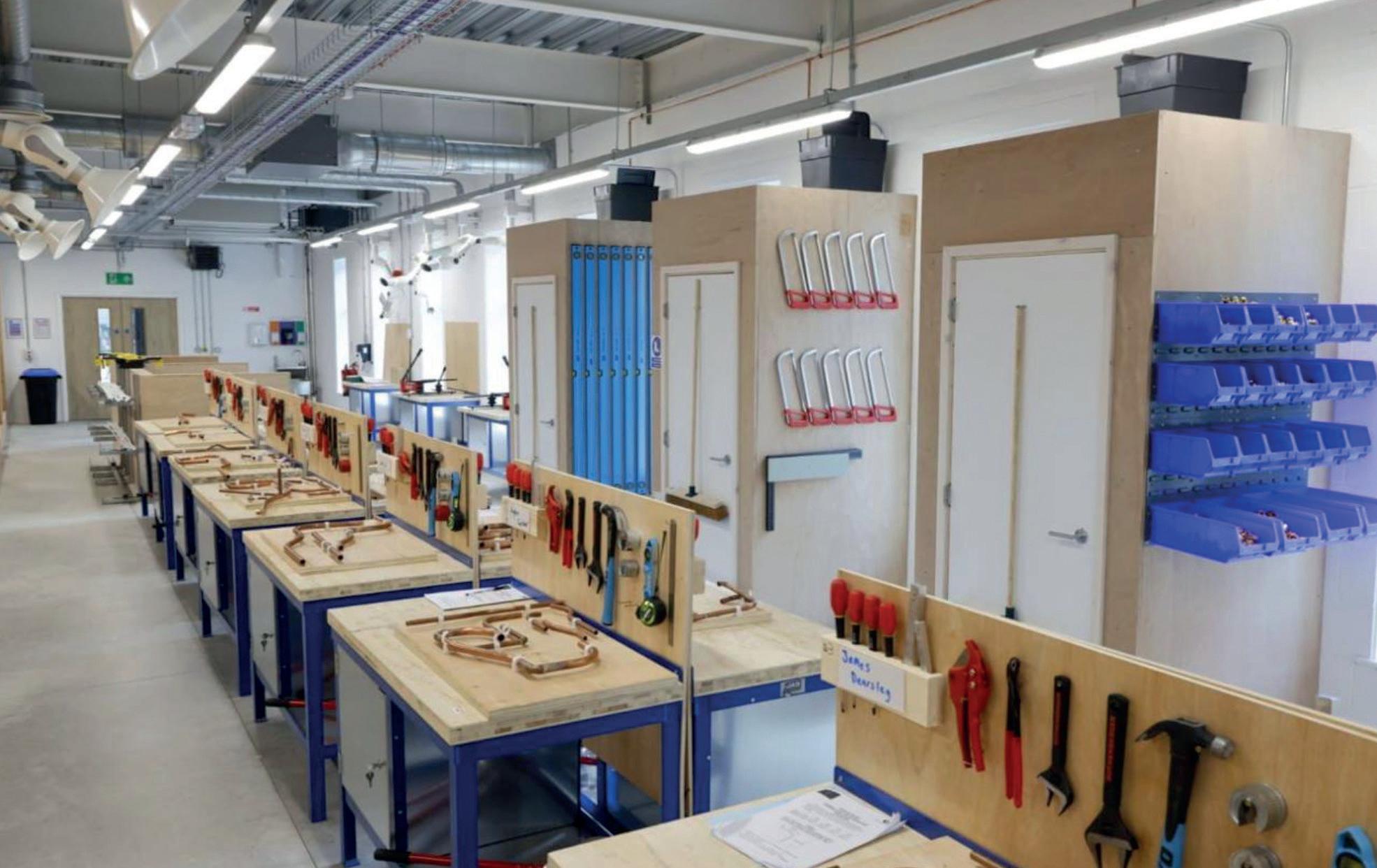
And the new building practices what it teaches. It uses air source heat pump technology for hot water and workshop heating systems, as well as e cient air conditioning systems to provide heat and cooling to classrooms. The building also benefits from high levels of insulation while the building’s electricity comes from the campus’s solar generation and battery storage facilities.
The building was designed by architects Roberts Limbrick and constructed by Beard Construction, using quantity surveyors Ward Williams Associates,
structural engineers Simpson Associates and fire consultants Helios.
The college secured £4 million of funding from the Department for Education, topping it up with £1 million from its own reserves.
Matthew Burgess, Principal and CEO of Gloucestershire College, said: "Even before the centre opened, we were the largest provider of construction training in the county by a country mile. It is the single largest occupational area in the college –and we cover a lot of areas.”
Bristol-based Airbus is to work with Weston College create a manufacturing, technology and skills centre at its Filton site.
This pioneering collaboration aims to bolster the aerospace and defence skills in the region, strengthening the South West as a hub for advanced manufacturing and technological innovation.
The new centre will serve as a focal point for education, training and skills development, leveraging the expertise of both Weston College and Airbus, along with other big employers in the region. The initiative is set to provide new
Young adults with special education needs and disabilities now have more choice about where they learn skills for adulthood thanks to funding from Worcestershire County Council.
Currently, many post-16 learners living in Worcestershire choose to study at National Star, the well-known and highly regarded specialist further education college near Cheltenham.
But that means students may have to travel up to 10 hours every week to access the specialist education and therapy that their education, health and care plan (EHCP) states they need to prepare for a life of independence.
Now Heart of Worcestershire College and National Star are set to transform the college’s St Wulstan’s Building in Deansway, Worcester into a teaching and therapeutic space for post-16 learners.
training facilities and industry-aligned programmes, ensuring that the local workforce is equipped with the necessary skills to meet the evolving demands of the aerospace and defence sectors.
Simon Galpin, Head of Airbus’s Filton Site, said: “What a privilege to be partnering with Weston College and the West of England Institute of Technology to enhance regional training for the aerospace and high value engineering sectors in North Bristol.”
Work started on site in Filton in September, with the first intake of students anticipated in the next academic year.
Mayor of the West Midlands, Richard Parker brought together senior representatives from major regional employers to address youth unemployment and the critical role key businesses can play in shaping the future for young people.
Businesses who attended the round table included HSBC, Balfour Beatty, Balfour Beatty VINCI, Seven Trent, Jaguar Land Rover, AtkinsRealis, Mitchells & Butlers, Berkeley Group and representatives from the NHS and BBC.
The mayor emphasised the importance of collective action. He said: “This is about more than just filling vacancies –it’s about creating fantastic employment opportunities for young people. We must equip them with skills that will land them a career with the industries of tomorrow.”
Students will enrol at the Heart of Worcestershire College, with National Star delivering teaching and learning.
Five young adults are set to start in September with the expectation that this number will increase to around 12 learners.
Cllr David Chambers, cabinet member for education at Worcestershire County Council, said: “We understand the challenges students face in travelling long distances to access specialised education and therapy. This will provide essential support to enable young learners to access local provision linked to the college campus to develop skills for an independent life.”
Michelle Dowse, principal and CEO at Heart of Worcestershire College, said: “This marks the beginning of a long and successful partnership.”
He pledged to create 20,000 work and training opportunities but said that the government needed to give further support to businesses.
During the roundtable, BBC Studios said was tackling the issue of unadvertised jobs in the freelance industry by developing a central repository of talent, aiming to create better visibility and opportunities for freelancers to connect with available work.
Paul Capper, Vocational Learning Manager at Mitchells & Butlers said: “We run a multi award-winning apprenticeship programme. As a company founded in the Midlands, we are committed to further developing these opportunities by working collectively with the Mayor of the West Midlands and other leading businesses.”
Dan He ernan, Strategic Social Value and Employment Lead at AtkinsRéalis, added: “As a major employer in the West Midlands, we have a vested interest and societal obligation to support our local communities in ensuring we play an active role in reducing youth unemployment, which is a vital part of driving economic growth in the region.”
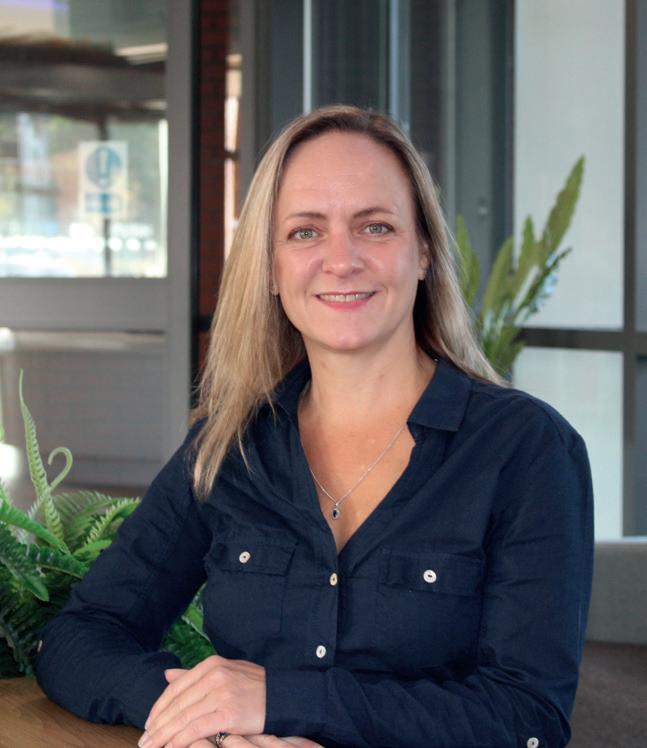
01 Business loans company appoints finance director
BCRS Business Loans, which provides business loans for small businesses in the West Midlands and Wales, has appointed Emma Leigh as finance director. Emma has run her own accountancy practice and worked as group financial controller at Barclaycard. More recently, she was group financial controller at water treatment firm Culligan Group.
02 Head of Business Development joins peer-to-peer lender
Peer-to-peer lending company
FOLK2FOLK, which has o ces in Gloucestershire and Cornwall, has appointed Carlos Howard as Head of Business Development. Carlos brings more than 20 years of experience in financial services, legal and manufacturing sectors.

03
Promotion for Laura at Cheltenham chartered surveyor
Cheltenham-based KBW Chartered Surveyors has promoted senior surveyor Laura Hatten to associate director. In her new role she will continue to provide advice to clients in commercial agency, lease advisory and valuation services.


04
Bristol architect attracts experienced head of studio
Bristol-based StudioHIVE Architects has appointed Matt Scott as its new director and head of studio. Matt joins the firm after a career in architecture, urban design and masterplanning with some of Bristol’s best-known firms.
05 Asbestos disease expert joins Humphreys & Co
Humphreys & Co, a law firm specialising in asbestos-related compensation claims, has appointed Rebecca Ryan to its asbestos claims team. Humphreys & Co specialises in handling mesothelioma, asbestosis, and other asbestos-related disease claims.
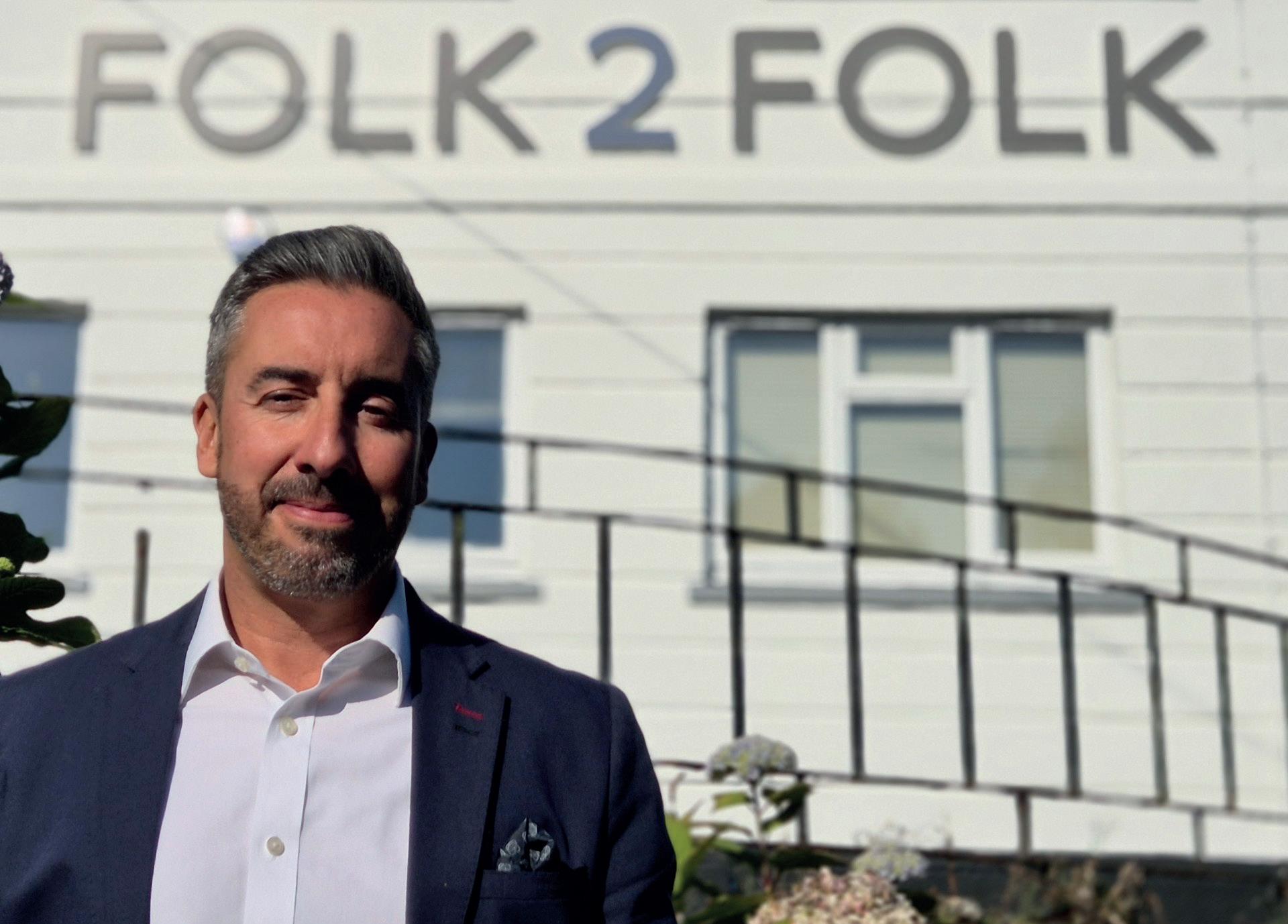



06 Time for a change at Bath finance provider
Specialist finance provider Time Finance has rearranged its senior team. The Bath-based business has made Steve Nichols (top) Managing Director of Asset Finance and Sharon Bryden (centre) has had her Group Head of Operations role expanded. Lorraine Neyland (bottom) is now Group Risk Director,
07 TechWM shakes up its Board
TechWM, the not-for-profit organisation driving tech innovation in the West Midlands, has a new Board. Jason Sahota, a seasoned technology and business leader and Private Equity Adviser is Chair. From left to right are: Naomi Nash, Head of Community & Collaboration, Jason Sahota, Board Chair, Anushka Malhotra, Head of Marketing, Katherine Fuller, COO, Emma Jones, Head of Events; Yiannis Maos MBE, Founder & CEO, Kim Leary, previous Board Chair.


08 Law firms welcome the next generation of lawyers in training
Worcestershire law firm mfg Solicitors has welcomed its 2024 trainee cohort. Joining the firm are Oscar McCracken, Emily Flory, Katie Johnson, Emily Stancer and Lauren Collins. All five have secured two-year training contracts. They follow last year’s cohort of trainees Molly Wall, Florence Fisher, Lucy Palmer, Sufyaan Aslim and Rachel Pick, who move into the final year of their training.
Graduates and trainees are welcomed at Shakespeare Martineau
Shakespeare Martineau, the law firm with o ces in Bristol, Stratford-upon-Avon and Southampton, has also welcomed its latest trainees and graduate apprentices: Freya Whiteside, Justin Clegg, Afrin Nanavatti, Jakub Mikulecky, Govind Johal, Jonah Cooke, Lisa Bauroth, Maria Sharpe, Rebecca Sault and Sinead Pow Emily Labbate and Eleanor White have enrolled in the firm’s SQE graduate apprenticeship programme.
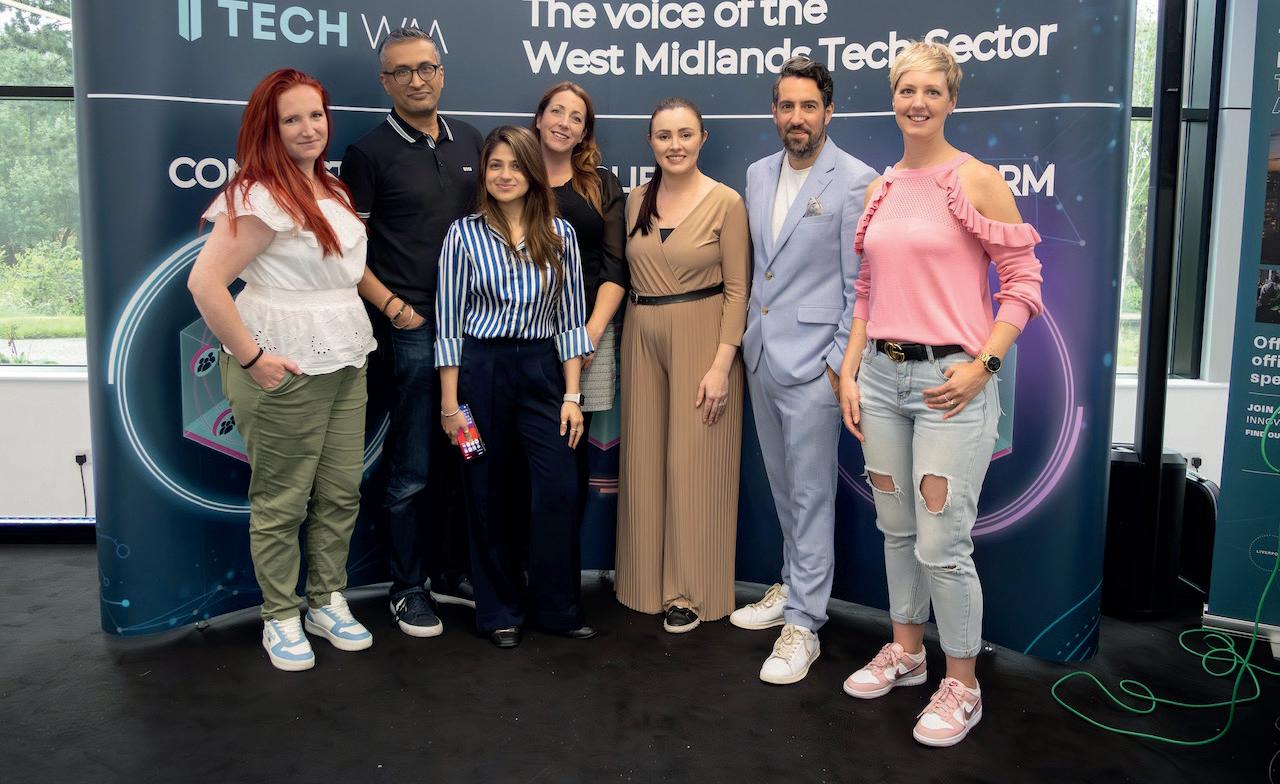


A £10m investment will help Anaphite work more closely with the world’s EV manufacturers





Anaphite, which has developed patented technology which could make the manufacture of batteries for electric vehicles 30 per cent less energy intensive and up to 40 per cent cheaper, has raised £10.4 million.
The investment will help scale-up and expand its in-house dry coating capability, and fully commission a plant with the capacity to deliver tonnes of the company's patented composite cathode material.
The company, launched in 2018 by chemist Sam Burrow, now Chief Technology O cer and physicist Alexander Hewitt, Chief Operating O cer, is already working with leading battery cell manufacturers and car manufacturers.
Delivered at scale by manufacturers worldwide, Anaphite's technology would reduce the consumer cost of EVs - helping to accelerate their global adoption and the transition to an eco-mobility future.
The funding was co-led by World Fund, Europe’s leading climate venture capital company and Maniv, a global early-stage venture capital company investing in the decarbonisation of transportation.
A cohort of top climate investors also joined, including EEI and Nesta, with further participation from existing investors Elbow Beach Capital and Wealth Club.
The fresh capital injection will also enable Anaphite to recruit more skilled people and invest further in research and development.

Improving batteries and making them cheaper to produce is a major manufacturing challenge. Anaphite has developed a unique chemical compositing process, delivering a proprietary "precursor powder" that ensures reliable dry coating for high speed, high performance electrode production.
Anaphite says its dry coating technology has the potential to save about 30 per cent of the energy usage and 15 per cent of factory floor space traditionally used in cell manufacturing -– reducing the cost and environmental impact of making a lithium-ion battery.
And by dramatically reducing the energy required for electrode manufacturing – up to 90 per cent it says – this technology will fundamentally alter the carbon profile of electric vehicles.
Anaphite started out as a student passion project for Sam and Alexander, who met at the University of Bristol. They initially worked on developing methods of homogeneously incorporating graphene into metal oxide composites, and soon identified lithium-ion batteries as an ideal application for their technology.
In 2018, the duo filed for their first patent, raised £60,000 in pre-seed funding and moved into Bristol incubator lab Science Creates to work on developing their process.
By 2021 they had applied their technology to lithium-ion battery cell electrodes, secured a further £2.7 million in seed and grant funding, and proved the application of their composites in dry coating feasibility trials with the University of Warwick.
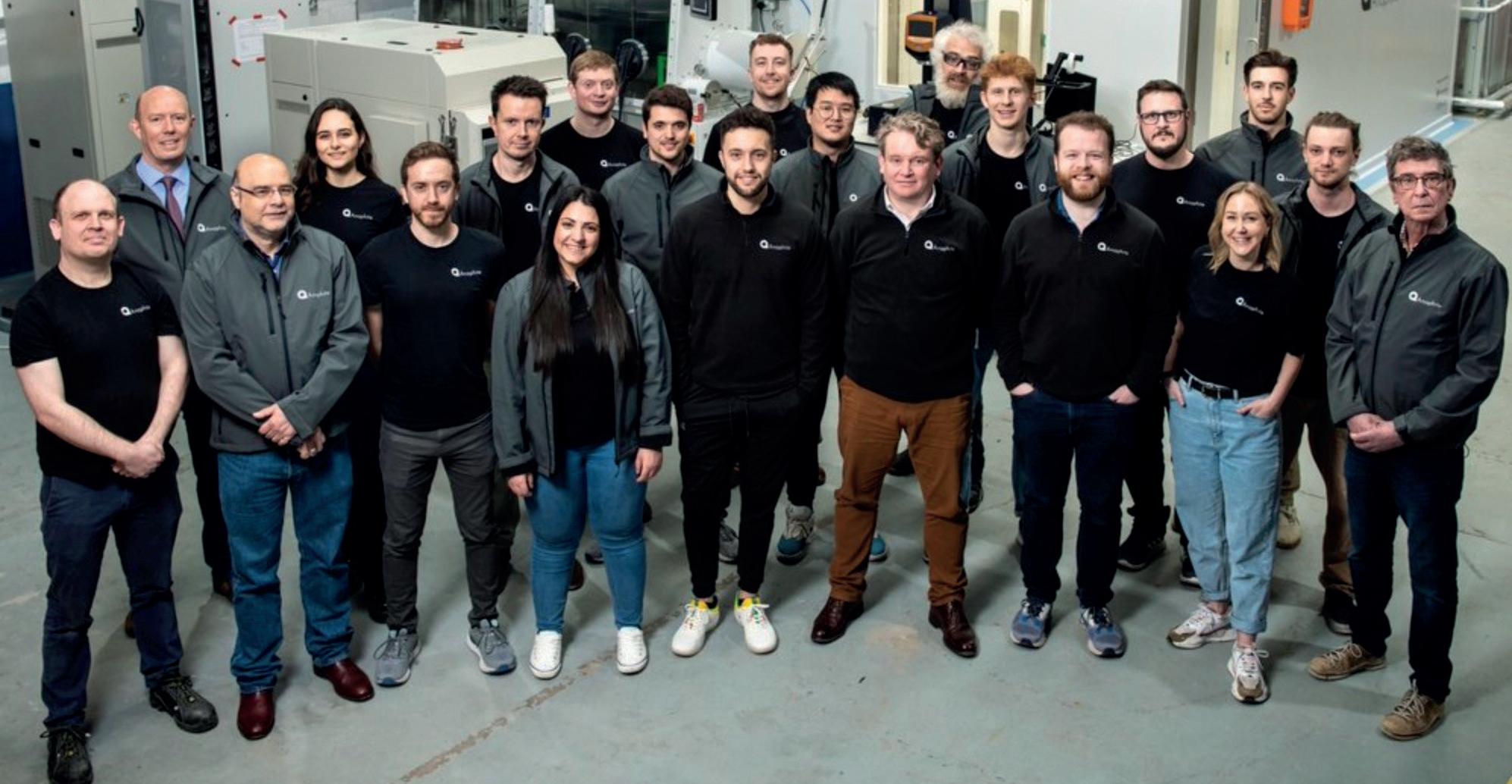

We have the opportunity to create the new global standard for EV battery electrode production, and there is a huge appetite for it
Following the close of another £4.1 million fundraise in 2022, the team hired experienced CEO and former Johnson Matthey commercial strategy director, Joe Stevenson.
Over the past 18 months, the company has commissioned pilot-scale manufacturing and pivoted to focus solely on the dry-coating of electrodes for lithium-ion cells.
Alexander said: “We have the opportunity to create the new global standard for EV battery electrode production and there is a huge appetite for it. Our technology has the power to revolutionise the electrode production process while lowering costs and emissions for EV and cell manufacturers, and we can't wait to see it in action.”
Anaphite CEO, Joe Stevenson, said: "Securing capital from investors that are renowned specialists in mobility, energy and environmental investment around the world, is a huge validation moment for Anaphite, and a ords us the resources to extend our technical lead in the market.
“We are thrilled that transportation expert Michael Grano has joined the company’s board, and that we are EEI's first UK-based investment.”
Sam added: “Our unique approach and technology portfolio give the EV supply chain the flexibility it needs, removing many barriers to high-yield manufacturing and battery design. It’s exciting to be applying chemistry to such a meaningful manufacturing challenge”
Trailblazing technology celebrates 20 years of Tech-Expo in Bristol

Sixteen start-ups showcased their innovations to more than 150 business leaders and investors in Bristol at the 20th anniversary of the Tech-Xpo awards, organised by SETSquared Bristol.
The winner was Metasonixx. Founded in 2019 as a spin-out from the universities of Sussex and Bristol, Metasonixx engineers advanced materials for sound and noise management. Its patented technology allows the team to re-engineer standard materials (such as metal, plastic, wood and paper) into products that block noise, while letting air and light through if desired.
Other new businesses at the event included:
Amutri: a team of software developers and 3D visualisation experts have created what they claim is the fastest and only end-to-end solution that transforms complex product design data into immersive 3D experiences.
Mapstack: turns data into amazing visual maps, revealing hidden patterns which helps decision making.
mycopilot.ai: helps users create healthier digital habits, with real-time support. Built for ADHD, it will also help anyone struggling with our distracting digital world.
Taught by Humans: introduces DOT-ed, a platform that personalises an individual's AI
and data learning journey. It o ers tailored learning paths, expert guidance and support.
WAVESIX: an app that tracks six key aspects of a person's lifestyle. It aims to o er powerful insights on what’s having a positive or negative impact on our health and happiness, helping a user take charge of their own wellbeing.
APS: innovating microbial fuel cells to address harmful algal blooms and generate bioenergy.
Platipus: making high performance and AI-enabled semiconductors to secure electronic systems
Airway Medical: developing new medical devices that are sustainable and easier to use. It is estimated more than million people in the UK struggle to clear their airways due to the e ects of stroke, chronic congenital, neurological and respiratory conditions. This causes oral hygiene issues and can mean hospital admission due to acquired pneumonia.







Airway Medical’s headline product, CAMSU, clears airways of excess saliva and sputum using mechanical suction. CAMSU can be used by anyone, anywhere, anytime.











Lovely Pubs Group (Warwickshire)

has been acquired by Fuller’s (London)
Software provider Govtech (Gloucestershire)

has been acquired by Software provider Netcall (Bedfordshire)
Sellside advisers include CapEQ (M&A), Freeths (legal)
Pump engineering firm PDAS (Surrey)

has been acquired by Pump Supplies (Gloucestershire)

have been acquired by EARNZ PLC (London)
Buyside advisers include BPE Solicitors, haysmacintyre, Bryan Cave Leighton Paisner
Software provider Fuelsoft (West Midlands)

has been acquired by Rose Street Partners (Bristol)
Buyside advisers include Freeths

has been acquired by Building tech provider Johnson Controls (Ireland)
Buyside advisers include Forvis Mazars, Eversheds Sutherland Sellside advisers include Crowe, Higgs LLP
Recruiter Consult Energy (West Midlands)

has been acquired by Recruiter VIQU (West Midlands)

has been acquired by Dealmaker GS Verde Group (Bristol)
Geothermal division of ADP Group (Gloucestershire)

Sellside advisers include KBS Corporate has been acquired by Clean energy tech firm Rendesco (Gloucestershire)

Calleva Nutrition (Somerset)

has been acquired by Nutraceuticals group Wellma (Sweden)
Sellside advisers include Westcotts Chartered Accountants
Pharmaceutical firm Vectura Group (Wiltshire)

has been acquired by Electronics group Molex (US)
Financial
Orca Financial Group (Ireland)

have been acquired by Insurance firm NFP (West Midlands)
Mill Marina (Warwickshire)

has been acquired by Waterways contractor The Rothen Group (Warwickshire)
Food ingredients manufacturer Plant-Ex (Bristol)

has received investment from BGF (London)
Buyside advisers include Osborne Clarke
Auto testing manufacturer BOLAB Systems (Germany)

has been acquired by Auto testing manufacturer AB Dynamics (Wiltshire)
Air Movement Supplies (Ireland)

has been acquired by Fan manufacturer Elta Group (West Midlands)
IT provider Colbek Systems (Warwickshire)

has been acquired by IT provider Flotek Group (Wales)
Engineering consultancy Clarkebond (Bristol)

has been acquired by Independent Design House (Bristol)

We take a detailed look at transactions which have taken place over the past two months
Marlboro cigarettes owner Philip Morris International has sold Vectura Group, the Chippenham-based manufacturer of inhaled medicines and inhalers, for an upfront cash consideration of £150 million.
American electronics group Molex will absorb Vectura into its pharmaceutical subsidiary Phillips Medisize. It is o ering potential deferred payments of up to £148 million, bringing the total deal value to just under £300 million. Philip Morris bought Vectura in 2021 in a deal worth more than £1 billion.
Jacek Olczak, CEO of Philip Morris, said: “Phillips Medisize is best placed to lead Vectura into the future while releasing it from the unreasonable burden of external constraints and criticism related to our ownership.”
The tobacco giant was criticised by many for its acquistion which was seen as hypocritical, but Philip Morris said Vectura had been “instrumental in kickstarting” development of inhaled therapeutics, bringing to the company specialist knowledge, technologies and formulation science.
“However, despite the investment and commitment to developing products and therapies vital to patients, unwarranted opposition to Philip Morris’s transformation has impacted Vectura’s scientific engagement and commercial relationships,” the company said.









Crowe advises on sale of Droitwich-based Password


US building technology services business Johnson Controls has acquired Password Services, a heating, ventilating and air conditioning company.
Established in 1998 and based at Ryelands Business Centre in Droitwich, Password Services specialises in rooftop aircon for the hospitality sector.
It’s been a distributor and partner for equipment brand YORK for more than two decades.
Corporate finance partner Andy Kay and associate director Jason Daft from accountancy firm Crowe advised shareholders Richard Schlanker, Alison Adams and Elaine Tovey on the sale to Johnson Controls.
Richard said: “We are thrilled to be o cially




joining the Johnson Controls family. This is a great opportunity to build on what we have achieved over the last 25 years.”
Andy and Jason teamed up with Richard Gri ths at Higgs LLP in Brierley Hill to conclude the transaction.
Crowe’s role involved identifying and approaching acquirers, negotiating and executing the deal, while Higgs provided full sellside legal support to the shareholders.
Andy added: “We were very pleased to advise and be able to complete a deal for the shareholders of Password Services working alongside Richard and his team at Higgs.”
Accountants Forvis Mazars and law firm Eversheds acted for Johnson Controls.

Bridgwater-based, Calleva which develops and manufactures nutraceutical ingredients and products in liquid and powder form, has merged with Swedish nutraceuticals and pharmaceuticals group Wellma in a multi-million-pound transaction.
Though Wellma already has a broad presence throughout Europe, this marks the company’s first UK acquisition.
Calleva will now provide its expertise in formulations, sourcing, taste profiles and manufacturing standards to the group.
Will Mudd, corporate finance director at Westcotts Chartered Accountants, helped to lead the advisory team for Calleva, managing the entire transaction through to completion.
He said: “It’s not often that a deal evolves which so perfectly aligns the interests of all parties.
“The Calleva team are very high calibre and will be a huge asset to Wellma and the wider European group.
“The exciting growth and expansion plans are another great example of why the South West is a great place to do business.”
Ed Ryle, CEO of Calleva, added: “Westcotts displayed very strong technical skills and were able to explain complex issues in clear, unambiguous terms.
“Will led the team very well and displayed strong negotiation skills. He thought on his feet and was invaluable in ensuring that deal terms were maintained and indeed improved.”
EARNZ PLC has acquired two companies from the energy services sector – Cosgrove & Drew and South West Heating Services Ltd –in a reverse takeover.
Cosgrove & Drew is a Bristol-based asset and energy support services company which focuses on two key services – major mechanical engineering projects predominantly for the public sector, and facilities management.
South West Heating Services Ltd in Cheltenham provides heating and installation maintenance services largely for domestic insurance claims, while also o ering its services directly to domestic households.
Both are now under the remit of EARNZ PLC, listed on the AIM market of the London Stock Exchange.
The transaction required a crossteam e ort from Gloucestershire’s BPE Solicitors, with involvement from the firm’s corporate and commercial, employment and commercial property departments.
Corporate partner Anthony Rudge led the advisory team, working alongside Kathryn King, Laurence Twiselton, Joley Croft and Alexander Baugh.
Anthony said: “As always, finding the middle ground between an acquiror’s intentions and a seller’s expectations is never an easy path to tread.
“This often involves reconciling
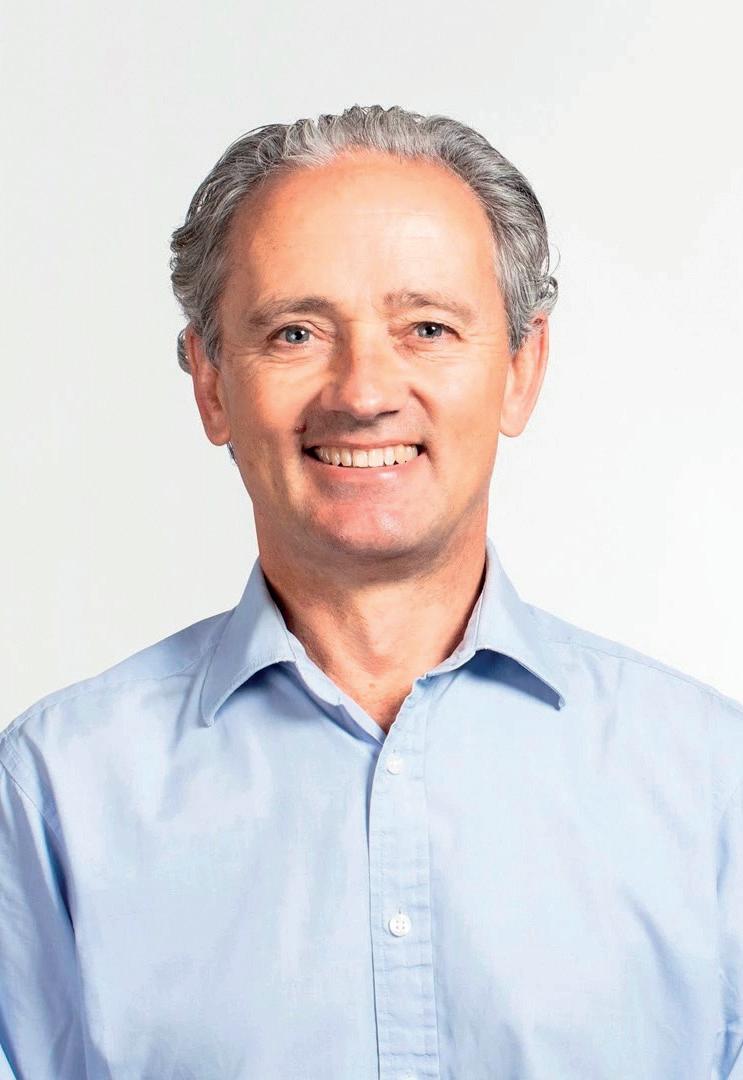

slightly disparate views in order to find a way forward.
“It’s been a pleasure to support EARNZ PLC on these acquisitions, which represent the first step in their corporate objective to grow and develop sustainable businesses.”
Bob Holt stepped in to manage the firm in February 2024 with a view to acquiring or investing in companies in the energy, advisory, regeneration and net zero industries.
Bob added: “BPE are a long-term trusted adviser, and I knew that they’d do a fantastic job for EARNZ PLC.
“As directors, we believe that this sector presents some exciting commercial opportunities that will ultimately deliver positive shareholder value.
“I’m looking forward to seeing what the future brings for us all.”







To view the full list of 250 companies scan the QR code or visit: thebusinessmagazine.co.uk/business-ranking/south-west-250/
Metro Bank works with key partners to open up funding opportunities for small and medium-sized companies.
The relationship between a business and its bank can be one of its most valuable assets and while it may not register its worth on a balance sheet, it can prove invaluable in helping firms navigate the ups and downs of the business world.
We spoke to David Clegg, Founding Partner and Head of Client Relations at AMS Group and Mark Davies, Director of Commercial Banking at Metro Bank about how companies can best access funding.
Corporate Finance, Debt Advisory, Business Recovery and HMRC dispute resolution.
Is it not hard for companies to get money from banks?
David Clegg: "It comes down to how you package the deal and your relationship with the bank. We make sure that we put the client's best foot forward in terms of what that funding proposition looks like.
Managers who have deep knowledge of the areas that they work in."
What is di erent about Metro Bank?
Mark Davies: "Our point of di erence is relationship management and taking the time to listen to the customer and their advisors. We work with David and the team to help them achieve what they want from the transaction.




Manchester-based AMS Group works closely with Metro Bank to introduce customers who are looking for funds to grow their business, refinance debt or assist with succession planning.
Metro Bank is a relationship banking specialist and has a presence across England and Wales with a substantial presence in the South East.
AMS Group, established in 1982, is a national full-service professional services firm specialising in creating value for mid-market companies. Di erentiating themselves by investing in client relationships through Relationship Managers, personality-profiled to each client.
Their award-winning teams deliver services across Audit, Accounting, Tax Advisory,
"You've got to have a bank that's got the appetite to get money out of the door and Metro Bank certainly is that bank at this moment in time."
How does the process work?
David Clegg: "We recently completed a £7m deal with one of our clients in the healthcare sector, the success of this was down to our strong partnership with Metro Bank who understand and are active in that area.
"Business Development Director at Metro Bank Danny Pennington, worked closely with Ali Raza, Debt Advisory Direct at AMS Group to structure the deal and engage with the client.”
Mark Davies added: "We brought the full resources of Metro Bank to this transaction including our healthcare specialist who worked closely with Ali and Danny to find the right solution for the client. Members of our Corporate Finance team and a debt advisory specialist also worked on the transaction to fully understand the client’s business and needs.
"One of our strengths at Metro Bank is having sector specialists, including healthcare, as well as local Relationship
"Our business is evolving to best face the market correctly and making sure that we've got local Relationship Managers who understand those local markets."
David Clegg: “We operate in the midmarket and often find that this segment is underserviced in terms of advisory capability from a debt and growth perspective. Clients at this level want a relationship-based approach to their banking. When the clients come to us, they trust us to act in their best interests and we ensure that we place them with a bank that shares the same ambition as they do. It's incredibly important because we need to know that the bank is going to look after our client.
"This trust underpins the relationship with AMS Group and Metro Bank.”
What feedback do you get from clients?
Mark Davies: "They like the fact that we are pragmatic, and more importantly, they like the fact that we have got an appetite to lend money. We like to think that our relationship approach is centred around taking the time to listen. We value honesty and aim to be seen as a trusted partner throughout the process."
To find out what funding opportunities Metro Bank can o er your business, visit metrobankonline.co.uk/commercial-referrals
Lending is subject to eligibility criteria, terms and conditions apply.

632,756 UK businesses are in ‘significant’ financial distress, up 5.1 per cent on the prior quarter (Q2 2024: 601,950) and 32.3 per cent higher than Q3 2023 (478,176)
Significant’ financial distress increased in 21 of the 22 sectors covered by Red Flag Alert in Q3 2024 versus Q2 2024
In Q3 2024 ‘significant’ financial distress rose particularly rapidly in Utilities (+19.3 per cent), Food & Drug Retailers (+10.4 per cent), Financial Services (+9.94 per cent) and Bars & Restaurants (+8.7 per cent)
The number of businesses in ‘critical’ financial distress fell quarter on quarter by 23.2 per cent to 31,201 in Q3 2024 (Q2 2024: 40,613), 17.3 per cent lower than Q3 2023 (37,772)
This trend was seen in the Hotels & Accommodation (-33.5 per cent), Construction (-28.5 per cent) and Real Estate & Property Services sectors (-26.5 per cent), in particular, with all experiencing a reduction in ‘critical’ financial distress versus Q2 2024.
The sectors experiencing the highest numbers of companies in ‘critical’ financial distress were Support Services (4,860), Construction (4,324) and Real Estate & Property Services (4,099).

The latest “Red Flag Alert” research from leading UK advisory firm Begbies Traynor, which has provided a snapshot of British corporate health for almost two decades, highlights the challenging conditions UK businesses continue to face, with the number of companies facing ‘significant’ financial distress up around five per cent in Q3 2024 to 632,756 businesses (Q2 2024: 601,950).
The steady increase in companies experiencing ‘significant’ financial distress was driven by noticeable increases in distress in the Utilities (+19.3 per cent), Food & Drug Retailers (+10.4 per cent), Financial Services (+9.94 per cent) and Bars & Restaurants (+8.7 per cent) sectors.
With 21 of the 22 sectors monitored by Red Flag Alert reporting the level of ‘significant’ financial distress increasing in Q3 2024 versus the prior quarter, the latest data highlights how the heightened level of economic uncertainty is impacting businesses in almost every corner of the economy across the UK and pushing another 30,000 companies into financial distress.
Julie Palmer, Partner at Begbies Traynor, said: “With the end of the year now in sight, many British companies must be looking ahead to the finish line with a cautious degree of optimism for what 2025 has to o er after a di cult year. So far 2024 has
been hard to navigate for companies and the final quarter looks no di erent as a high degree of uncertainty weighs on the UK economy.
“With over 630,000 firms now in significant financial distress, more than thirty per cent higher than this time last year, no section of the country’s economy is immune from the legacy debt built up by many businesses during the pandemic.
“It is also apparent that the toxic e ect of high inflation is still filtering down to businesses. The construction sector in particular continues to struggle with the legacy of high materials and labour inflation which have led to some highprofile insolvencies recently. This is a trend that I expect to continue, and I do not believe ISG will be the only major casualty in this sector with the domino e ect likely to hit the sub-contractor community in due course.
“For some, the prospect of a change of government was viewed as a potential catalyst for a much-needed economic boost, but there are significant concerns surrounding what the next Budget might hold for the economy and the knockon e ect could be damaging for many businesses teetering on the edge of collapse, as it seems certain many will have to deal with higher employee-related taxes.

Ric Traynor, Executive Chairman of Begbies Traynor, added: “As we move into the final quarter of 2024, the decline we have seen in ‘critical’ financial distress is a welcome surprise after a challenging year. That said, it is too early to say if this is a trend that will continue into the autumn – traditionally a busy period for corporate insolvencies.
“The government’s Employment Rights Bill could make it more di cult and more expensive to employ sta
“Companies must also contend with geopolitical risks that could derail any domestic policy, including conflict in the Middle East, which could at the very least result in a spike in energy prices and bring back the spectre of high inflation. Added to this is the upcoming election in the US, which has the potential to impact both foreign and economic policy.
“Against this backdrop, the only certainty is uncertainty, and we know this is bad for both business and investment alike. It is clear that the UK economy is far from being out of the woods.”
Begbies Traynor’s Red Flag Alert has been measuring and reporting corporate financial distress since 2004. It has become a benchmark on the underlying health of companies across every sector and region of the UK.
Red Flag Alert’s algorithm measures corporate distress signals, drawing on company accounts and factual, legal and financial data from a wide range of relevant sources, including intelligence from the UK’s leading insolvency business, Begbies Traynor.
Companies are measured against a new scorecard of indicators to give greater insight and accuracy into the health of businesses. Two years of work by data scientists analysing eight years of data, taking into consideration pre, during and post-pandemic insights to find signals and patterns indicating businesses in distress, combined with AI tools, means that Red Flag Alert aims soon to be able to predict how many companies in trouble will go on to fail.



up
By Stephen Emerson, Managing Editor
The prospects for the region’s wealth management sector are delicately balanced with the promises of lower interest rates countered with domestic pressures and international turmoil.
However, as any wealth manager will tell you, there are opportunities out there during any period of economic uncertainty – you just have to know where to look.
Those who contributed to this feature say there are seismic changes happening in the marketplace with investments in private equity, private markets and property normally reserved for the few, opening to a broader spectrum of investors.
Technology, as in other sectors throughout the economy, continues to drive change and the wealth management sector is no di erent.
The Private Equity industry has been one of the shining lights of the UK economy in recent years, however access to the returns that it generates has been limited mainly to institutional investors.
Justin Bates, Head of UK Research at independent, full-service financial services firm Canaccord Genuity, says that this situation is changing and points to the

announcement in September by Swissbased private equity firm Partners Group and US investment company Blackrock that a change in the market is on the way.
BlackRock and Partners Group have struck a deal to o er access to portfolios containing private equity, private credit and real estate funds to wealth managers and retail investors.
Justin said: "Retail investors have never really been able to directly participate in private equity markets.
"That's been a source of some frustration not just to clients but to fund managers, private equity fund managers as well.
"For many years they've been considering how best to access the retail market."
There has also been a strategy shift in recent years across the wealth management industry, away from the sole pursuit of growth towards preservation.
This pivot has been driven by instability in the markets due to conflicts in the Middle East and Ukraine, and soaring interest rates following the pandemic.
Labour's first budget, announced after this magazine had gone to press, looks set to
cement this change with expected rises in capital gains tax, inheritance tax with carried interest on private equity profits also under scrutiny.
A poll by Bristol-headquartered financial services company Hargreaves Lansdown surveyed basic and higher rate taxpayers and found increases in inheritance levies and capital gains taxes are among the top five budget fears.
Hargreaves Lansdown's Head of Retirement Analysis, Helen Morrissey, said: “Almost one in 10 are concerned about losing inheritance tax allowances or exemptions.
“This includes things that keep millions of estates from facing tax – like the nil rate bands that mean the first £325,000 of your estate, and £175,000 of property, can be left tax free — if the home is being left to a child or grandchild.
“Some seven per cent of higher-rate taxpayers are worried about higher rates of Capital Gains Tax, which is payable on profits from investments.
“The concern is that rates could rise from 10 per cent for basic rate taxpayers — 18 per cent on property — and 20 per cent for higher and additional rate taxpayers — 24 per cent on property — to match their income tax rates of 20 per cent, 40 per cent and 45 per cent.”
Technology has had a democratising e ect on the wealth management industry with Hargreaves Lansdown and investment platform AJ Bell empowering retail investors.
Their platforms have enabled retail investors to access a range of asset classes while generated AI applications are equipping investors with a wealth of investment information.
Does technology, therefore, pose a
threat to those working in the wealth management industry?
A survey of independent financial advisers (IFAs) and wealth managers by asset manager Schroders, found that 76 per cent think the development of AI applications such as ChatGPT actually represents an opportunity rather than a threat to their business, up from 57 per cent a year ago.
Justin Bates of Canaccord Genuity said the industry had been pushing to upgrade
its customer-facing systems. He said: "Traditional wealth managers would sit down with their clients once or twice a year and provide them with a quarterly update on paper.
"The entire wealth management industry has been making investments into their systems over the last five to 10 years.
“These will get them into a position where they can allow their clients to see the value of their portfolios in real time."

Investing in property has traditionally been seen as a good hedge against inflation and a means of not only preserving but growing capital.
However, one of the main means of investing in property, through open ended property funds, has seen patchy performance in recent years.
Many property investment funds suspended outflows for periods, notably
We have seen news stories over the years about asset managers gating their property funds when times are tough ...
around Brexit and the pandemic, which in turn has dented investor confidence.
The Financial Conduct Authority (FCA) is exploring new regulation to reform open-ended property funds that could tie investors in for longer.
Justin Bates of Cannacord Genuity said: "We have seen news stories over the years about asset managers gating their property funds when times are
tough so people can't sell and get their money out.
"That is a terrible situation for anyone to be in and we, as an industry, need to be able to overcome that as an issue because otherwise who is going to invest in property funds?
"It's happened in the last two cycles and we need to try and prevent that from happening again."
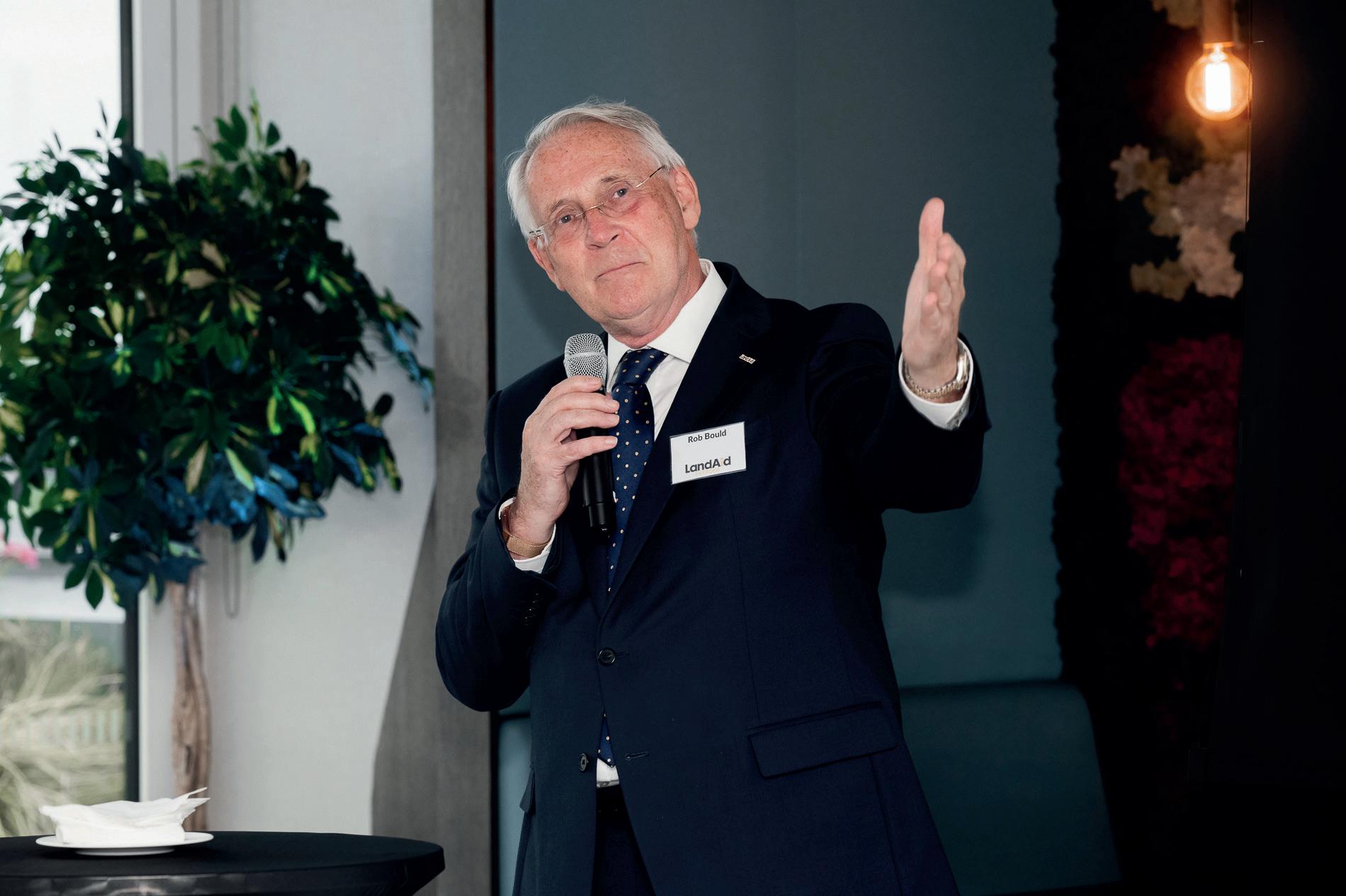

How would you like to invest in a piece of Wembley or The Shard? If this appeals to you from an emotional or pragmatic viewpoint, then you may not have to wait too long to be able to own a share in some of the country's most iconic buildings.
London-based real estate investment company Martley Capital Group is working with the Aquis Exchange to establish a new segment of the Aquis Stock Exchange Growth Market dedicated to real asset backed investments.
The Aquis Stock Exchange (AQSE) is one of only two recognised investment exchanges for equities in the UK. It is regulated by the FCA.
The Aquis Real Asset Market (Aram) is
expected to launch early next year and will be open to companies owning commercial and residential real estate and other real estate assets including infrastructure, land and forestry.
Rob Bould is working as a consultant for Martley Capital on the project, having previously served as adviser for the now closed International Property Securities Exchange (IPSX), which operated as the UK's first standalone real estate property exchange.
IPSX launched in 2019 to enable the listing of commercial properties, with the idea that owners could realise some of their investment without a refinancing or a sale and leaseback. But it only attracted three listings – all linked to one of the
founding IPSX shareholders, M7 Real Estate. There were also wholesale listings not open to retail investors. The exchange closed last year after failing to find new investment.
Rob explained the key di erential between the new Aquis-based exchange and IPSX.
He said: "The di erence between this version and IPSX is the fact that it's going to be running on Aquis.
"Although IPSX tried very hard, it didn't have connectivity with the main retail platforms.
"Aquis already has that connectivity and the team have worked hard on getting this connectivity to the real estate investor."
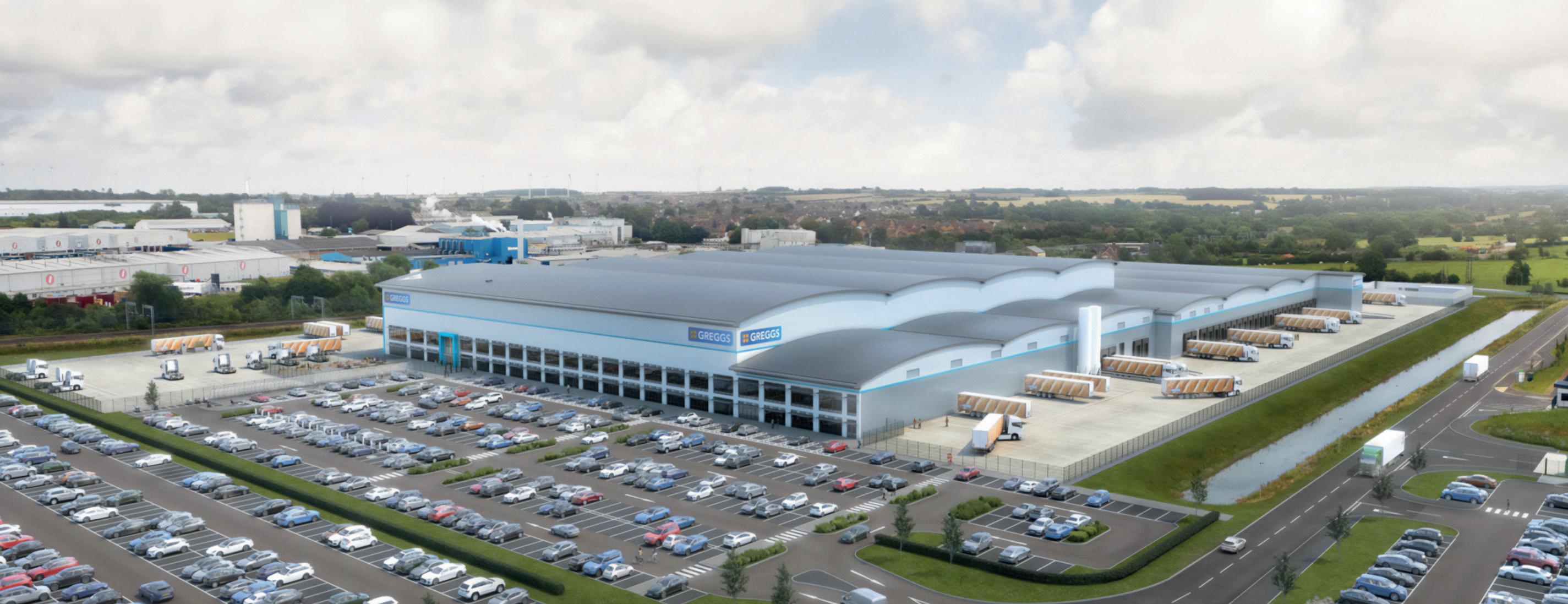
We're in the process of encouraging the issuers to invest and to prepare admission documents for an IPO, then private investors will be able to buy shares
The 2007 Labour government encouraged private investors to invest in property through the establishment of Real Estate Investment Trusts (REITs).
The move attracted investment mainly from large institutions and bolstered the fortunes of some of the biggest players in today’s property market including SEGRO (Slough Estates), British Land and LandSec.
Today, however, the entire REIT section of the main London Stock Exchange, is only 2.6 per cent of its entire make up.
Rob said that the weight of regulation required to set up a public listed company and become a REIT, coupled with current limited returns, were two reasons REITs were failing to gain traction with retail investors.
“The existing stock exchange for real assets and retail investors does not really work. We see a need for a dedicated market just for real assets, isolated from the fluctuations of the main London exchange.”
While the IPSX failed, Martley Capital saw value in the concept and entered into a license agreement with the Aquis Exchange to launch a new platform.
Rob Bould said: “We have a pipeline of real assets including infrastructure that will be traded on Aram.”
He added: “We’re in the process of encouraging the issuers to prepare admission documents for an IPO, then private investors will be able to buy shares.
“We hope that interest rates are heading in one direction and Aram will provide another option for investors to receive income and a share of a recognisable real asset.”
Rob says that investors are attracted to the concept by the returns o ered in comparison to the bond market, the diversification opportunities it o ers and the inflationary-proof nature of property.
He said: "If we use gilts as an example, which are sub four per cent now, and you can get two or three per cent above that, then that's a very attractive proposition going forward."
"Historically, real estate has also been a very good hedge against inflation. Now we're down to 2.2 per cent but we've also seen it hit 12 per cent in the last three years.”
Rob said that the platform may also be of interest to family o ces looking to free up some liquidity in their assets.
He said: “A lot of family o ces are second, third, fourth generation. A number of those
people who have shares in those family o ces are saying, ‘I’m locked into this, we haven’t got a structure that we can use to raise money’.
“If they’re a fourth generation, by using a public market structure, you can leave control of the family o ce where it should be, but give liquidity and flexibility to some of those beneficiaries.”
Aram would also appeal, Rob said, to owners of buildings that did want to o oad their asset in its entirety.
“Many owners don’t want to sell completely but they do like the idea of diversifying their holdings, he added.
“If they have a market where they can pick a percentage and sell to that market then that is very interesting to them especially if it gives them access to retail investors.”
Rob added that Aram also aligned with the growing trend of people wanting more involvement in their own portfolios.
“People are increasingly wanting more control over their portfolios while at the same having the balance of an adviser in place.
“Aram fits well into this market and could provide sensible returns. Wouldn’t it be nice to have a share of Wembley or a bit of the Shard?”
Maya

Maya Prabhu of JP Morgan Private Bank says that a founder’s business journey does not end when they sell
Entrepreneurs put their heart and soul into getting their business o the ground, building it into a profitable entity and then navigating an exit.
The financial and emotional investment, which is also shared with their families, is one reason why a long-term plan to help them achieve the goals for their acquired wealth is vital, according to Maya Prabhu of JP Morgan Private Bank.
Maya, who leads the bank’s domestic market in the UK, said: “Many entrepreneurs create their own wealth rather than coming from wealthy backgrounds.
“They have taken enormous risks to get to where they are, and their partners have also been through this journey.
“Along the way or after an exit, they perhaps want to take some capital o the table.
“Perhaps as a reward for their hard work, to ensure their own financial security and often to secure their children’s future.”
Entrepreneurs should have clear goals, according to Maya, and an investment plan
can help to deliver those goals, whether it is preserving or growing wealth, donating to charity or investing in new businesses.
She said: “The most important question to consider -‘what is this money for?’
“Markets will go up and come down. There will be short-term movements.
“That is all to be expected, especially in the fragile world that we are in at the moment.
“It’s key to have your long-term goals as an anchor to guide you when navigating those risks and opportunities.”
With goals set, says Maya, entrepreneurs need a plan to achieve them, with diverse asset allocation being key.
She said: “When entrepreneurs sell their business, they need to consider their longterm goals and allocate their funds based on that vision.
“The right asset allocation can holistically accomplish all their objectives rather than
a silo-approach of choosing between preservation or growth.”
After exiting a business they have built up, many entrepreneurs want to remain involved in the business world by investing in start-ups to help them to reach their potential and support them along their journey.
Maya said: “We see that with a lot of entrepreneurs because they love the idea of championing new businesses.
“They see this an opportunity to support the entrepreneurial ecosystem.”
Having a diverse portfolio is key to achieving wealth goals, according to Maya, who said that diversification can help mitigate risk in an increasingly dynamic and complex landscape.
She said: “In an age of heightened political and economic uncertainty, investors are seeking benefit from geographically diversified portfolios.
“People want exposure to markets around the world and turn to JP Morgan because


we have unparalleled access and deep knowledge in a broad range of asset classes and markets.”
Maya also said that JP Morgan was seeing growing interest in alternative investments.
She stressed, however, the value of gaining advice to navigate the complexity of this landscape.
She said: “We have a very robust alternatives platform to support our clients, with more investors wanting to add this to their portfolios.
“Investors are looking for ways to diversify their portfolio outside the traditional landscape, with the alternatives helping achieve them greater additional returns.
“This universe has become very broad, with more than 18,000 private investment funds and 9,000 hedge funds.
“We have dedicated teams with decades of experiences that look across this universe to identify opportunities which align with our clients’ goals.”
Maya said that, sector wise, technology companies and those focused on the health sector were attracting investment.
There is much greater interest in private markets now. Exposure to private markets is part of the advice that we give to clients especially to provide long-term growth and preservation
She said: “We are seeing a lot of investment activity around AI-powered companies and health.”
Sustainability was also proving to be a popular investment choice for entrepreneurs, said Maya, who added that the green economy was an interesting growth area.
She said: “When you think about the themes that people are investing in, these are the trends and growth opportunities.
“These include the green economy, sustainable investing and clean energy.
“The next generation in their twenties and thirties are very interested in these areas.
“They are starting to think about the family’s wealth in the long term, and how their financial wealth plan can encompass their values.
“They have a great interest in these areas not only from a value point of view but from an opportunity point of view as well.”
Some of JP Morgan Private Bank’s clients are interested in meeting early stage companies.
Oxford and Cambridge have become incubators for life sciences and deep tech start-ups in recent years.
Maya said: “We host annual Entrepreneurs Forums in Oxford and Cambridge to learn about the cutting edge research in areas such as health and technology, connecting key players in the entrepreneurial ecosystem. These events brings together entrepreneurs and investors who have a focus on the life sciences, deep tech and health sectors.”


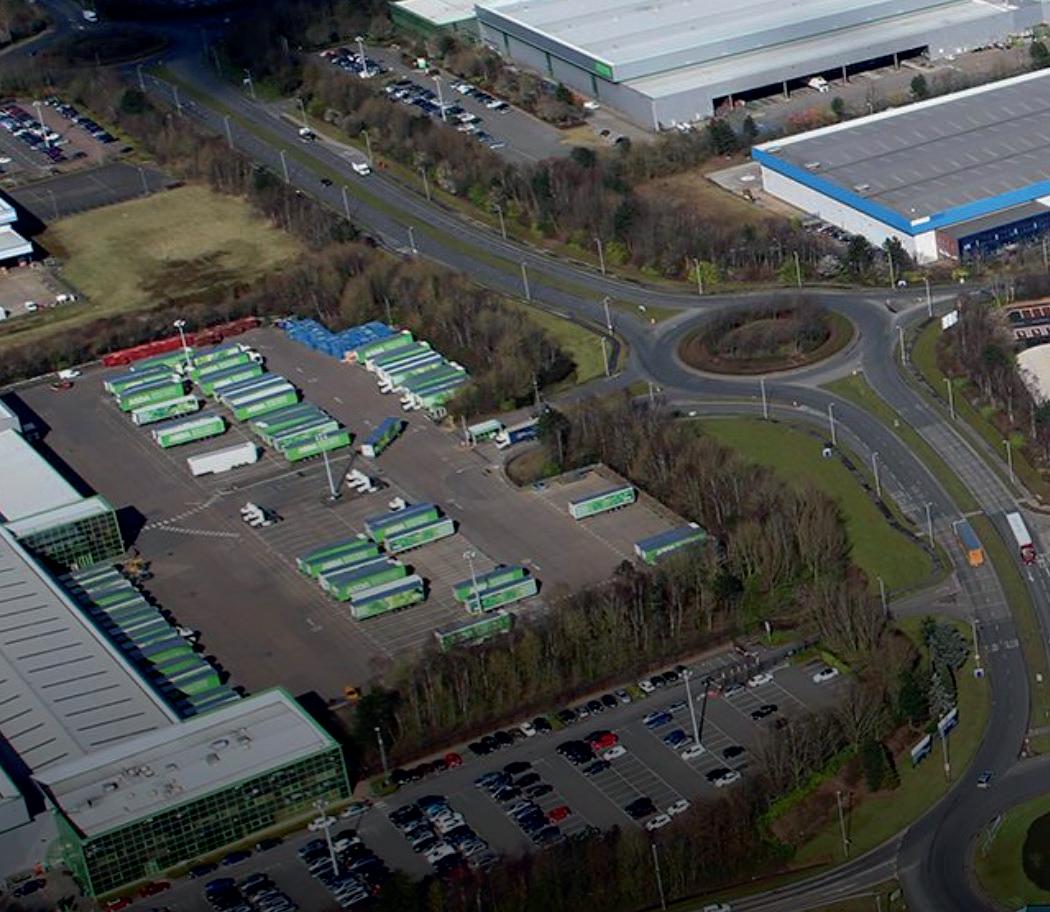
Demand continues to grow for warehousing, but more investment is needed for mid-box logistics
By Nicky Godding, Editor


A report published this summer by Logistics UK revealed that the sector generates phenomenal annual revenues of £1.3 trillion and contributes around £185 billion to the UK’s GVA performance.
These are seriously big figures but coming from one of the biggest business groups in the UK, which represents the road, rail, sea and air industries as well as the buyers of freight services such as retailers and manufacturers, they have to be taken seriously.
And supporting this behemoth industry is the warehousing sector. Every van, lorry and shipping container needs a warehouse into which it can disgorge its cargo. As a result, the number of big logistics parks being built at key nodal points across the UK transport network has grown exponentially.
The O ce of National Statistics confirms this. It says that the number of business premises used for transport, logistics and warehousing in the UK has doubled in the last decade.
It puts this down in some large part to supply change adjustments thanks to our exit from the EU, the onset of the coronavirus pandemic and the continuing rise in online shopping as a percentage of retail sales.
Many of the biggest sites are naturally located in the Midlands, home to the “golden logistics triangle”, but big logistics sites have proliferated further north and around the country’s key economic hubs.
And demand for suitable warehousing continues to rise.
Gilbert Harvey at Eddisons oversees the warehouse and logistics sector in the Midlands for Eddisons. He says that the demand for large logistics sites remains high in key locations.
“Magna Park at Lutterworth, on the M1
between Coventry and Kettering, is Europe’s largest logistics and distribution park thanks to its key location,” he said.
Magna Park is owned by GLP, the global developer and operator of logistics real estate, data centres and renewable energy projects.
Its Lutterworth site currently has more than 13 million sq ft of floor space and GLP is building two significant extensions: Magna Park North and Magna Park South.
Magna Park North has so far seen the speculative development of around one million sq ft of space across three units, all of which were leased ahead of completion. There remains a further two million sq ft to develop.
Magna Park South o ers 2.9 million sq ft of logistics space. The first phase saw the development of around 1.2 million sq ft of speculative development across four units. All units were leased ahead of completion to Amazon, JD.com, Whistl and Movianto.

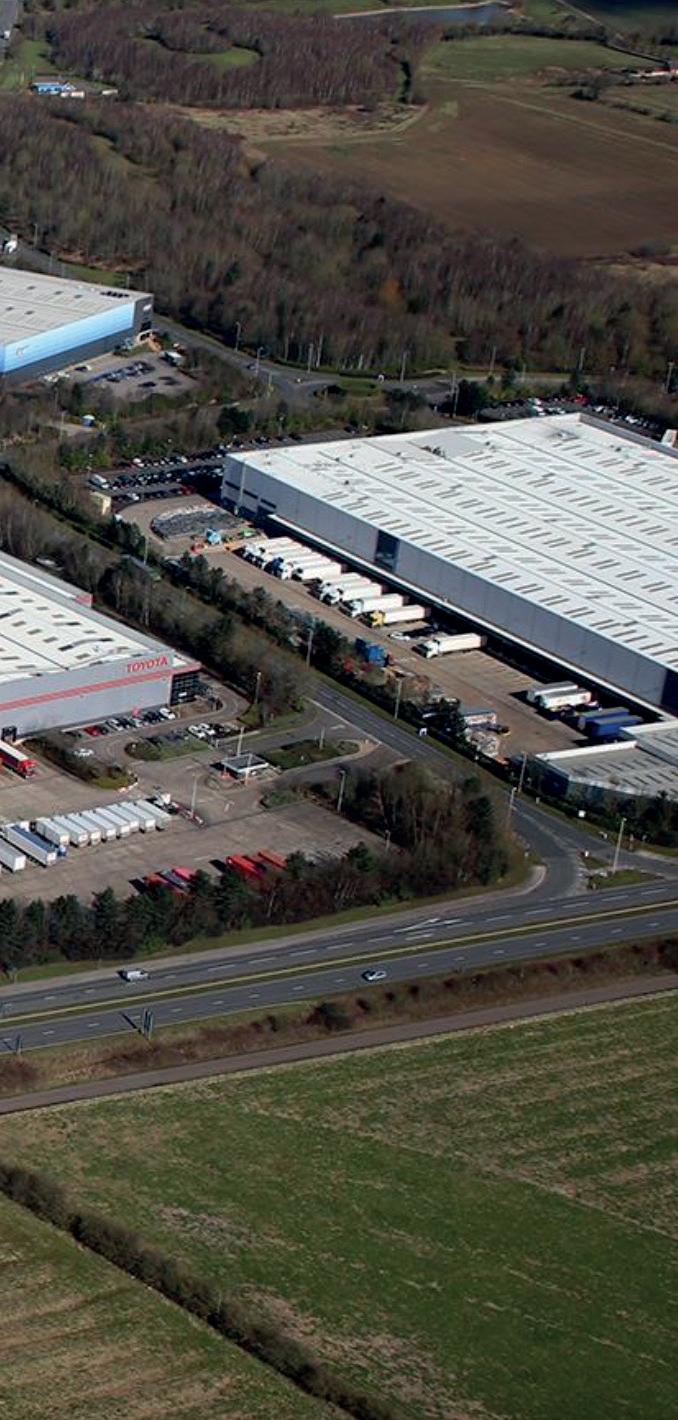
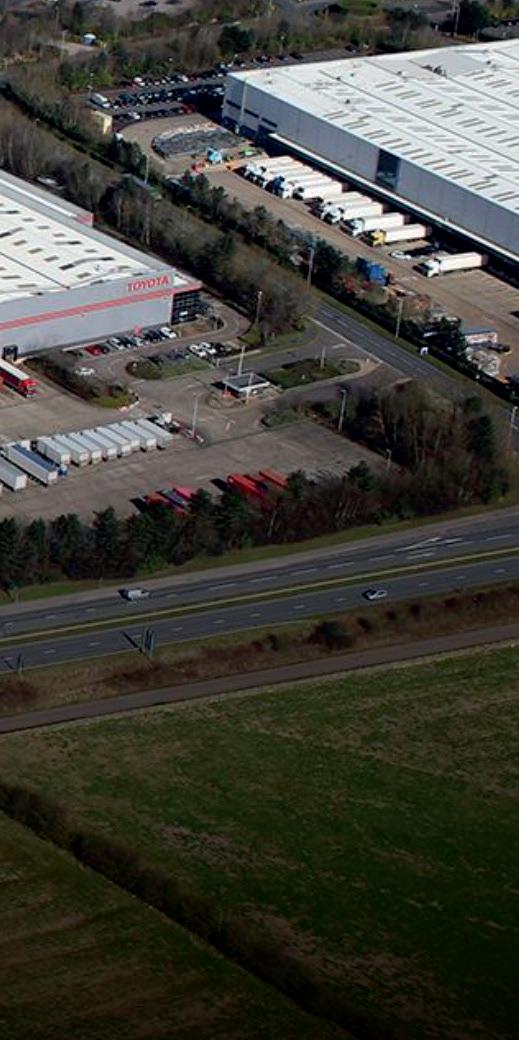
While there is strong demand from occupiers, such as logistics businesses looking for warehousing for last mile deliveries, such warehousing is more expensive to build ...


“With speculative development on such large and well-established sites on-going, supply is just about keeping up with demand,” said Gilbert.
However, where challenges remain is in the smaller, 20,0000-100,000 sq ft mid-box market.
“There is a shortage of commercial space of this size of warehousing,” Gilbert said.
“While there is strong demand from occupiers, such as logistics businesses looking for warehousing for last mile deliveries, this type of warehousing is more expensive to build, so many developers have concentrated on the larger sites. Here the build costs are likely to be lower, and they can achieve better yields than on smaller warehousing sites.”
Gilbert highlights another problem for this
sector of the market. Some of the smaller and and mid-sized sites which were built a few years ago are starting to age. Many already require redevelopment, or refurbishment and certainly investment in improving their energy performance, where the legal requirements were not as stringent as they are now.
And when occupiers will seldom commit to leases longer than five years, and often demand even more flexibility, developers are concerned that they won’t see a timely return on their investment.
“There are not enough small to mid-box developments being built to meet current demand,” said Gilbert.
And this will stifle economic growth, something that the UK Warehousing Association is concerned about.
Ahead of the October 30 budget it wrote to the Chancellor, Rachel Reeves, highlighting the compelling case for the government to support warehousing
and logistics businesses “by fostering a regulatory and fiscal framework that acknowledges our sector as a facilitator of trade and economic growth.”
However, across the UK’s commercial real estate sector there is hope that with the price of land stabilising somewhat after a turbulent few years, a commitment by the new government to put more planning o cers back into local councils to speed up the UK’s famously slow planning process, construction costs flattening and interest rates going down (which in turn drives yields up), the attractiveness of developing smaller sites could begin to rise.
“I have seen some smaller schemes which were put on hold because of these issues start up again, and that will all help,” added Gilbert.
Another positive (for the big box sites at any rate) is that Amazon has returned to the market and is looking for space in a bid to become more competitive with other online retailers.
Panattoni, the largest logistics real estate developer in the UK and Europe has begun speculatively developing 1.3 million sq ft of logistics space, which will include the UK’s largest-ever speculative logistics building, in Avonmouth, Bristol. There are rumours across the industry that this will be taken by Amazon.
The £280 million development, Panattoni Park Avonmouth, comprises two units of 406,000 sq ft and 882,000 sq ft. The larger of the two will be the UK’s largestever speculatively built warehouse. Both units are being built in one phase and are expected to be completed in September 2025. ISG has been appointed main contractor.
Across the commercial property sector, industrial and retail warehouse sectors are expected to continue to perform the strongest out of all asset classes over the next few years.


Bristol’s Bottle Yard Studios could go up for sale following councillors’ approval of the proposal to identify a purchaser of the long leasehold interest.
Based in Hengrove, The Bottle Yard is a leading film and TV studio facility and a cornerstone of Bristol’s UNESCO City of Film designation.
It’s seen steady growth and investment since it was established in 2010, which included expansion works in 2022.
During that time, Bristol has developed into one of the most filmed cities in the UK, and a partnership with the Bristol Film O ce has ensured that locations across the city regularly feature in primetime TV shows and feature films.
Latest figures from Bristol Film O ce show that film and TV production at The Bottle Yard and elsewhere in Bristol is now worth
more than £20 million a year to the city’s economy.
The studios are currently owned by the council which has invested in the site alongside the West of England Combined Authority and other organisations.
But changes in the TV and film production market and the ownership and investment models of local authority-owned studios elsewhere, councillors have agreed to identify a purchaser for the studios to maximise future investment opportunities.
Laura Aviles, head of film at Bristol City Council who oversees the studios, said: “There’s absolutely no doubt that the studios have had a transformative e ect on the film and TV industry in Bristol and the West.”
The Bottle Yard Studios is the largest film and TV studio in the West of England. A total of 11 stages are available for hire.
Christie & Co has been busy selling petrol forecourts this summer.
Two forecourts near Yate sold to expanding forecourt operator Niza Enterprises in a sale brokered by the commercial property agents. Just two days later it announced the sale of a Bristol forecourt near Ashton Gate Stadium to an established forecourt operator.
Charfield Service Station and Cotswold Service Station close to Yate have been sold to Niza Enterprises.
Both sites were supplied by Certas under the Gulf banner and the shops were independent. The new owners operate a group of convenience stores and small group of forecourts.
In the second deal, the Ambassador Service Station in Bristolhas been sold to Muresh Seevaratnam, an established forecourt operator, who also acquired the nearby Backwell Service station in April.
Since acquiring Backwell, Muresh has expanded and converted the shop into a Welcome Co-Op, supplied by the Southern Co-Op and has already seen shop sales improve substantially.
This was the second forecourt sale Christie & Co brokered in Bristol during July, following a run of eight completions in the Midlands and South West since the start of June.
Dave Morris Regional Director for Christie & Co, said: “It’s been a very busy time for the Midlands and South West forecourt team, particularly in June and July.
“Freehold and leasehold forecourts remain popular, particularly in the South West. Location is key and forecourts with untapped potential are in particularly high demand.”







The consolidation and refinancing were orchestrated and managed by Chris Parsons, new Managing Director of Tetra Real Estate and Waterloo Capital.
He said: “By consolidating and refinancing our portfolio we can accelerate our growth plans following the reorganisation.
“It’s an important next step, which points to a strong outlook, but reflects the foundations which have been put in place by my predecessors, most recently, James Davies and the Wigley team.”
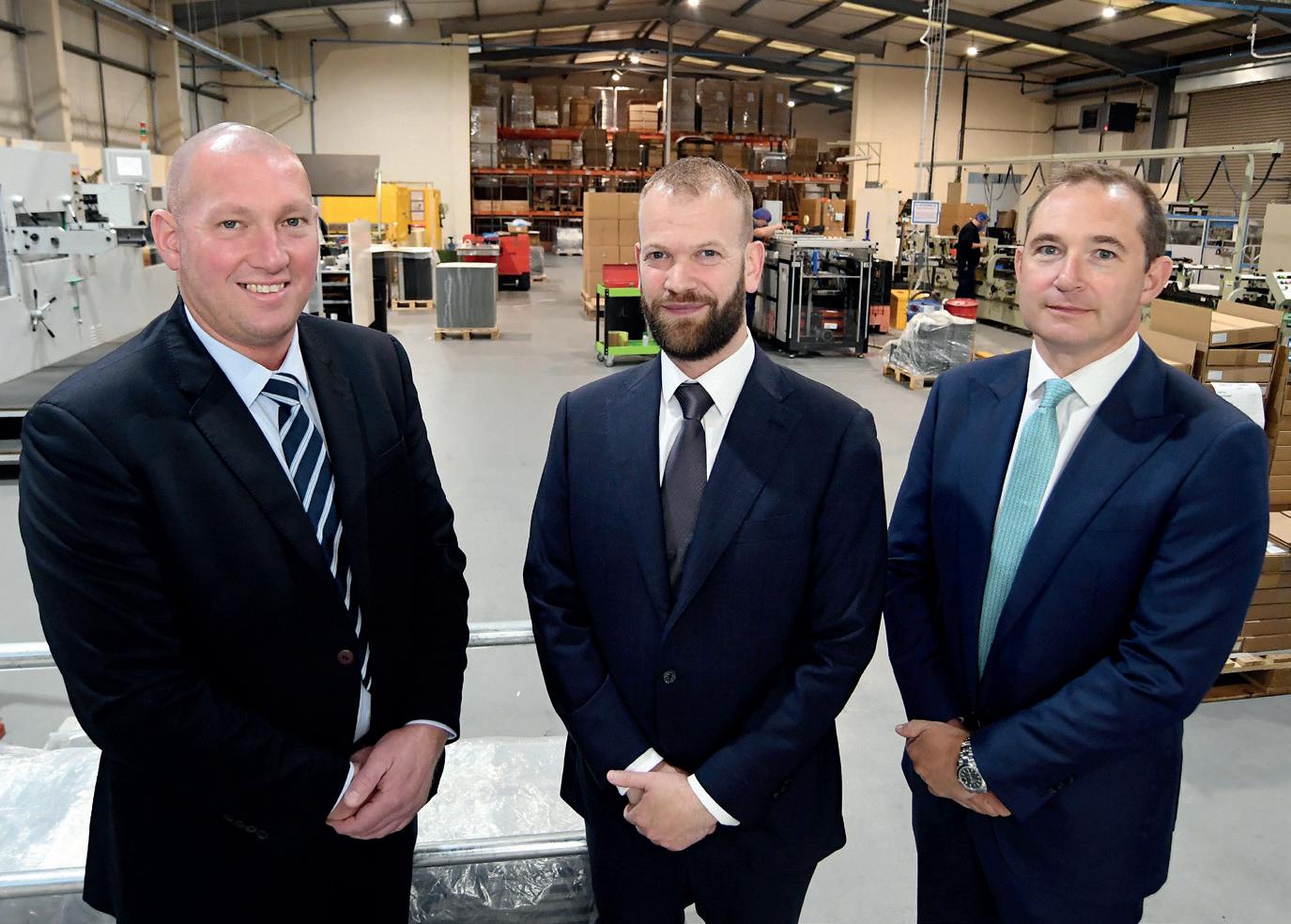


A Warwickshire property firm has consolidated and refinanced its portfolio in a deal worth £17 million.
Tetra Real Estate Limited (formerly the main portfolio of The Wigley Group), based in Stockton in Warwickshire, has consolidated assets from its sister company Waterloo Capital Limited and refinanced the portfolio with NatWest.
Coming three months after Tetra Real


Estate and Waterloo Capital were created as part of the reorganisation of The Wigley Group, the deal brings Tetra Real Estate’s portfolio to more than £60 million and unlocks additional capital for growth.
Alongside Tetra Real Estate, the restructure formed holding company Wigley Investment Holdings Limited as part of a reorganisation of the Group’s businesses and family assets.
The deal consolidates a portfolio of commercial properties including industrial units at Endemere Road, Coventry, Nuneaton’s Bermuda Industrial Estate and The Quadrant Industrial Estate.
James Davies, Chief Executive O cer of Wigley Investment Holdings, who oversaw and delivered the reorganisation of The Wigley Group, said: “Consolidating and refinancing our portfolio will enable future growth within the Tetra Real Estate business. We see a strong 2025 in terms of increasing our portfolio and we need to be fully prepared to react to the market.”
NatWest supported the reorganisation of the Wigley family’s assets.
Independent energy developer Balance Power has secured planning approval for its 99MW/99MWh battery storage project in Iron Acton, South Gloucestershire.
The project is expected to play a critical role in storing renewable energy during peak production times and supplying it back to the grid when demand is high. This will help to stabilise the grid and power approximately 26,700 homes.
Comprising 19 battery units and spanning 2.3 hectares, the Iron Acton facility will
help reduce CO2 emissions by about 18,300 tonnes annually, equivalent to taking 13,000 cars o the road.
Oliver Pettersen, Connections Manager at Balance Power, said: “Securing planning permission for Iron Acton is a significant milestone and is set to make a sizeable impact on local clean energy reliability.
“With extensive solar development in the Iron Acton area, this project will be pivotal for managing excess power generation
and for balancing out the supply and demand of renewable energy, helping to reduce dependency on fossil fuels.
“Due to the size and scale of the project, it also marks a big step forward for the UK’s transition to net zero, which depends on battery storage projects that provide stability for a decarbonised grid.
We’re grateful for the support from South Gloucestershire and the community – it’s due to our collective e orts and close collaboration that we’ve reached this brilliant outcome.”























70% of 18-34 year olds said a refurbished office would draw them back to the workplace, yet only 9% of leaders have acted – so where can they start?*
Step one, talk to us. When you work with us, we make you a promise – to deliver your office fit out with no fuss. We look after everything through your design-and-build journey, so you can relax knowing our team is by your side. Our parallel working approach means we look after different stages of your project in tandem – reducing handover and downtime between milestones. We can even bring your designs to life through renders and 3D walkthroughs, so you can be confident with your new space before we begin.
Our designers are known for their innovative and inspirational designs that exceed expectations and encourage staff back into the office. Our attention to detail, focus on diversity, equity and inclusion (DEI) and ability to understand and interpret your unique requirements set us apart. Our work is award winning, with Sage’s new Winnersh Triangle workplace taking home Regional Winner in this year’s SBID International Design Awards.
At Morgan Lovell, we pride ourselves on delivering exactly what we promise. Our reputation for completing projects both on time and within budget means you can trust us to meet your expectations every step of the way. With us, you’ll enjoy peace of mind, knowing your project will be finished to the highest standards. This level of reliability and professionalism is key to ensuring a smooth and successful project from start to finish.
Additionally, we prioritise social value and sustainability in every fit out project we undertake. With our innovative carbon counting tool, Carbonica, we can accurately measure and minimise the environmental impact of your project. Our dedicated environmental team is ready to assist you in reaching your sustainability goals, whether that includes certifying your project with BREEAM, LEED, SKA or NABERS. By focusing on sustainability, we contribute to a healthier planet while ensuring your project adheres to the highest environmental
standards, enhancing your corporate social responsibility and reducing operational costs.
Don’t just take our word for it – here’s what our clients say:
"Working with Morgan Lovell was a seamless and enjoyable journey. It's also the first time I have ever had the client say that he loved the first design and didn't want to make any changes. You clearly captured the brief perfectly." Oliver Lewis, Project Manager, CBRE.
"We felt like we needed someone we could trust, and Morgan Lovell brought that. Working with the team was great." - Lee Bartram, Head of Marketing & Cultural Influence, Gibson.
Morgan Lovell is the UK’s leading office interior design and fit out specialist. Established in 1977, based in London and the South of England, we work with a wide range of clients, including businesses of all sizes, from startups to large corporations.
*Survey: Refurbishing with Purpose: What leaders want versus the employee view, Morgan Lovell.









What makes a great commercial space?
With more organisations wanting their sta back in the o ce, colleges competing for students and leisure destinations
determined to attract more visitors, increasing numbers are investing heavily in making their workplaces, venues and educational spaces more attractive,
The Bath Abbey project won two RIBA South West and Wessex Awards this year, as well as a RIBA National Award.
The objective of the project was to improve the experience for worshippers, visitors and performers. And it was ambitious.
if not positively home-from-home. We’ve scoured the region to find some of the most exciting recent projects which are already encouraging us out and about.

As well as repairing and remodelling the Abbey’s interior, it involved creating new learning and music spaces beneath the pedestrian pavements of Kingston Parade. A team led by architects Feilden Clegg Bradley Studios spent 12 years surveying, planning and implementing the complex project.


Interdisciplinary Biomedical Research Building, The University of Warwick
This 7,000 sq m building at the University of Warwick houses two primary research functions with markedly di erent requirements: wet labs and write up, seminar and other research space. It won a 2024 RIBA West Midlands Award.


One of the more memorable projects undertaken by Bath-based production design and innovation company Matter Studios, was redesigning The Royal British Legion’s iconic poppy to remove all plastic, making it 100 per cent paper and recyclable.
Creative ideas need an inspiring facility capable of helping to bring ideas to life, so Matter invited Stonewood Design to undertake a redesign and fit-out of their historic premises in Bath.



C&C Group, a leading drinks manufacturer and distributor, aimed to consolidate their o ce space following a recent merger. The chosen site, a historic Grade 2 listed building in Bristol now has an o ce design that makes the most of its architectural hallmarks.
Ideally located close to Birmingham Airport and the NEC, Ingenuity House’s stepped design o ers self-shading for a more sustainable building. It also has terraces and collaboration areas arranged around the atrium, as well as a central cafe and restaurant hub.




Images were released this summer of progress at the £107 million development in Gloucester city centre, the striking red facades and progress on site ahead of completion later this year.
Driven by Gloucester City Council, in partnership with developer Reef Group, the new development will o er o ces, residential, retail space, restaurants and a Hotel Indigo with rooftop bar.

... The building as it emerges



A pretty Georgian townhouse at the front, the rear has been transformed into a gorgeous co-working space which opened this summer.


After undergoing a £12 million refurbishment, Blok, next to Castle Park, o ers 70,000 sq ft of workspace and lots of amenity space including communal lounge, meeting rooms, co ee shop, courtyard garden, roof terrace and gym.



Improve International, Swindon
Improve Veterinary Education (part of the Improve International Group) o ers veterinary postgraduate training and education. It has transformed its
Swindon o ce space to o er technical and educational areas such as wet labs and an X-ray room, with a large informal breakout space.
Opened this autumn, Gloucestershire College’s new construction school is an inspiring learning environment and the college lecturers even got stuck in to make the wooden workbenches themselves.
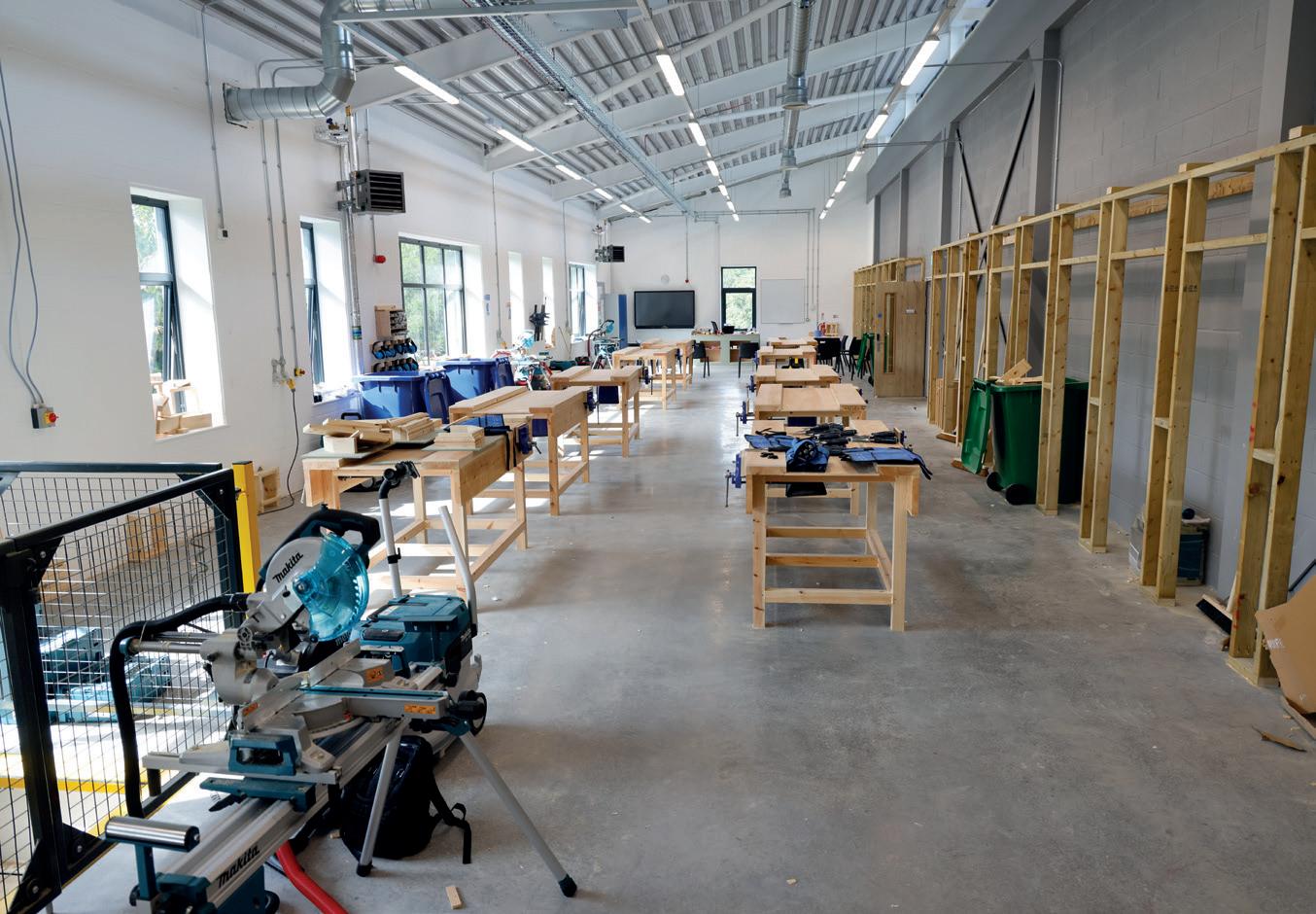


South East edition: Oxfordshire & Thames Valley Berkshire & Buckinghamshire Surrey, Kent & Sussex Solent & South Coast
South West & West Midlands edition: Bristol & Bath, Gloucestershire, Worcestershire & Hereford, Coventry & Warwickshire, Swindon & North Wiltshire
The region’s most influential B2B magazine, in print and online for news, features, interviews and business sector analysis.
2025 Print issues will be published in January, March, May, July, September and November
JANUARY 2025
Contact us
Managing Director Richard Thompson richard.thompson@thebusinessmagazine.co.uk
Managing Editor Stephen Emerson stephen.emerson@thebusinessmagazine.co.uk
Operations Director Jo Whittle jo.whittle@thebusinessmagazine.co.uk
Visit our magazine online thebusinessmagazine.co.uk
Follow us: @TheBusinessMag linkedin.com/company/the-business-magazine
Magazine Design: Origin Creative I www.origin-creative.com
Magazine Printers: The Manson Group I www.mansongroup.co.uk
Editorial
Print Editor Nicky Godding nicky.godding@thebusinessmagazine.co.uk
Senior Reporter Daniel Face daniel.face@thebusinessmagazine.co.uk
Contributing Writer Ian Mean, Director Business West
Research & Rankings
Researcher Laura Clarke laura.clarke@thebusinessmagazine.co.uk
Events
Events Executive Lauren McCarron lauren.mccarron@thebusinessmagazine.co.uk
Events Assistant Katie Jackson katie.jackson@thebusinessmagazine.co.uk
Marketing
Digital Marketing Scott Whittle scott.whittle@thebusinessmagazine.co.uk
Commercial
Head of Client Relations Peter Laurie Thames Valley peter.laurie@thebusinessmagazine.co.uk
Business Manager Alan Lindstrom South Coast alan.lindstrom@thebusinessmagazine.co.uk
Business Development Owen Thomas Manager South West owen.thomas@thebusinessmagazine.co.uk & West Midlands
Production Manager Steve Banbury steve.banbury@thebusinessmagazine.co.uk
Events events@thebusinessmagazine.co.uk
Accounts finance@thebusinessmagazine.co.uk
General Enquiries editorial@thebusinessmagazine.co.uk
Publisher: The Business Magazine Group Ltd – Company number 13202910
Registered O ce: 24 Bell lane, Blackwater, Camberley, Surrey, GU17 0NW


